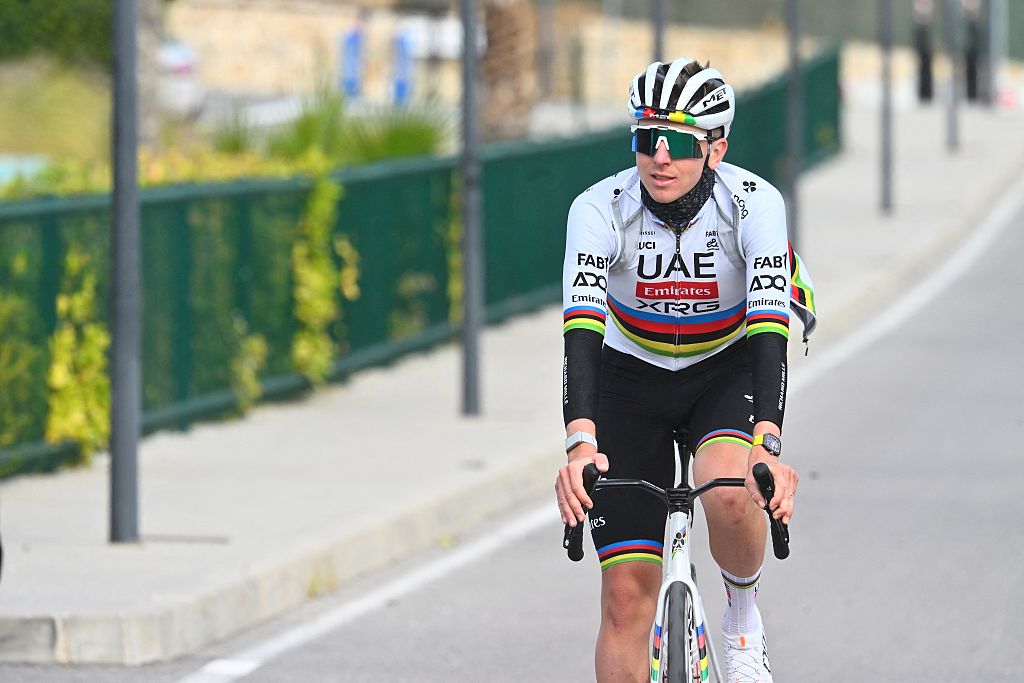Best cycling glasses: They're more than just sun protection
18 of the best cycling sunglasses for all conditions to keep you protected and looking stylish too
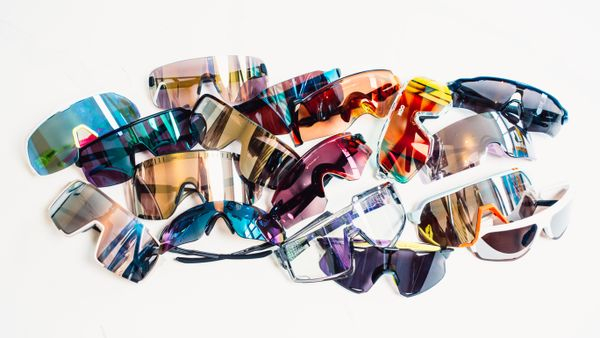
The latest race content, interviews, features, reviews and expert buying guides, direct to your inbox!
You are now subscribed
Your newsletter sign-up was successful
A pair of the best cycling glasses isn't just about looking good, they offer protection too. They might not increase performance as directly as deep-section wheels or an aero helmet, but they do shield your eyes from grit, wind, and insects, reduce glare, and enhance contrast on dull days to help you see more clearly.
In the last few years, I've tested out well over 60 pairs of cycling glasses. In addition to this guide, I've also created a partner page featuring the best affordable cycling glasses, as you can now find some truly excellent pairs for a relatively small investment if you know where to look. In this latest iteration, a few pairs have been replaced by better models as I try more and more pairs out.
For years, Oakley has been the big name in sports eyewear. While I've also put together a dedicated guide to Oakley cycling glasses, there are plenty of amazing options beyond the big O. If you need vision correction, I've also put together another guide to the best prescription cycling glasses, as there are a good few options out there.
Each pair has been assessed for fit, build quality, wind and sun protection, and particularly important to me is how they perform in low light. I've also got a solid collection of the best road helmets in the cupboard, so how they fit into vents is also tested. While my standout favourite remains the Oakley Encoder with a Prizm Road lens, there are plenty of options that I regularly rotate through depending on the conditions.
If you're not sure of what to look for or get confused by all the acronyms and lens types, worry not, there is a How to choose and FAQ section at the bottom of the page to help guide you.
Quick list: Best cycling glasses
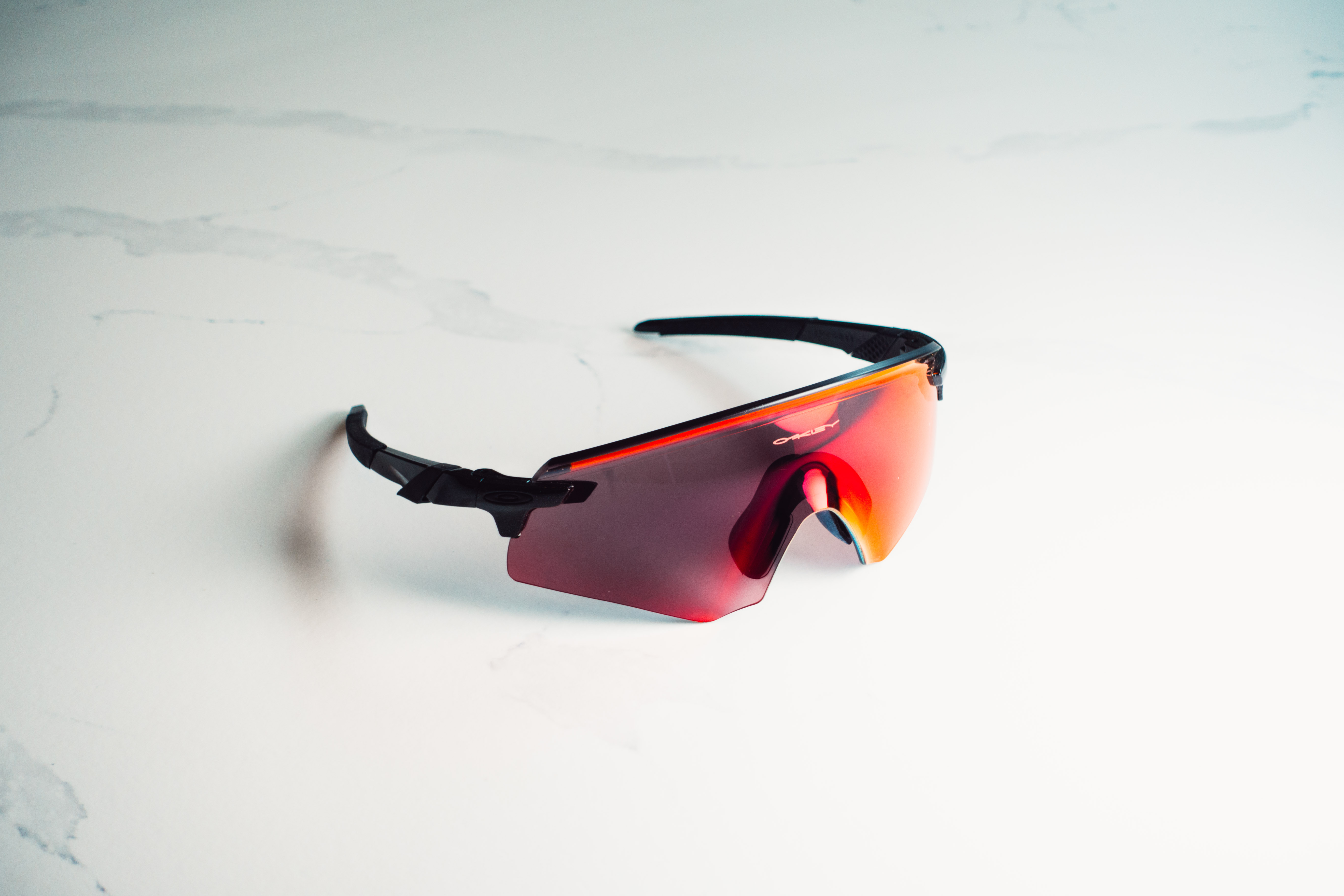
The Prizm Road lens is sensational even in low light, and the shape provides excellent coverage without being overly large for small heads. The ridge on the top also makes them stiffer and more grippy than any other frameless pair I've tried. If I had to keep one pair, it'd be these.
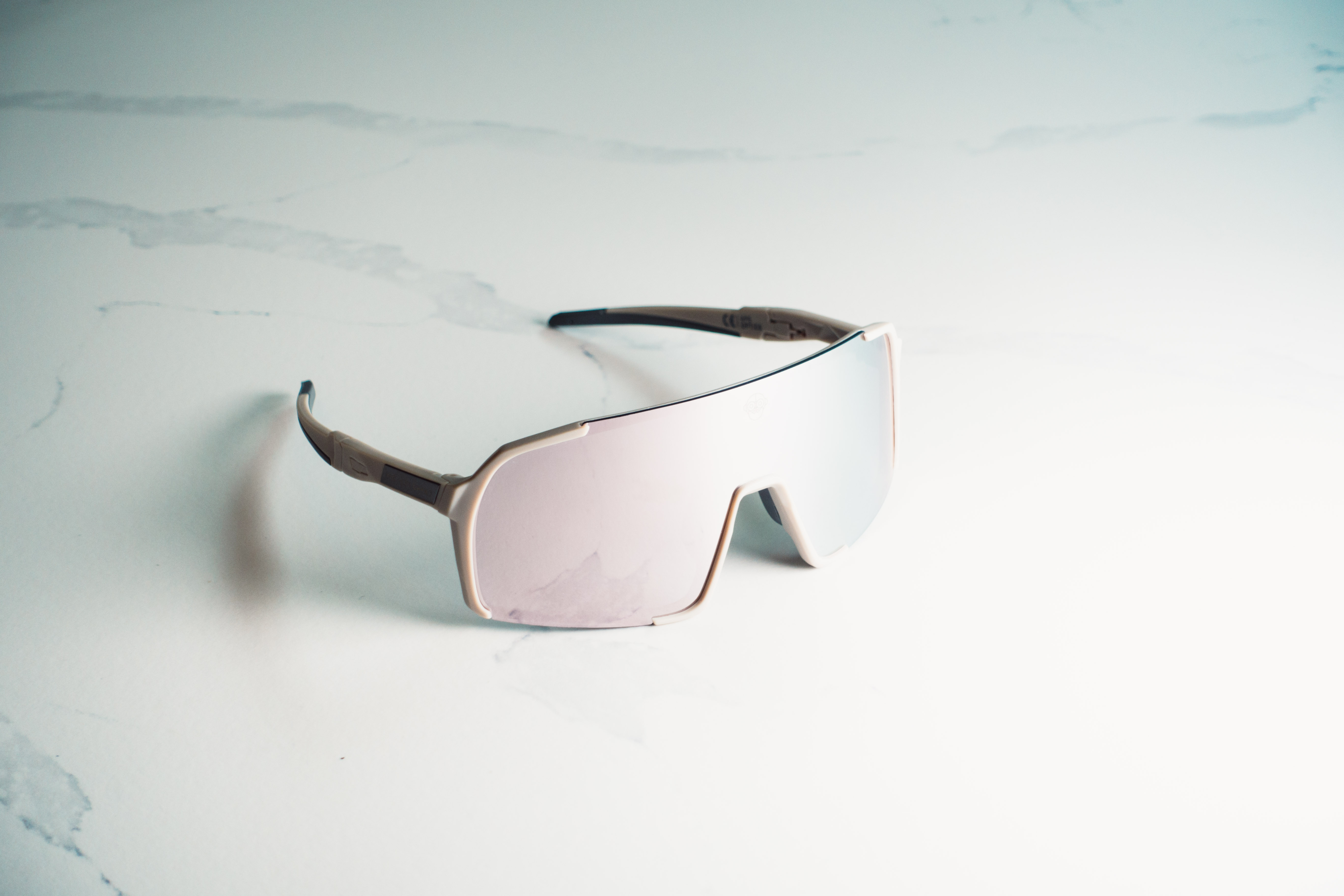
A genuinely decent set of shades for a low price with a ton of extras. In the box, you also get a clear lens, a photochromic one, and a polarised one, as well as a prescription lens insert if you need vision correction. The best bang for your buck of the lot.
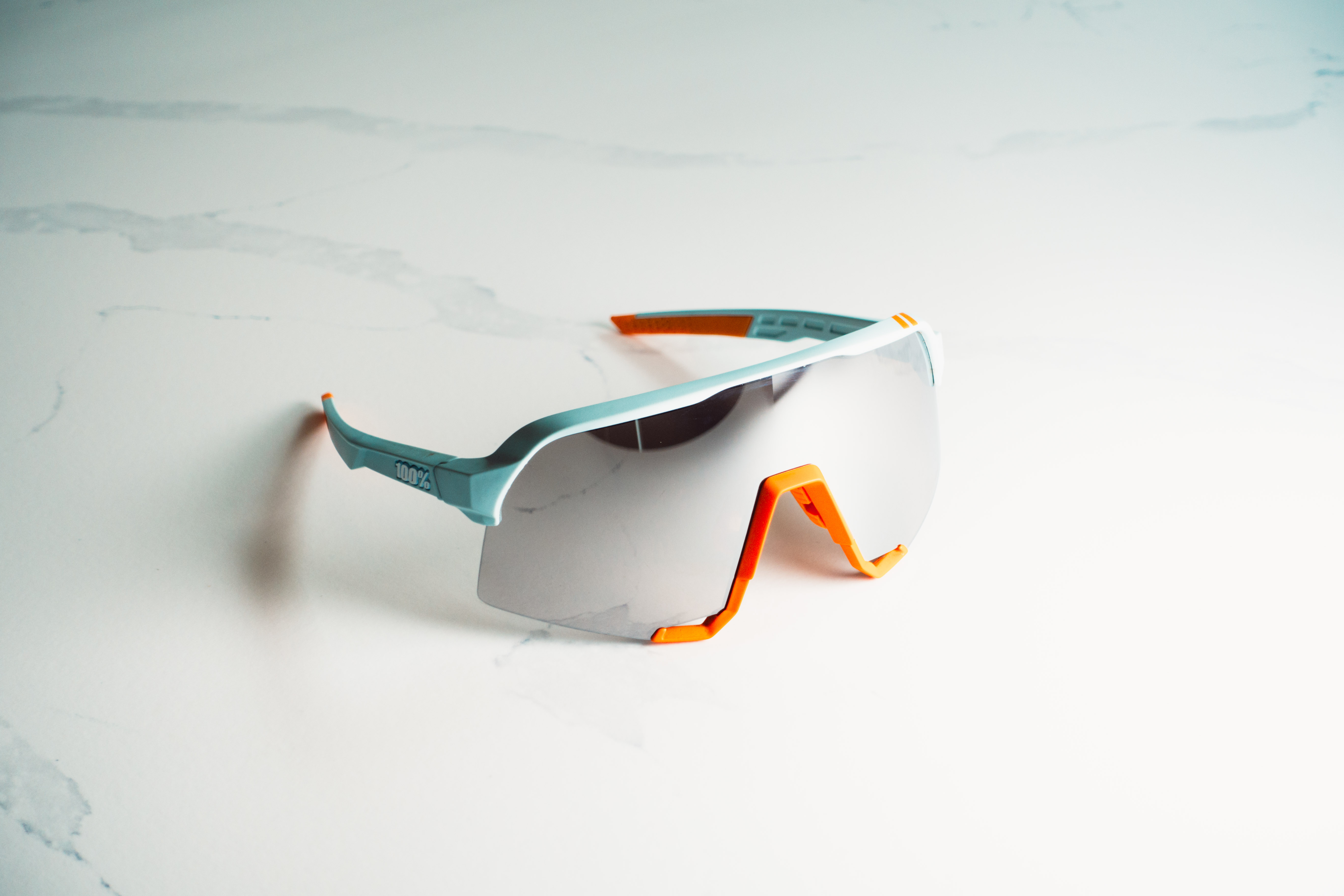
While the Encoder is good, when it's dark, it is of no use, as you can't swap the lenses. Enter the 100% S3; The HiPER lenses are great, and the lens size is huge, but the inclusion of a clear lens makes these my top pick if you ride outside all year round and still want to stay protected.
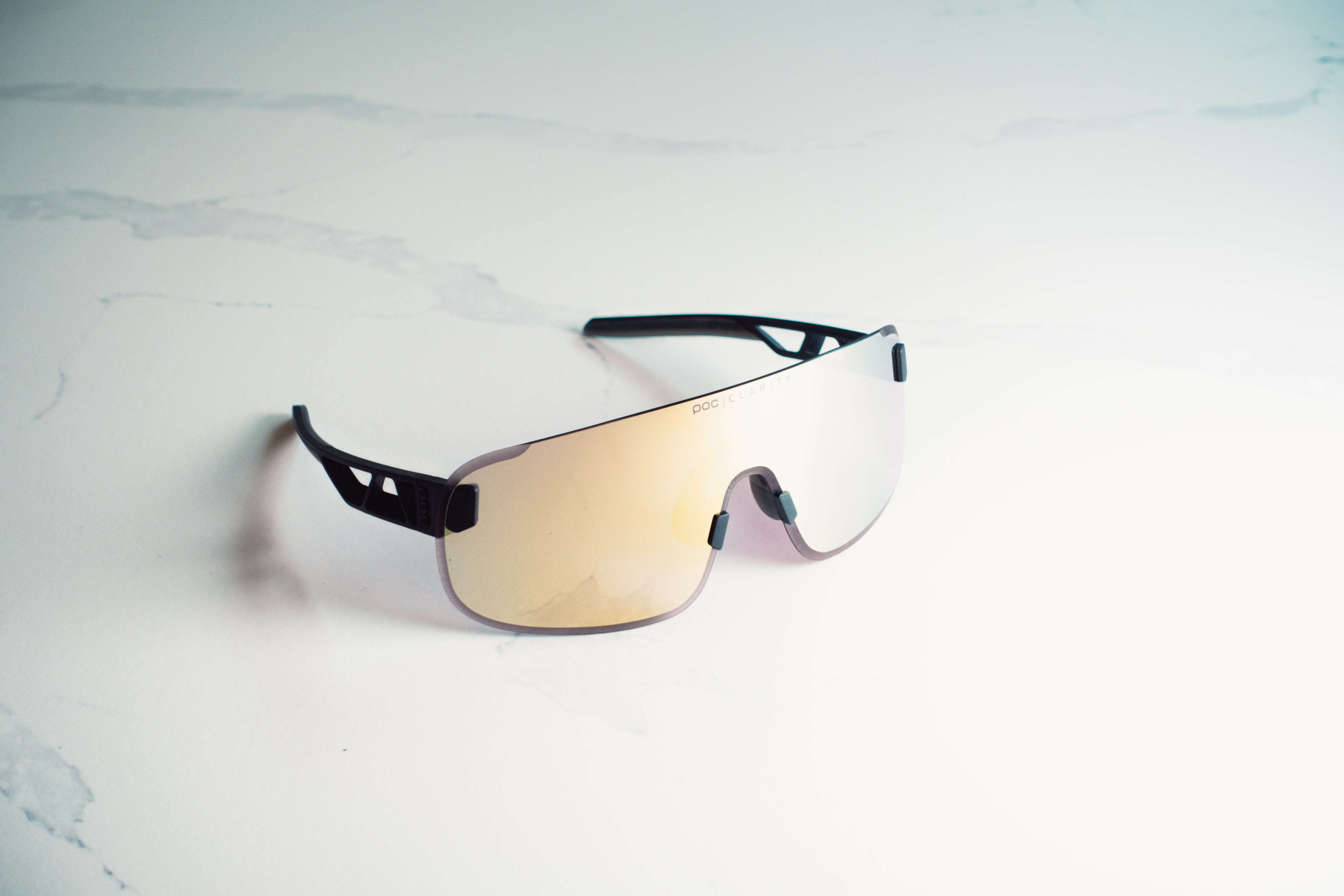
If you like things featherweight, then the POC Elicit should be your choice. The low weight and large, organically shaped frameless lens mean you'll forget you're even wearing cycling glasses at all. If you've got a very small head though, they may not grip so well.
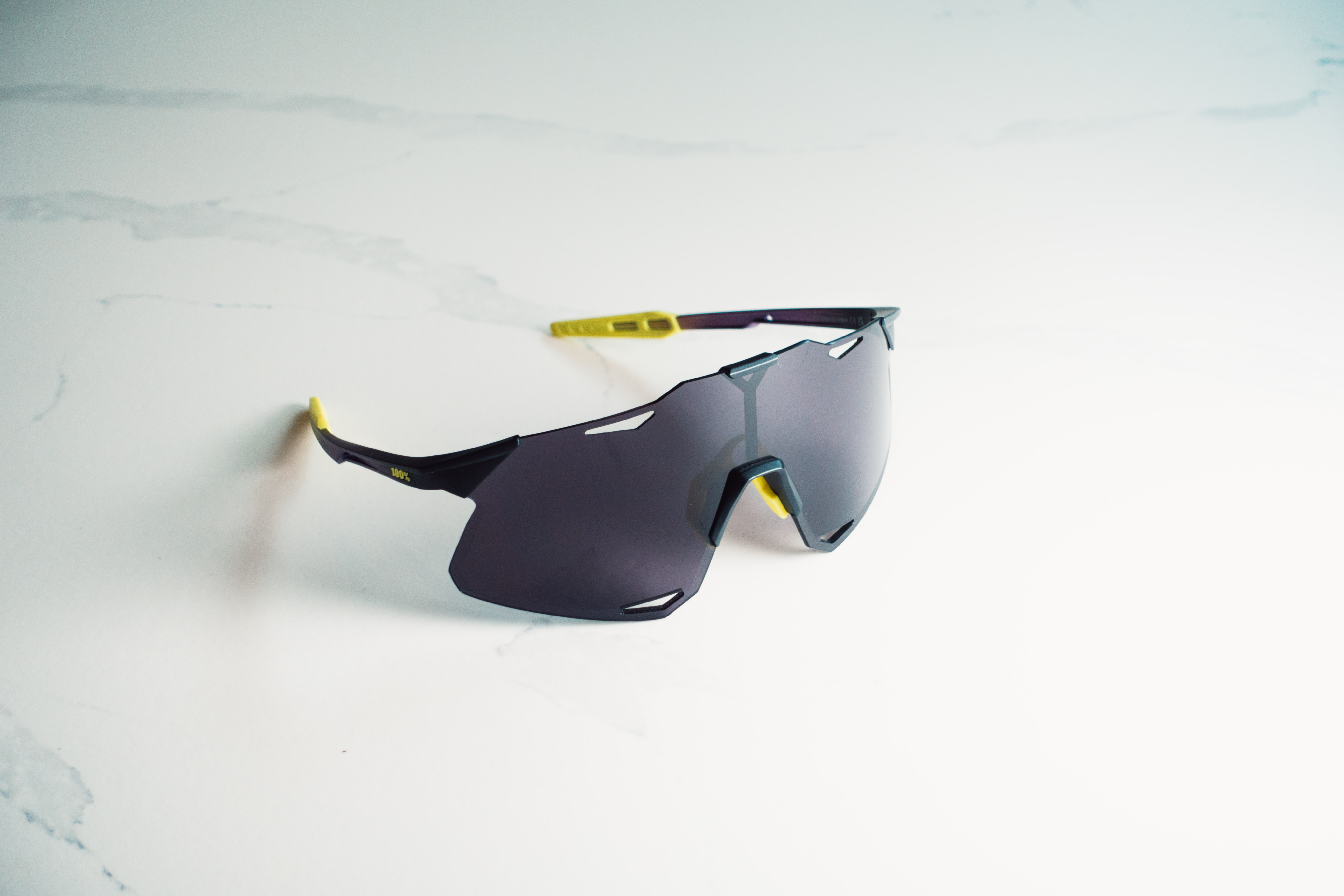
Another lightweight, the 100% Hypercraft is what I reach for when it's really hot and humid. The weight is similar to the POC Elicit, and while they aren't quite so comfy, the lenses allow greater airflow behind the lenses, which is always welcome on protracted climbs.
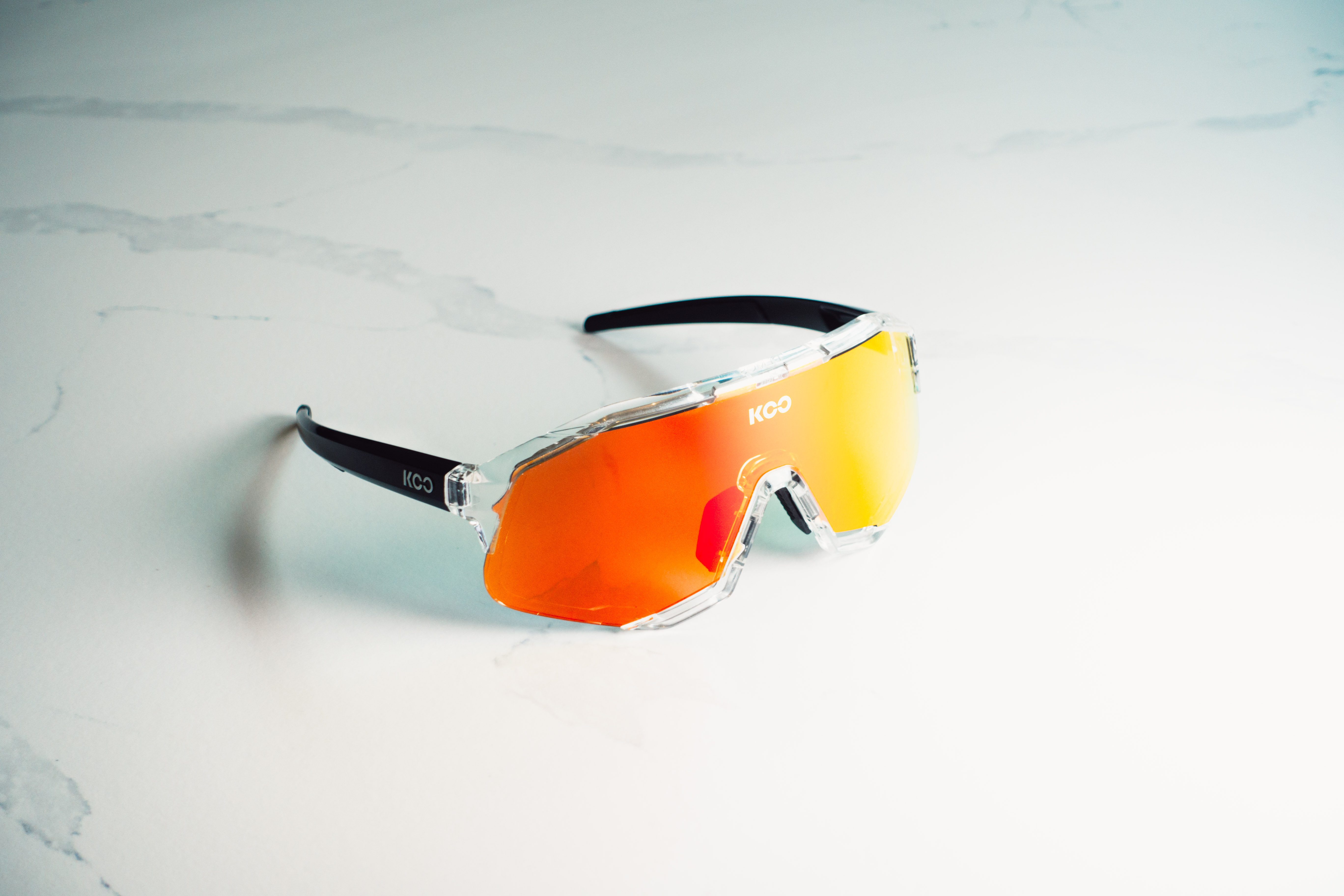
Like the Encoder, the Demos from Koo is a pair of cycling glasses that do everything really well, rather than excelling in one area. The Zeiss lenses are great, the build quality is fantastic, and they're just the right size for most people; a worthy honourable mention.
Last updated on 13th of November 2025
We have reviewed more sunglasses since this guide was originally written, so we have swapped out some products for new, better options. All existing products have also been checked to ensure that they are still current and available. A how to choose section has also been added to help readers choose the best cycling glasses.
Best cycling glasses available today
You can trust Cyclingnews
Best all-purpose cycling glasses
The cycling glasses below are my picks for jack-of-all-trades riding. They'll stand you in good stead for road or gravel, and I'd wager MTB too, though that's not my area of expertise.
They all fit well, provide an excellent field of vision, and consequently protect you well from both wind and debris. They are mostly at the higher end of the price bracket, but for the extra outlay, you'll get better materials and lenses that perform better in low light and are free from distortion.
As modern lenses improve and can cover nearly all light conditions, many manufacturers are opting to revert back to a single lens option, rather than a swappable set.

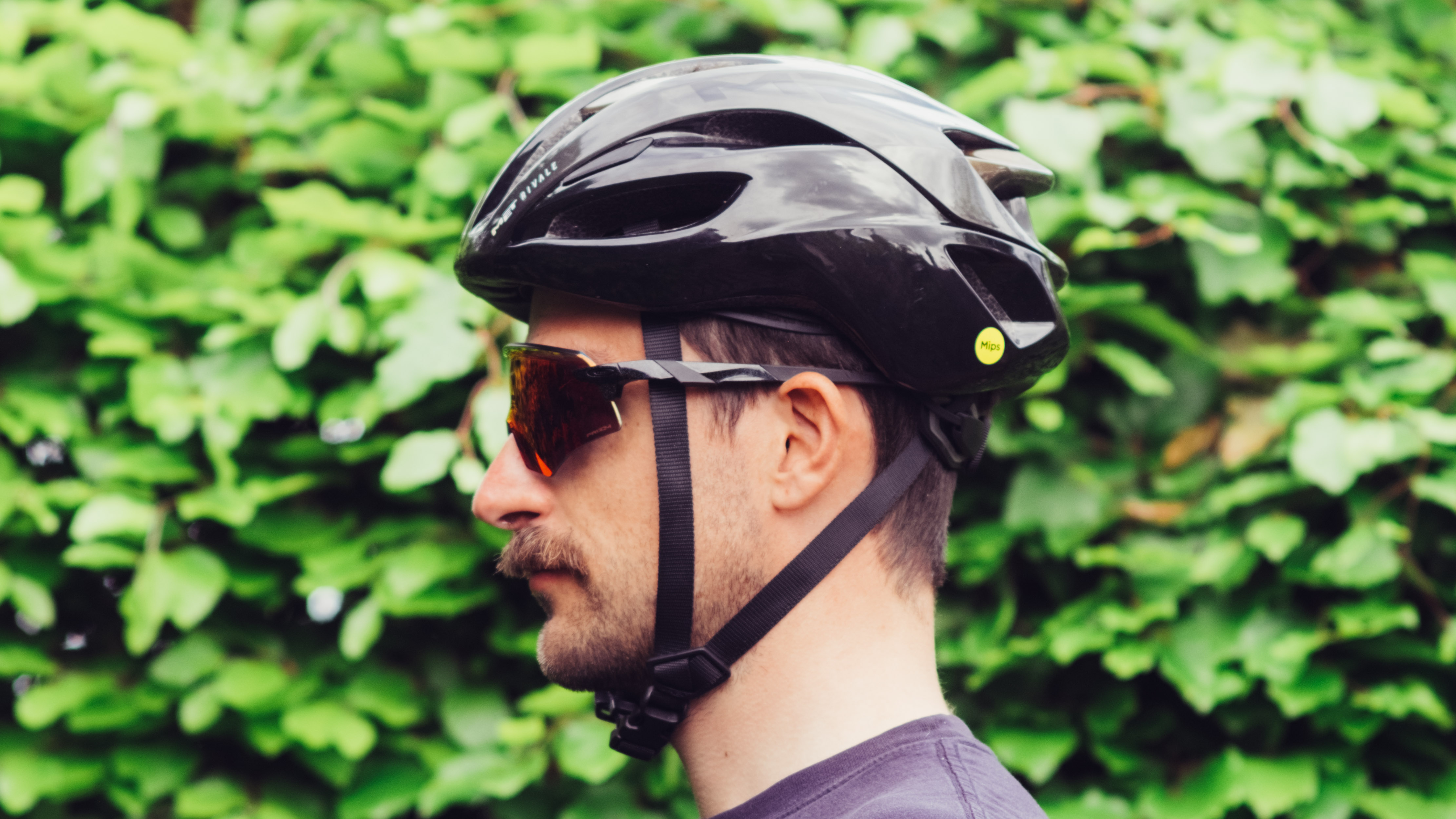

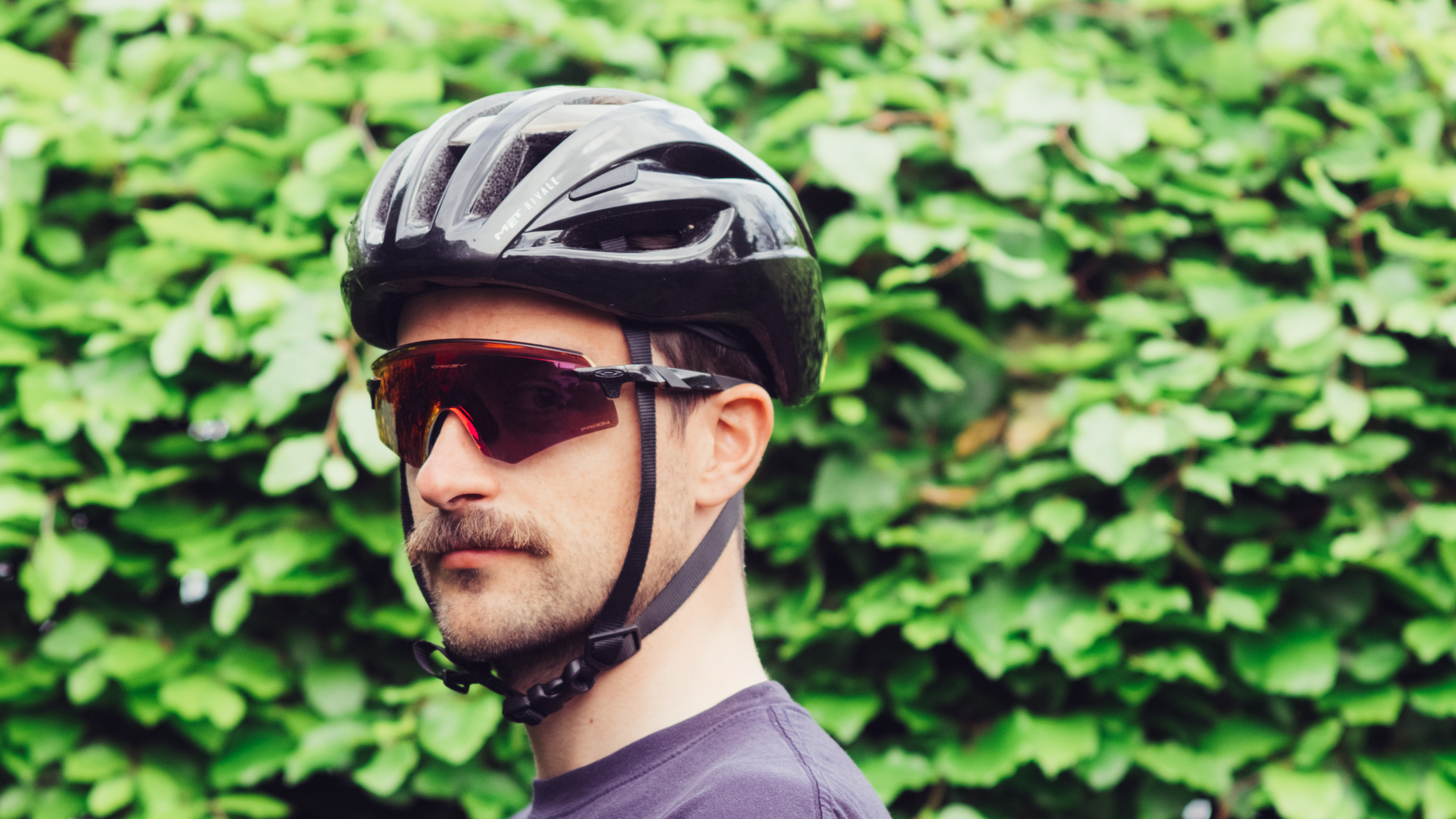
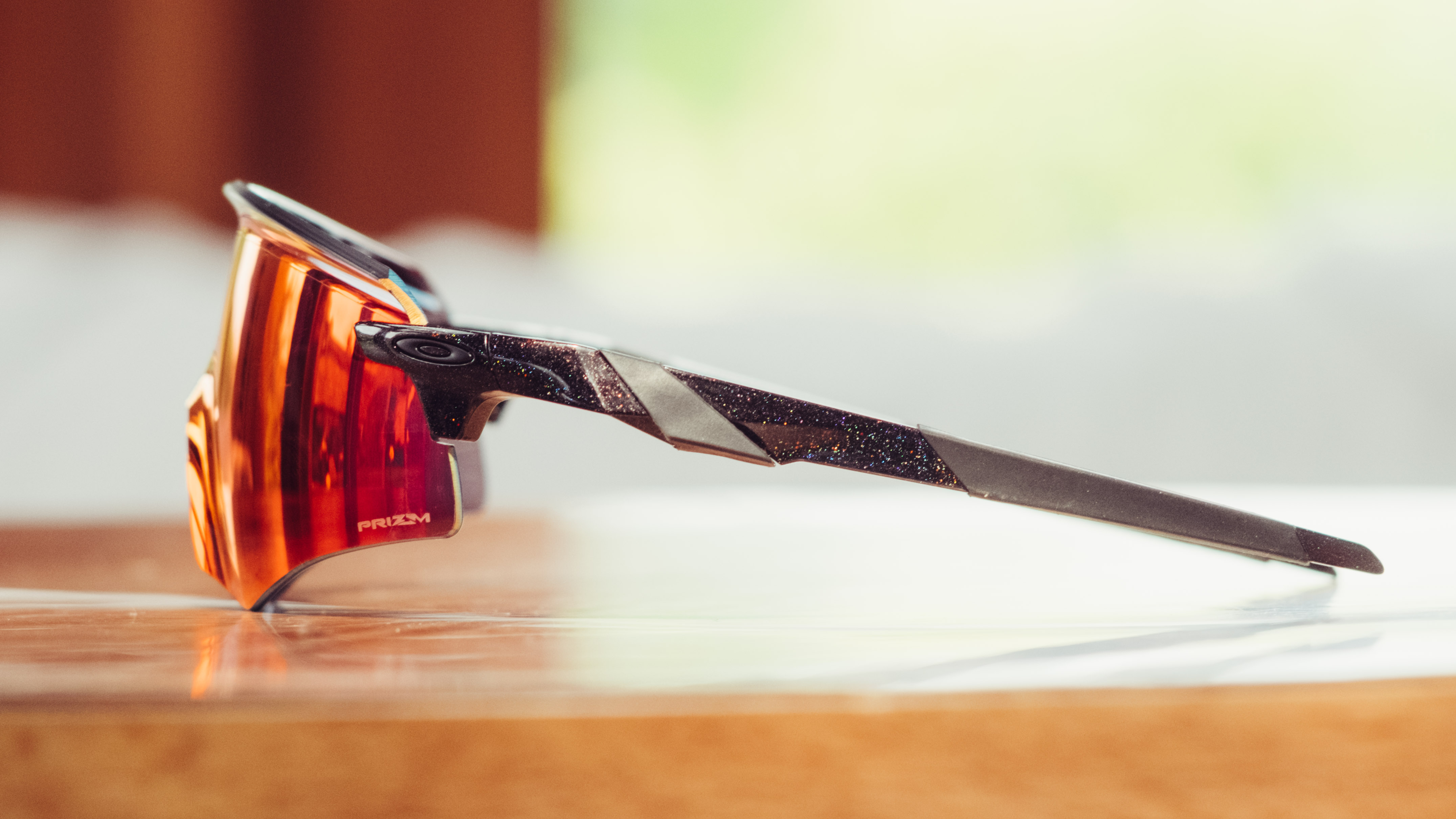
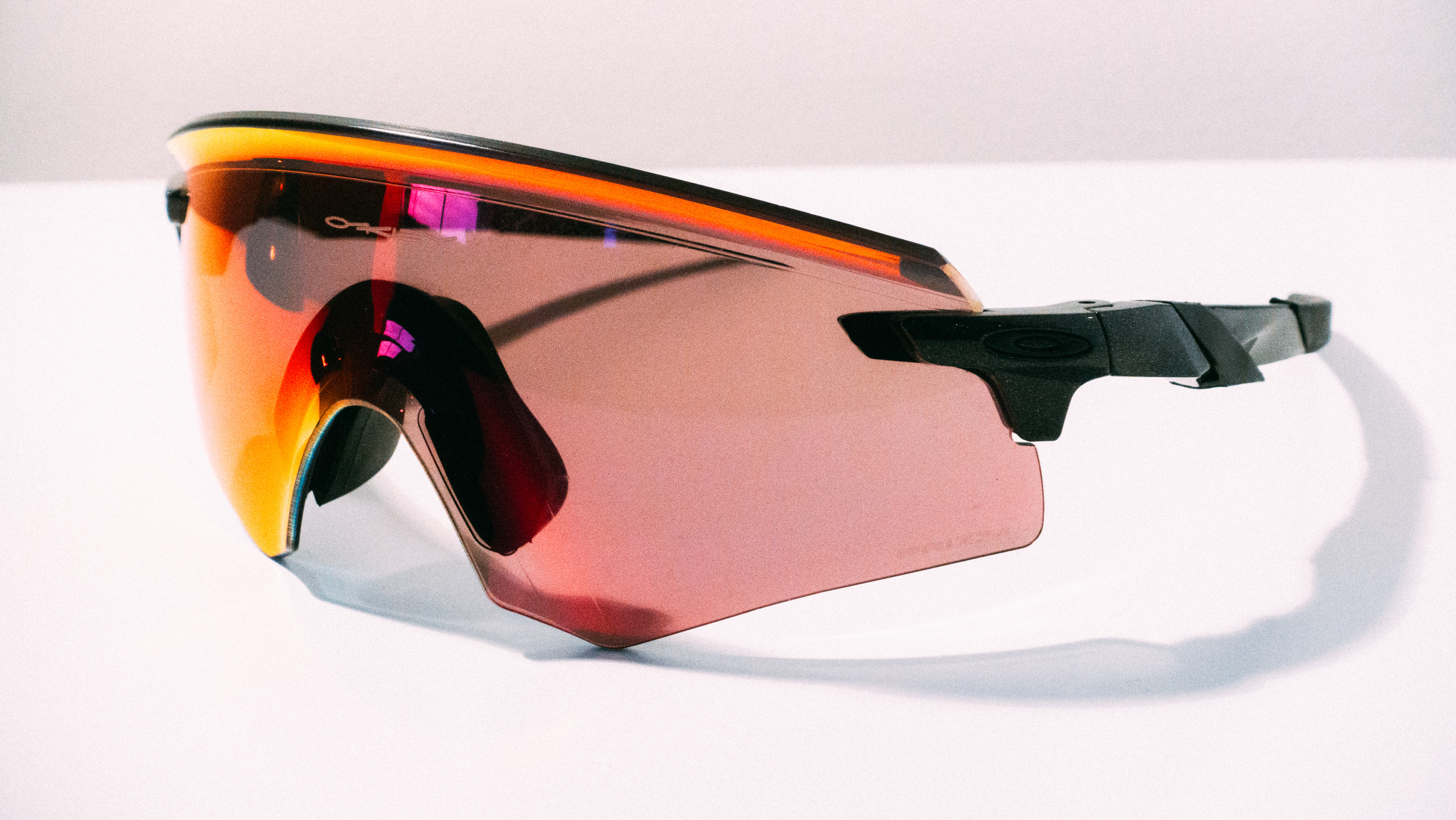
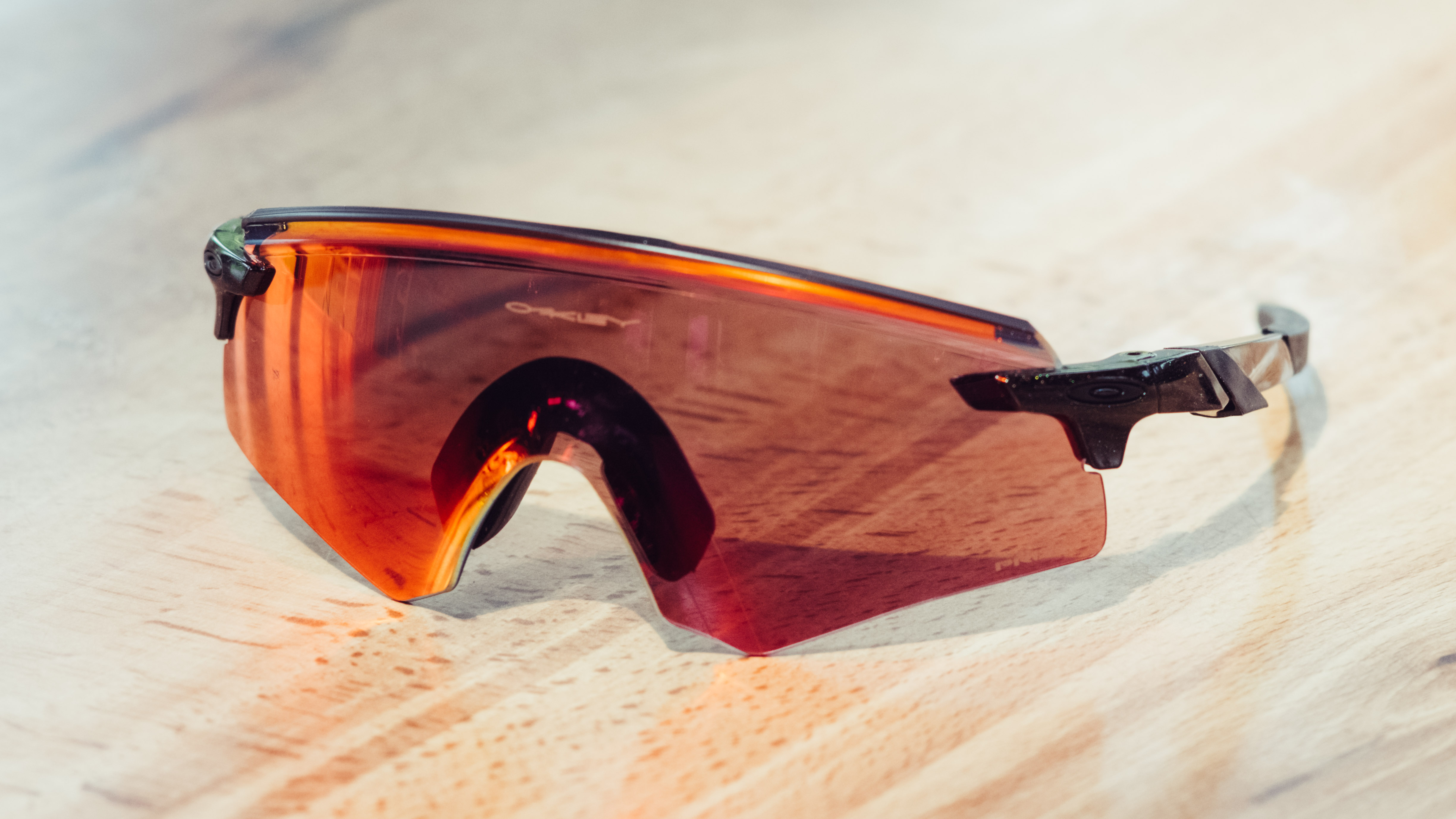
Specifications
Reasons to buy
Reasons to avoid
✅ You want a do-it-all pair of glasses: The lens clarity is excellent and the Prizm Road lens works well in all conditions.
✅ You want glasses that don't interfere with your helmet: Those with smaller heads always suffer with arm-helmet interference, but this is minimal with the Encoders.
❌ You want an uninterrupted field of view: The lenses provide mostly good vision, but the nosepiece can sit in your eyeline.
❌ You want multiple lenses: Although the Prizm Road lens performs well in a variety of conditions, the Encoders don't allow you to swap lenses.
I have the opportunity to wear more or less any cycling glasses on the market, but when I'm not testing something new the Oakley Encoders are the pair I always come back to. They're not perfect, but they hit a Goldilocks zone offering incredible optics, a brilliant field of view, and a combination of fantastic retention without becoming uncomfortable. They are also the only frameless pair of cycling glasses that hold this well, far better than any of the lightweight options, thanks to the ridge at the upper edge of the lens.
While the lens isn't the biggest, the wrap is moderate, so the field of view is very good. The real star is the lens tint itself: The Prizm Road lens is the best on the market for clarity, contrast, and, importantly, given that you can't swap the lenses, use over a wide range of light conditions. I've used the Encoder in full, peak summer sun all the way through overcast conditions, to near twilight.
The nose and arm grippers ensure the whole package stays in place with a tenacity that's unmatched by anything else. The only drawback is that the nosepiece, replaceable to tune the fit, has a wide rubber halo that slightly encroaches on the field of view. If I had to keep only one pair from my massive stash of cycling glasses, it would be these. If you want to know a little more, I've written a full Oakley Encoder review, so you can delve even deeper. It's also worth noting that, visually at least, the Encoder shares a lot with the more maverick-looking Oakley Kato. I prefer the Encoder, but the Kato is also decent if you like the look.
Everything I've said here is also true for the vented variant, the Encoder Strike. It's a slightly different lens shape, but not enough to make it perform any differently. If you live somewhere particularly humid, then go for these instead.

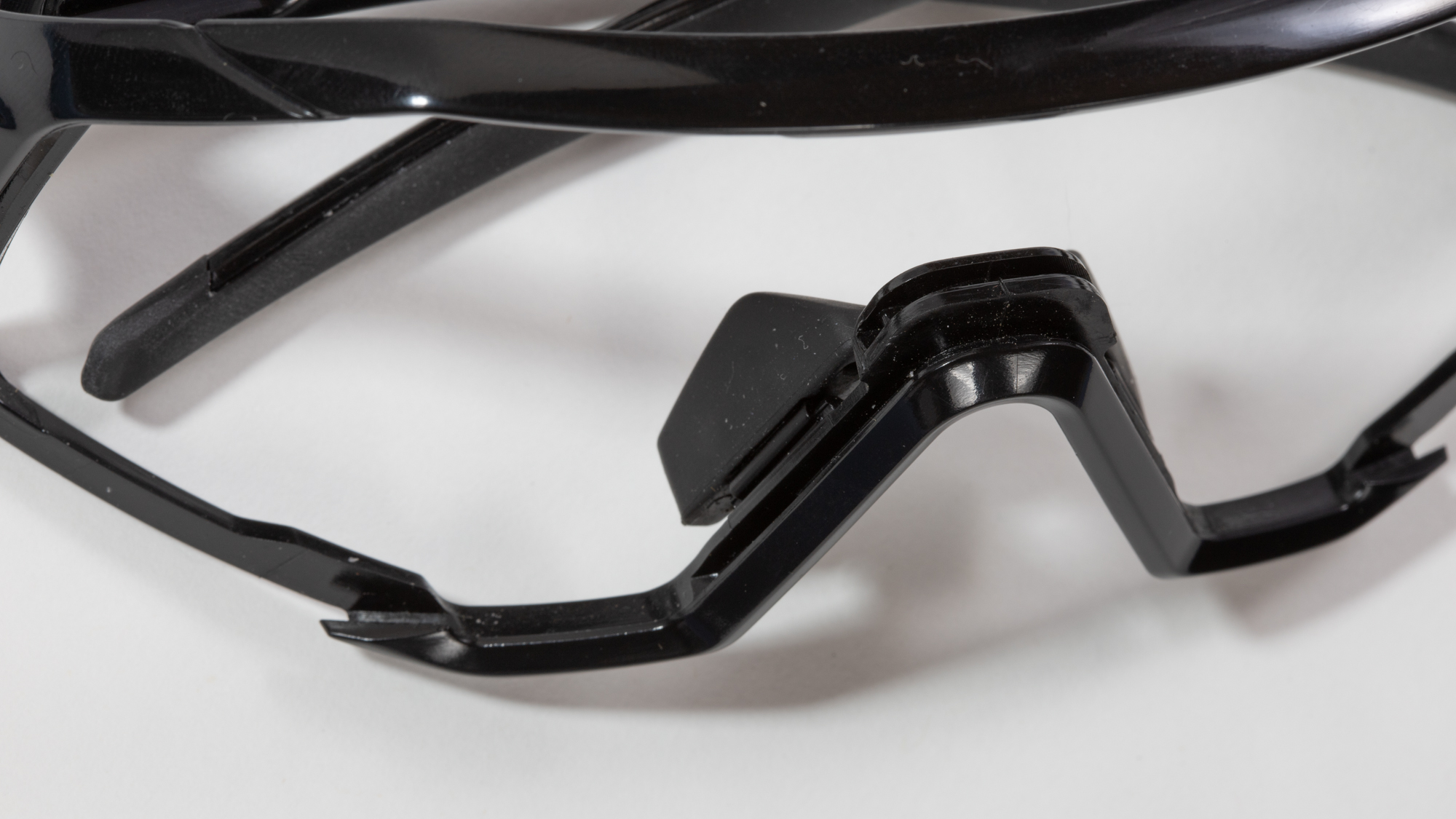
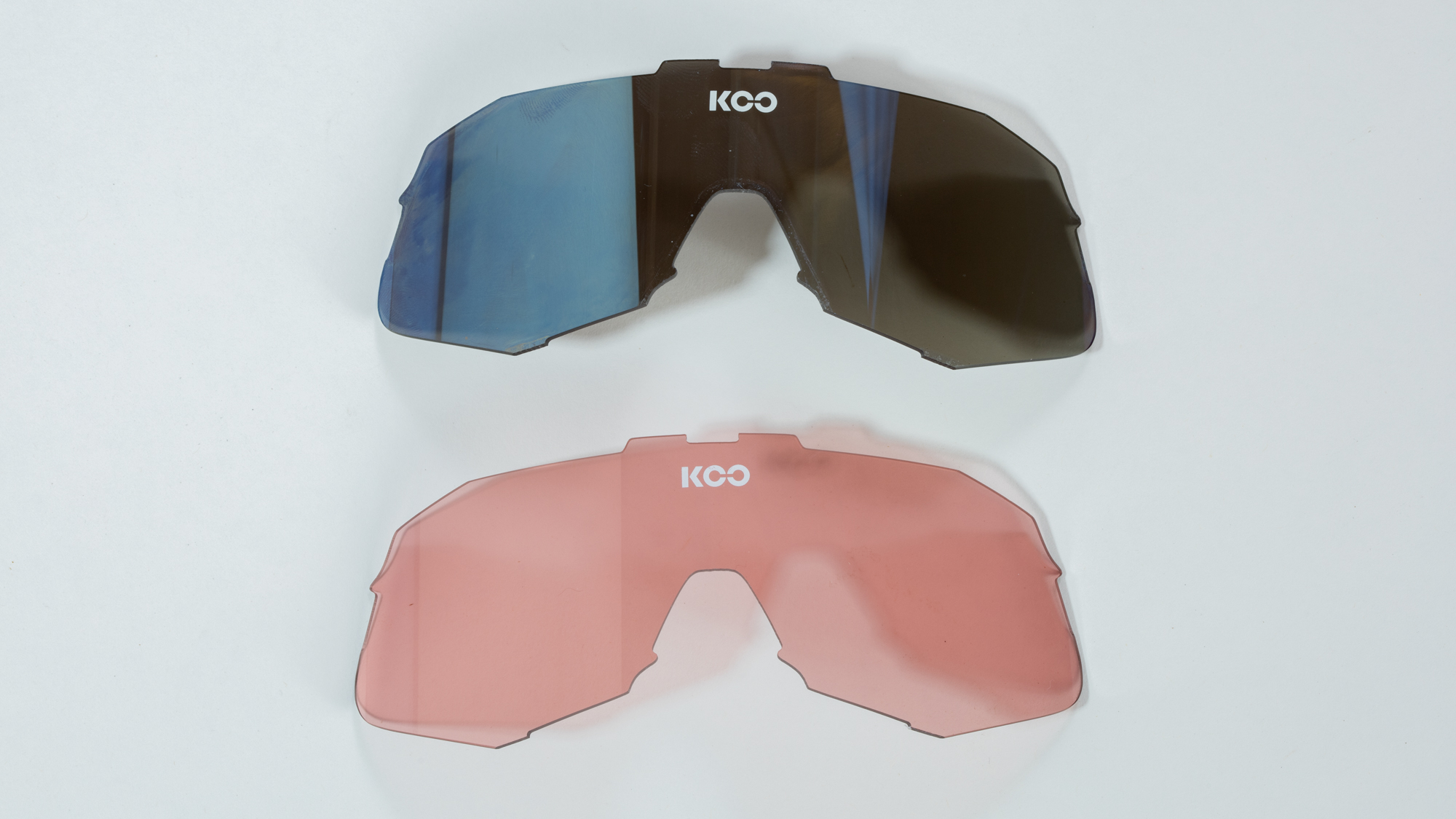
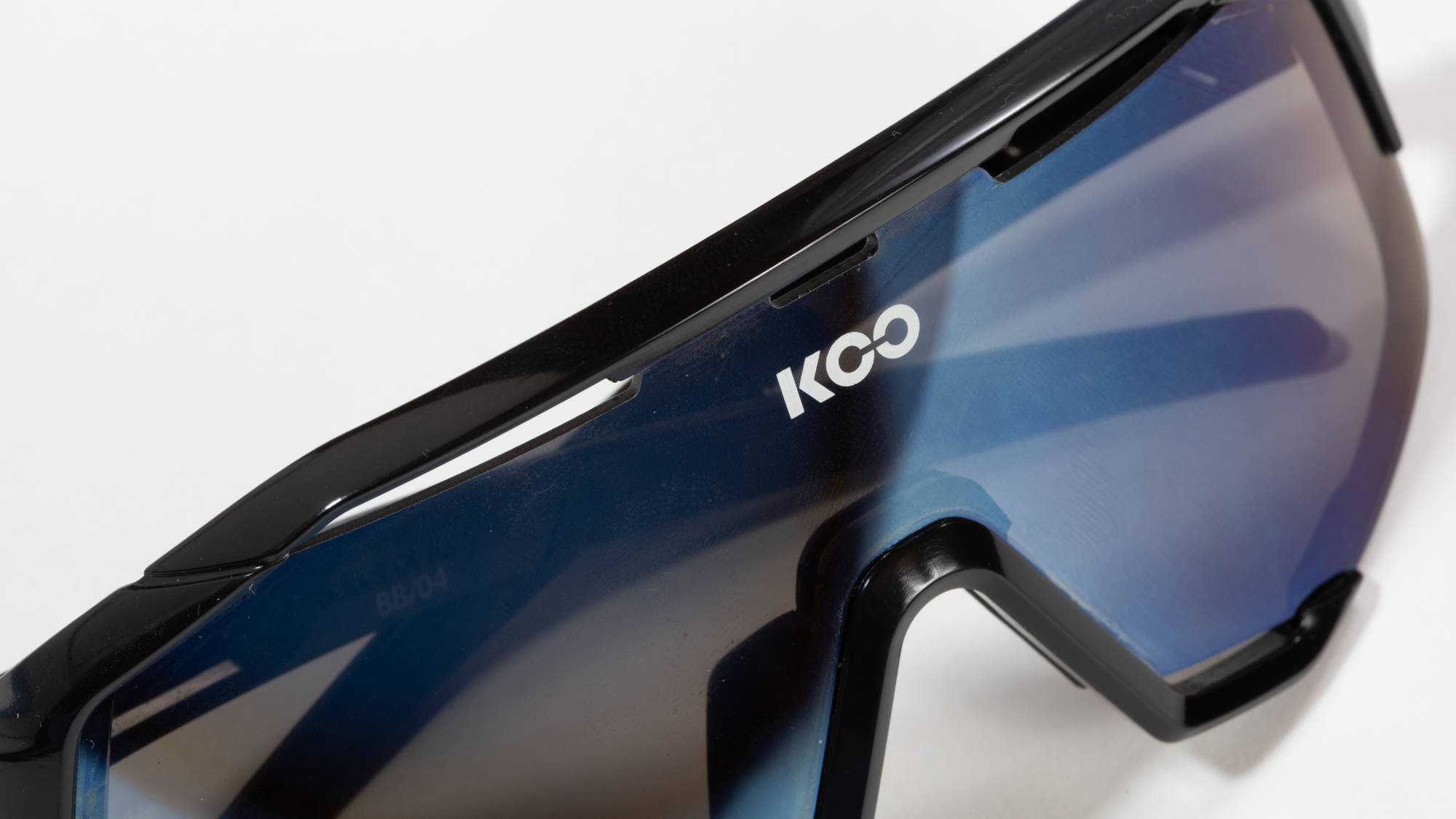
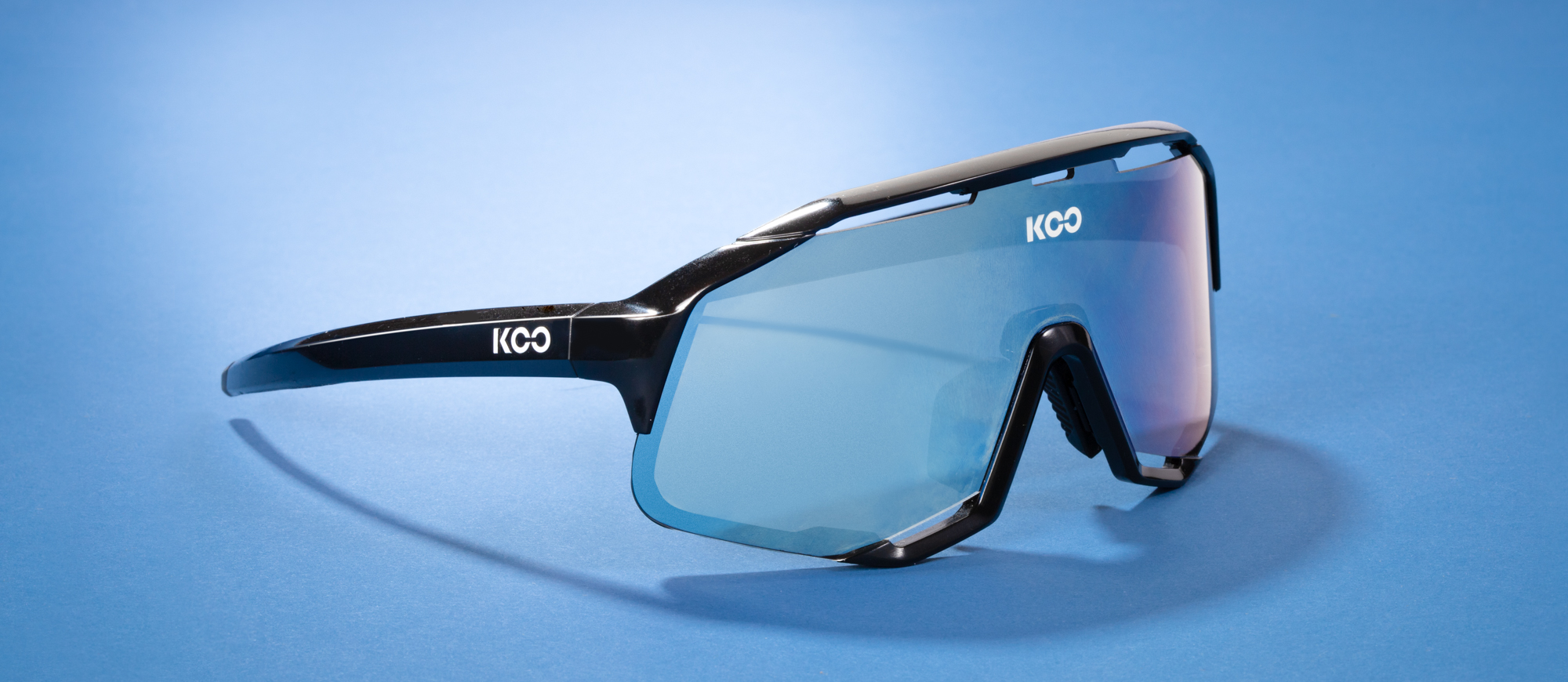
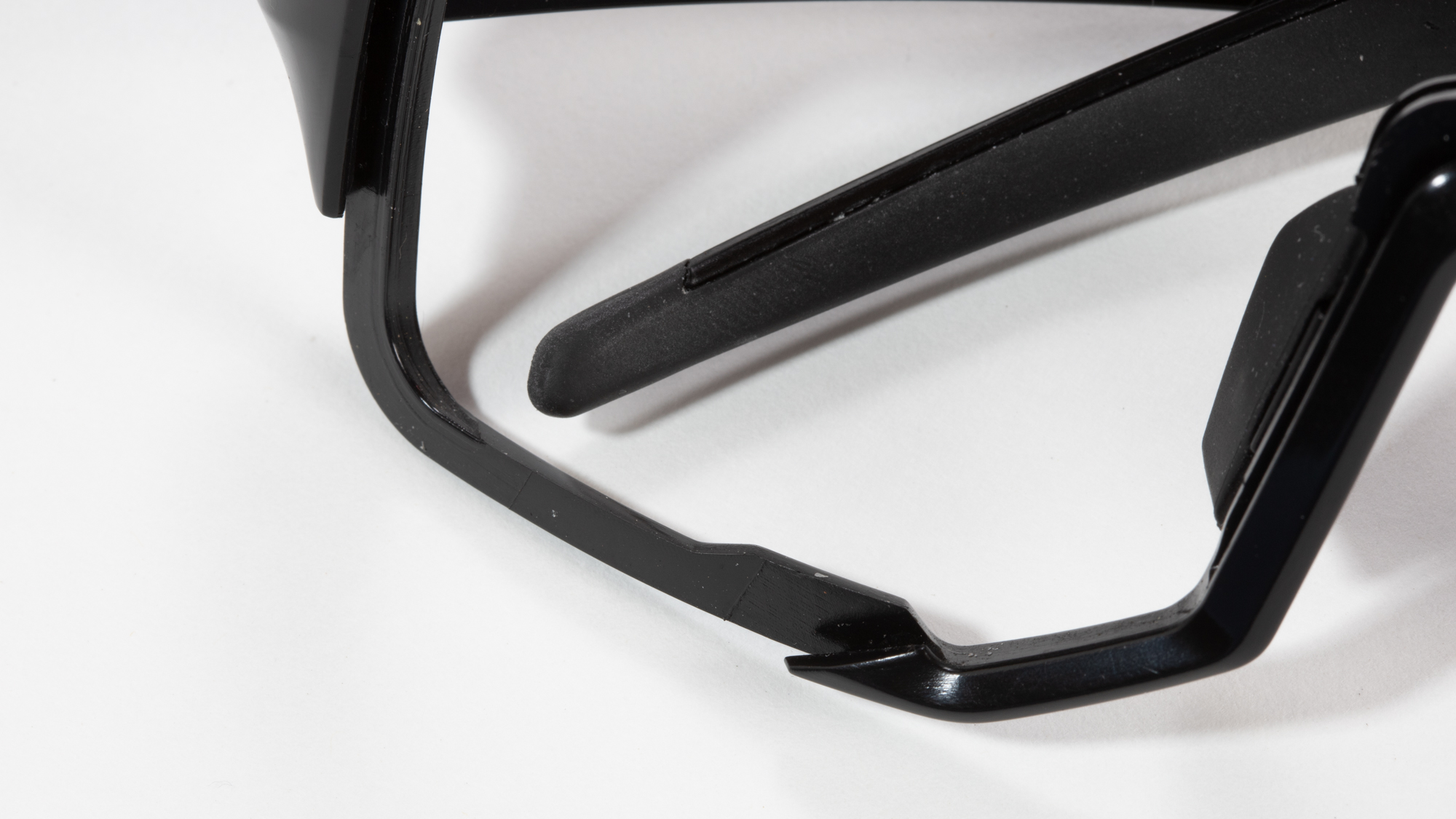
Specifications
Reasons to buy
Reasons to avoid
✅ You want an all-round pair of glasses with plenty of colour options: They offer good retention, good optics, and an unimpeded field of view, with 12 lens and frame colour options to choose from.
✅ You want glasses that don't fog up: There's plenty of ventilation to help keep the Koo Demos from fogging.
❌ You want glasses that come with a case: These don't include a hard case, so you'll need to store or transport them carefully.
If I don't reach for the Encoders, I usually grab the Demos from Koo, the eyewear sister brand to Kask helmets. The Demos share a lot of the same qualities that make an excellent pair of cycling glasses, those being good retention, good optics, and an unimpeded field of view.
The Demos sit a little higher on the face than the Encoder, and as such are slightly better suited to more aero positions where you're looking more through the upper portion of the frame. The Zeiss lenses are a little lighter in tint but offer similar clarity and contrast. Perhaps not so brilliant in really strong sun, but in lower light, they're much the same.
Unlike the Encoder, you can swap the lenses easily on the Demos, though no spare is included, which feels like a letdown at this price point. All the same, the build quality feels excellent, with a really solid hinge.
Honestly, the main thing that I didn't like about the Demos was the packaging. If you're environmentally minded, then it'll probably enrage you too, as a single pair of sunglasses came in a box larger than one that would contain a pair of hiking boots. Within this large box was an intricate inset structure, which then housed another cardboard box and sleeve, within which the sunglasses themselves were housed. I've no idea if this is still the case, but it was ridiculous.
My colleague Josh Ross has penned a Koo Demos review, and our opinions tend to match up nicely, so dive in if you want to find out more.

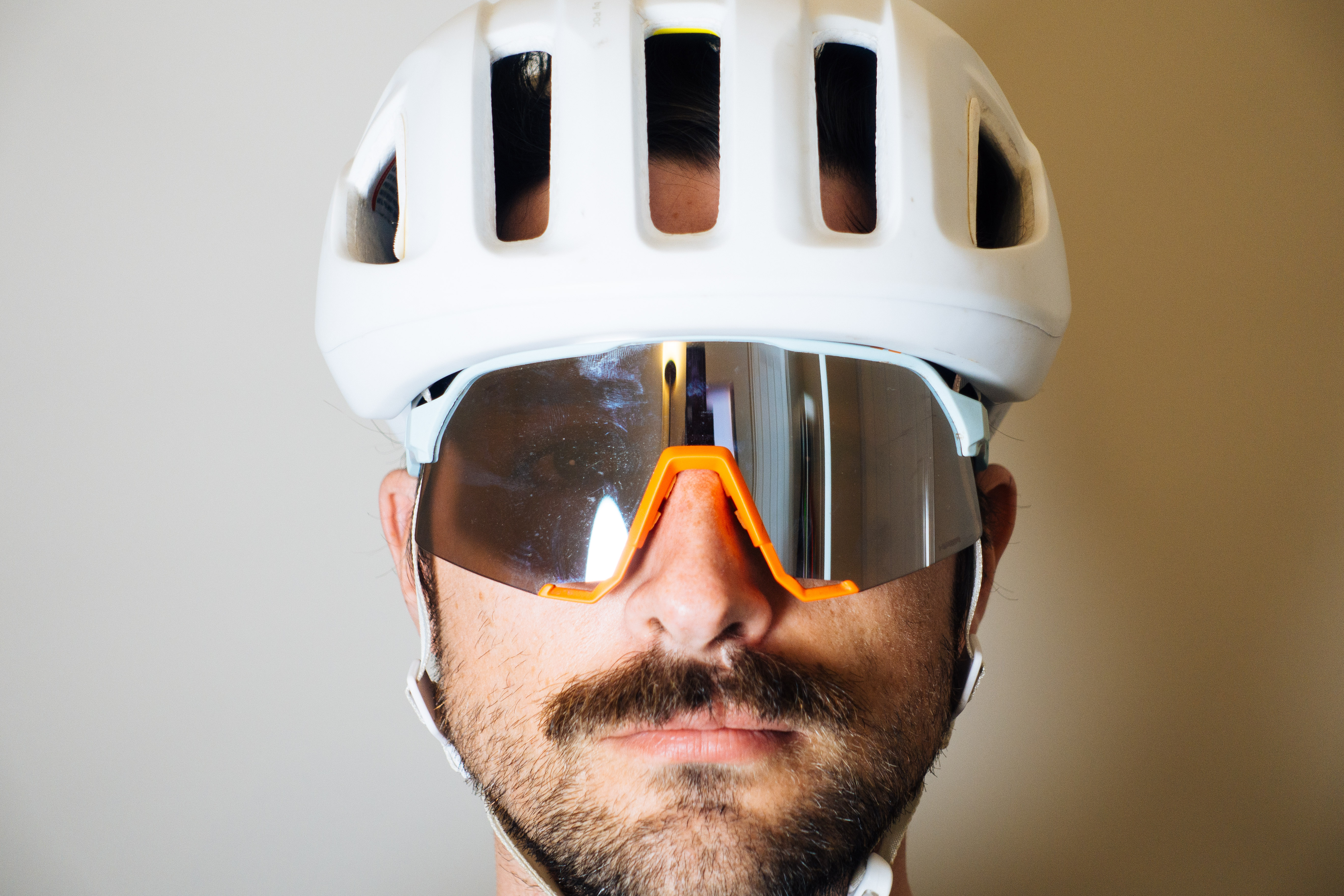
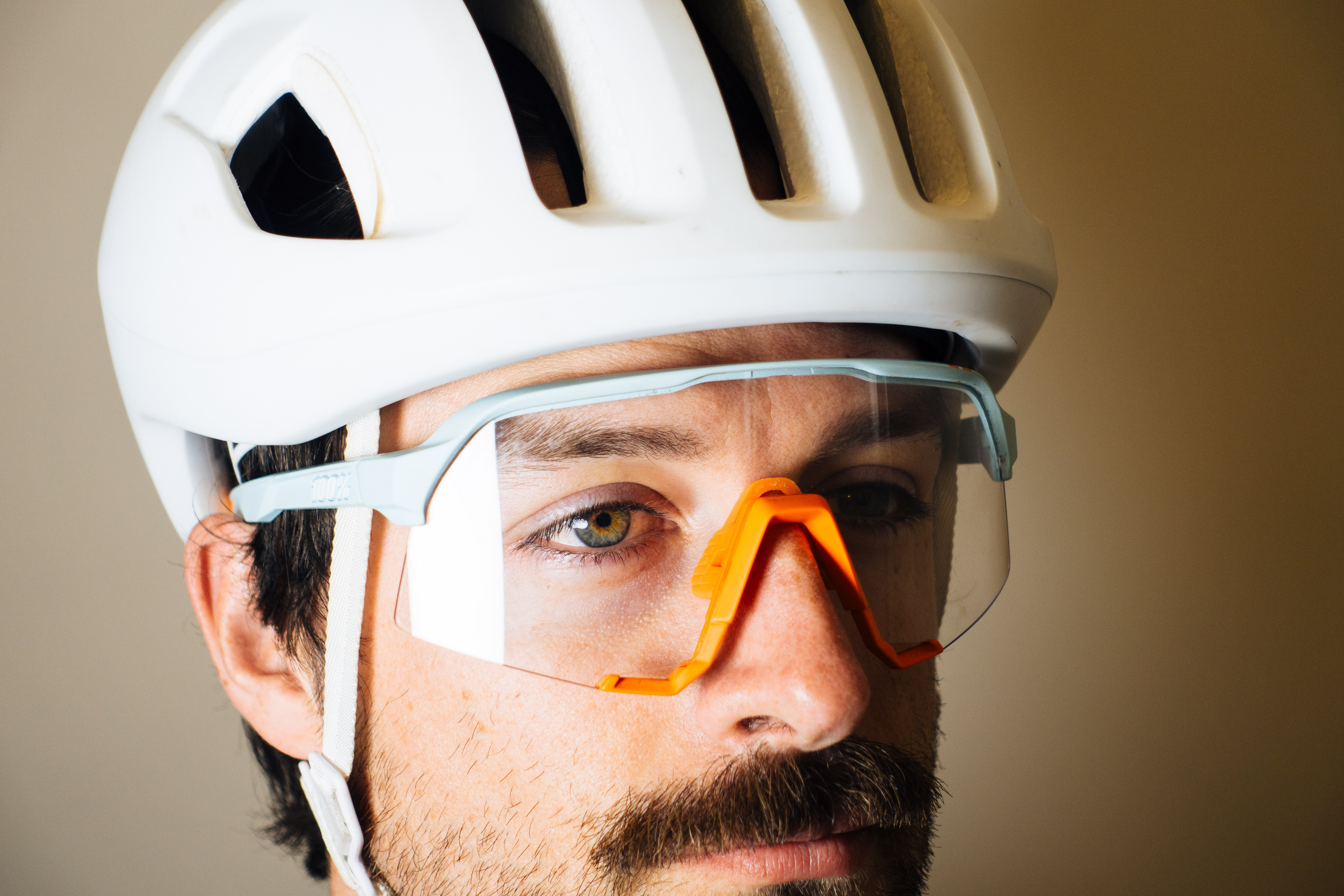
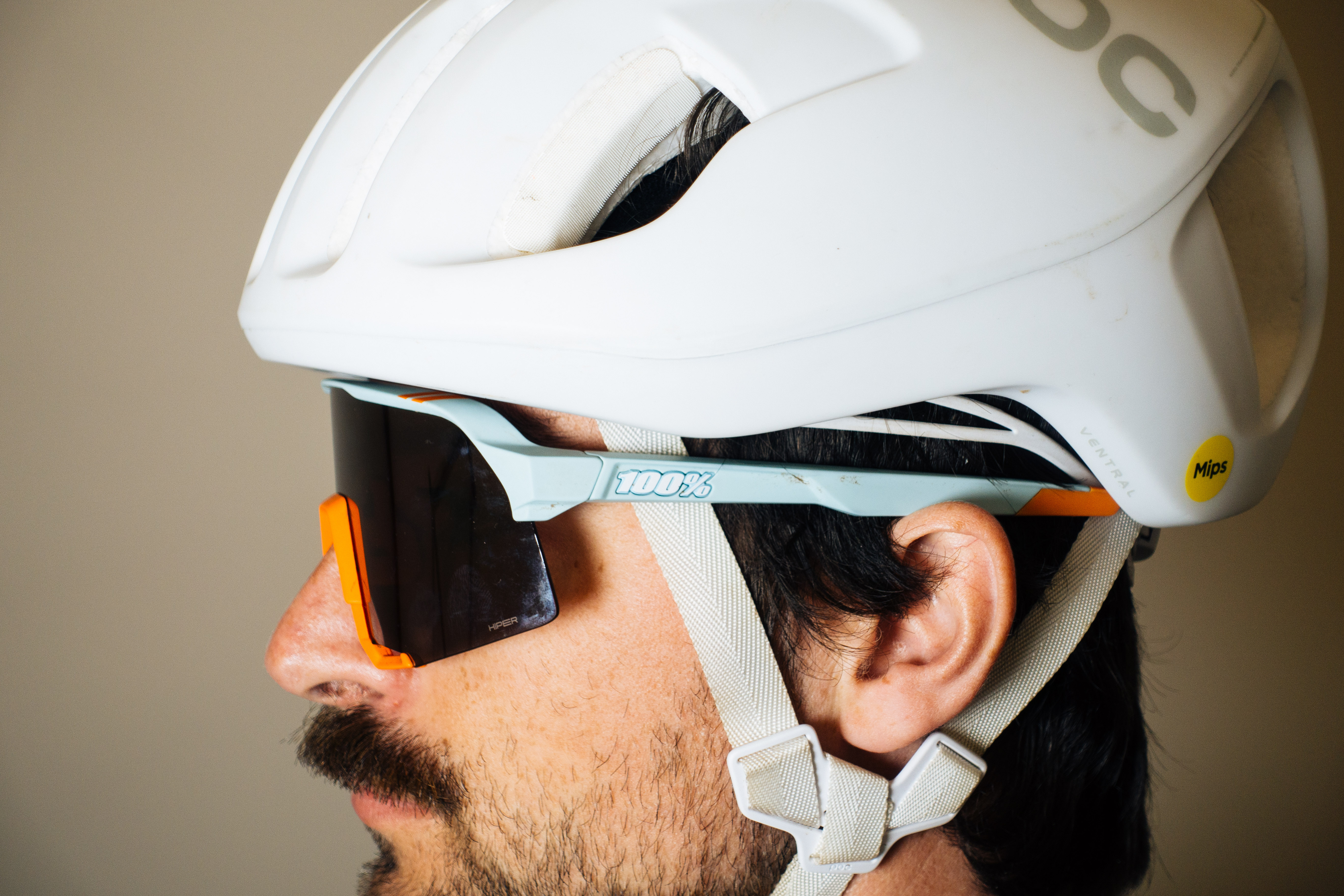
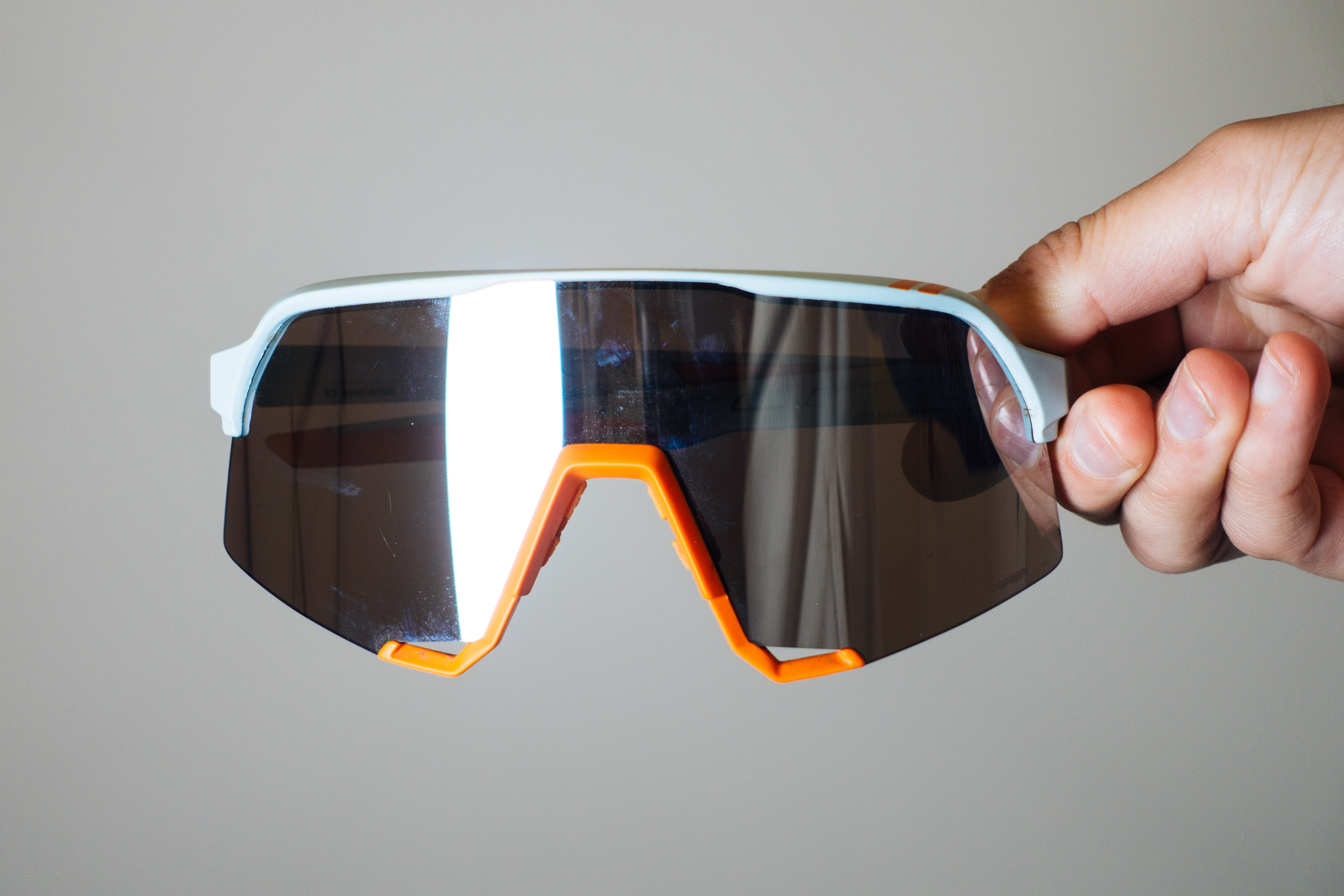
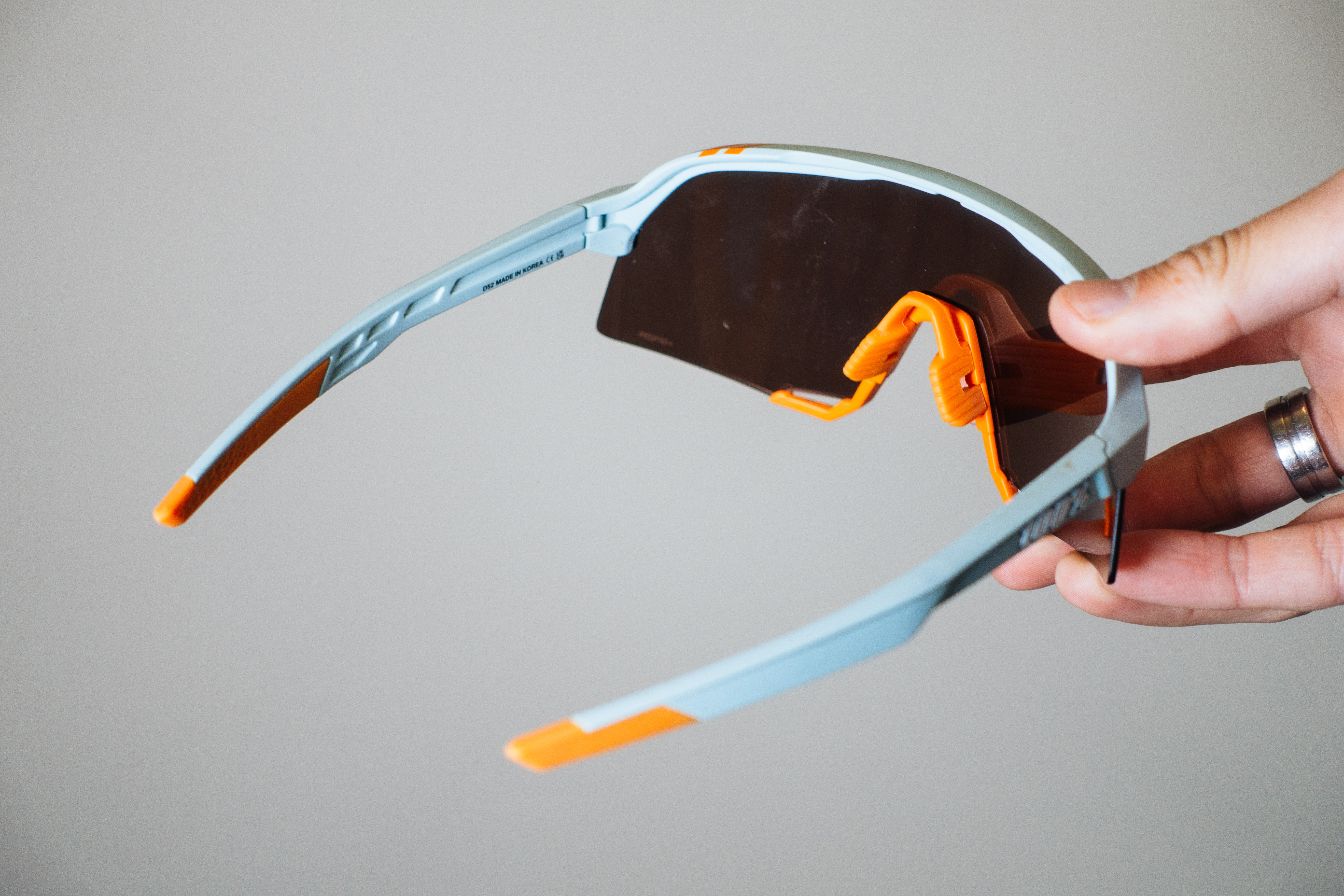
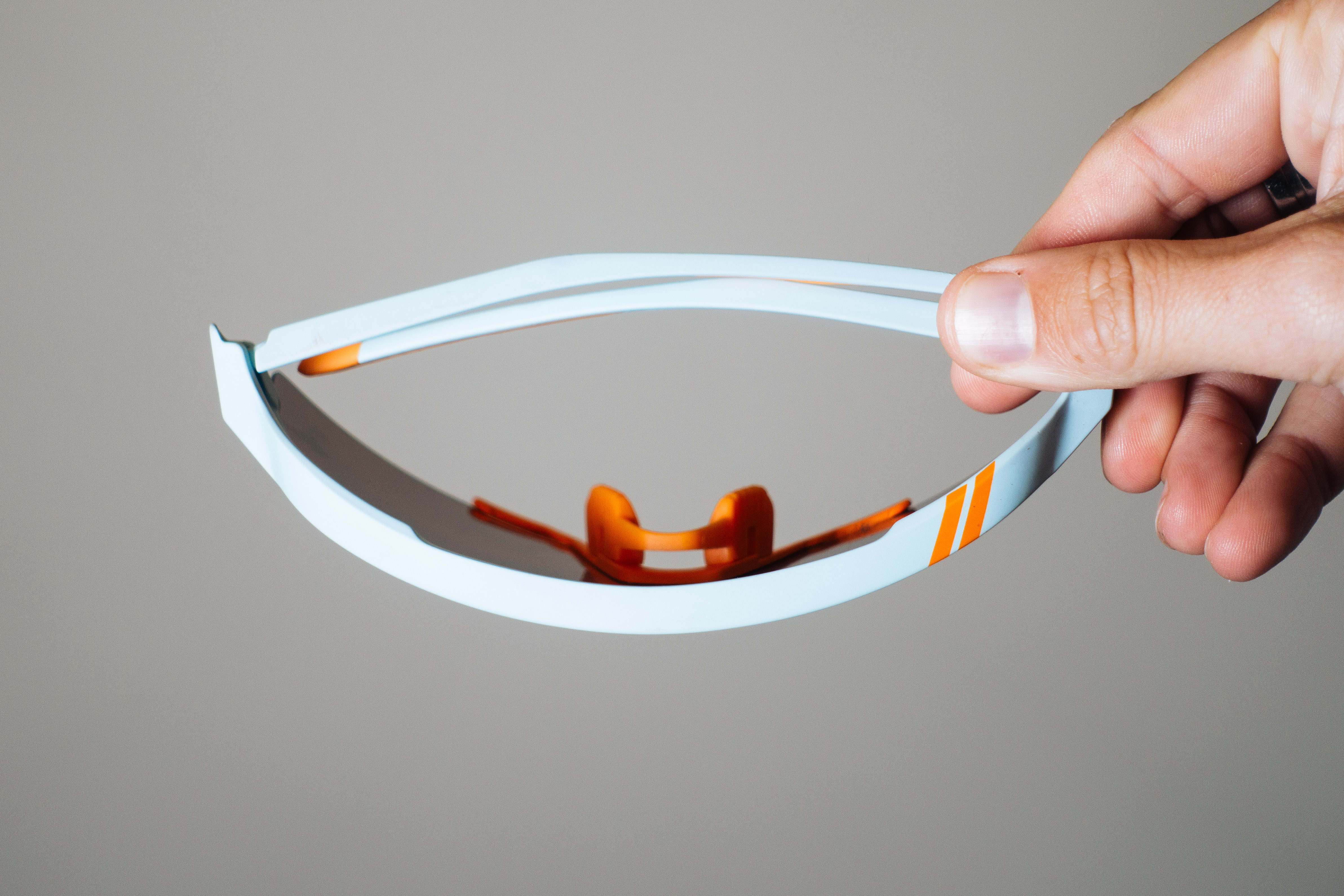
Specifications
Reasons to buy
Reasons to avoid
✅ You want a good value pair of glasses for year-round riding: With both a coloured and a clear lens included, they’re ready for any weather or light condition.
✅ You want full coverage: A big lens means big coverage, and that’s what you get here.
❌You want glasses that play nicely with helmets: The arms can interfere with some helmet cradles, but their flat profile makes it less problematic than with many other glasses.
I've got the S3 from 100% in a colourway that's a clear homage to Gulf Racing. Given the brand's background in American Motocross, it feels semi-fitting. The soft-touch finish, something that you can only really get from 100% to my knowledge, does also lend a noticeably premium feel to proceedings, though if you have greasy hands from a dropped chain, the frames can hold stains more than others.
Finish and colours aside, the S3 are a brilliant pair of cycling glasses. Perhaps not as complete as the Demos and the Encoder, but still very good. The nosepiece doesn't hold so well, and while the arms grip very well, they are quite long and don't have a strong wrap, meaning they're more likely to interfere with the rear cradle of a helmet.
The HiPER lenses, an orange base with a silver exterior in this case, are excellent in both shape and contrast. A little less good than the Prizm offerings from Oakley and the Clarity lenses from POC, but on the flipside, you get a clear lens in the box with every set of 100% glasses, so you can use them at night and in the winter with ease. For really filthy gravel rides, this is excellent, as you can just throw the clear lens on and not worry about scratching off the lens coating with grit.
Another benefit to these, mostly for aesthetic reasons, is the wide range of colour options. I'd always advocate for choosing the lens you need first, but I appreciate that for a lot of you cycling glasses are a style-first decision, and so if you need options, then you'll have many to choose from here.
My 100% S3 review goes into all the reasons why I think these are the best choice if you spend a lot of time riding outside in winter.
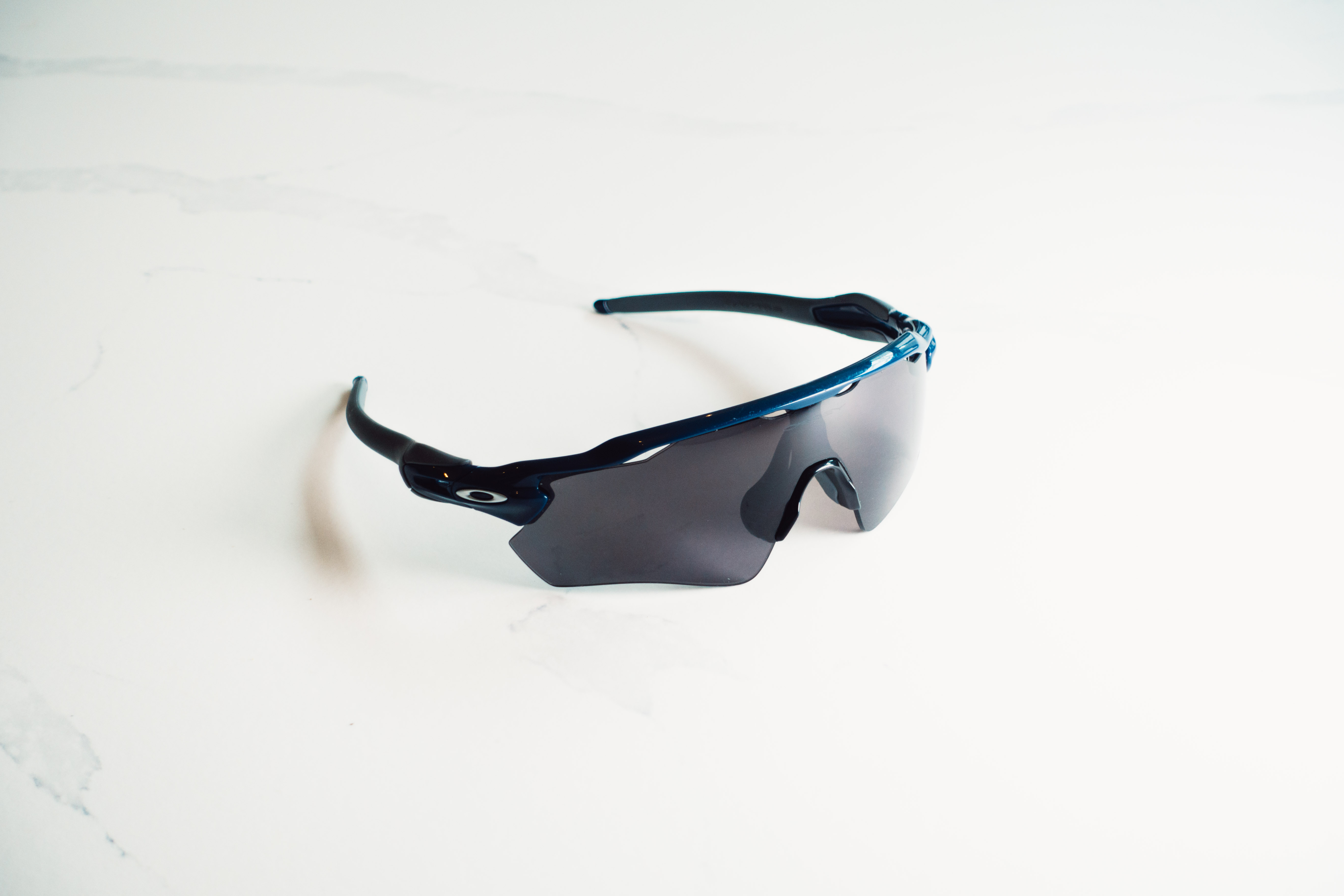
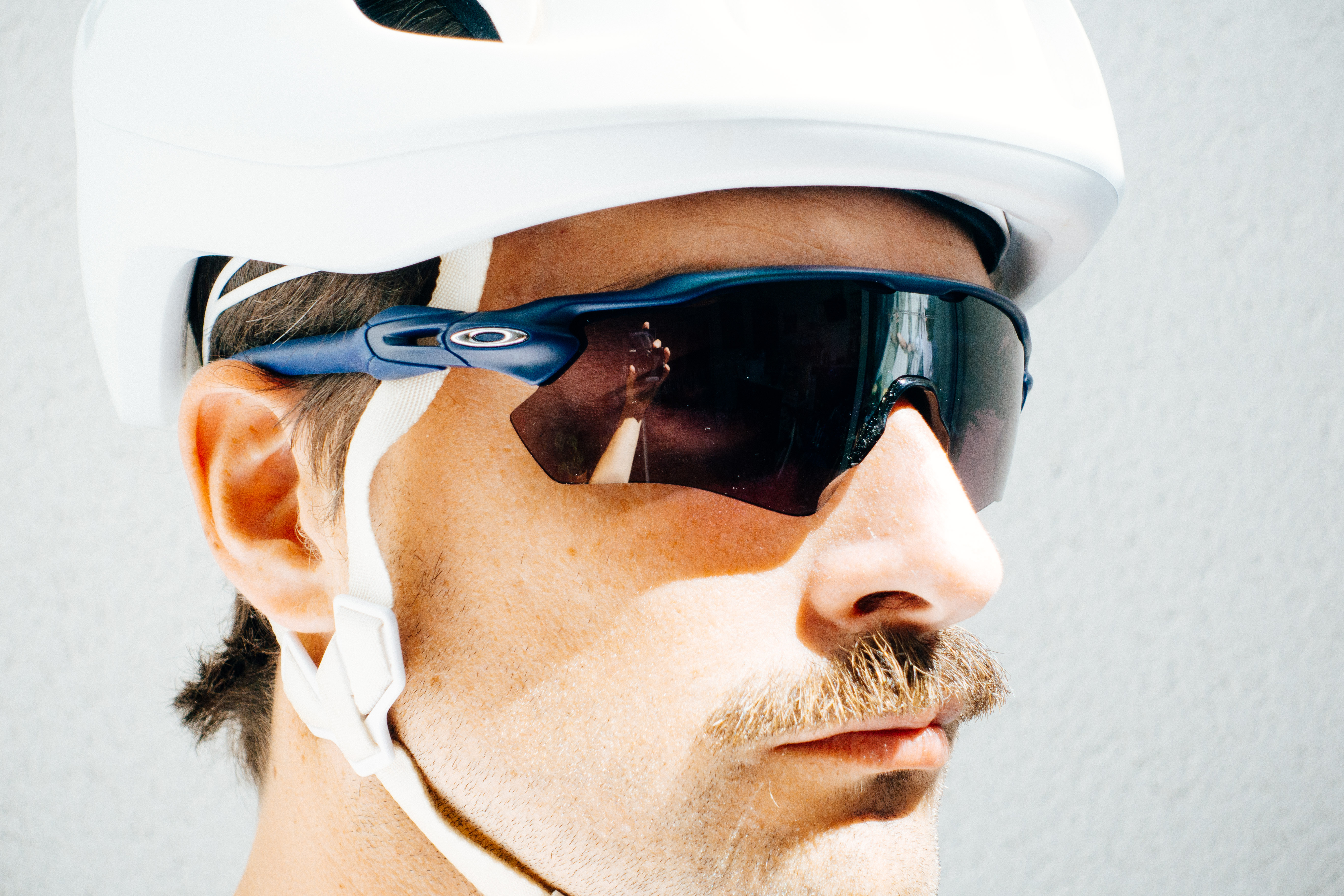

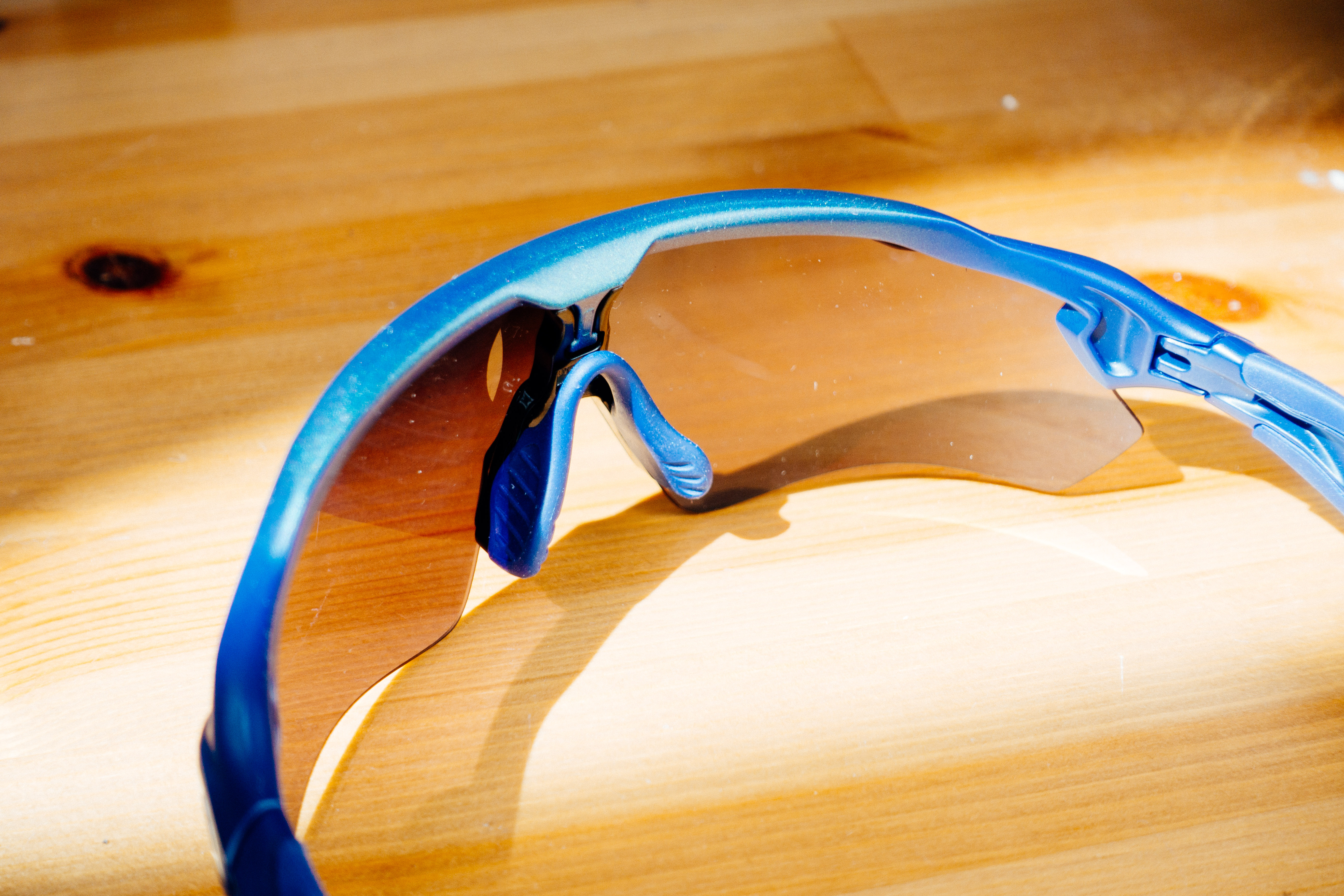
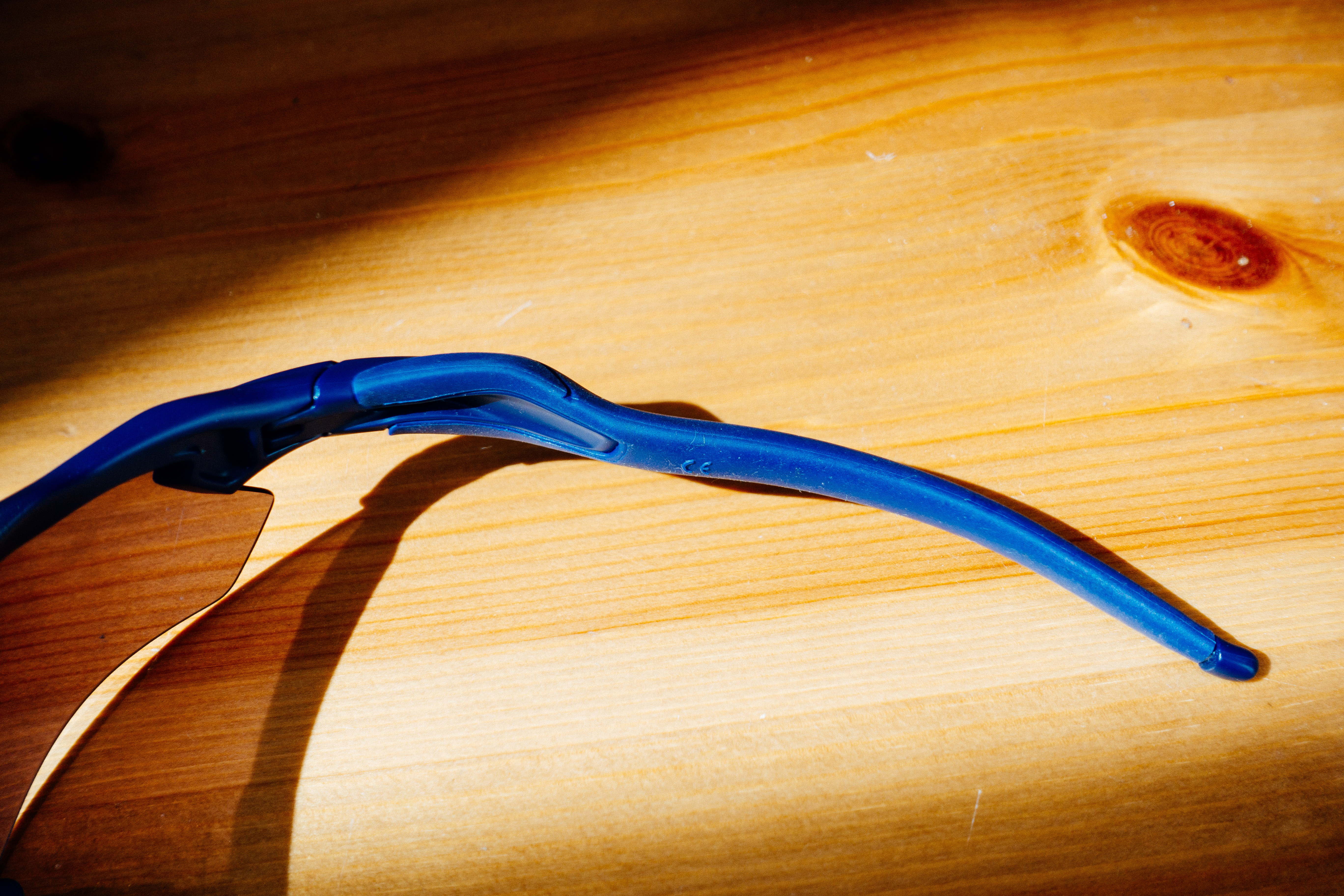
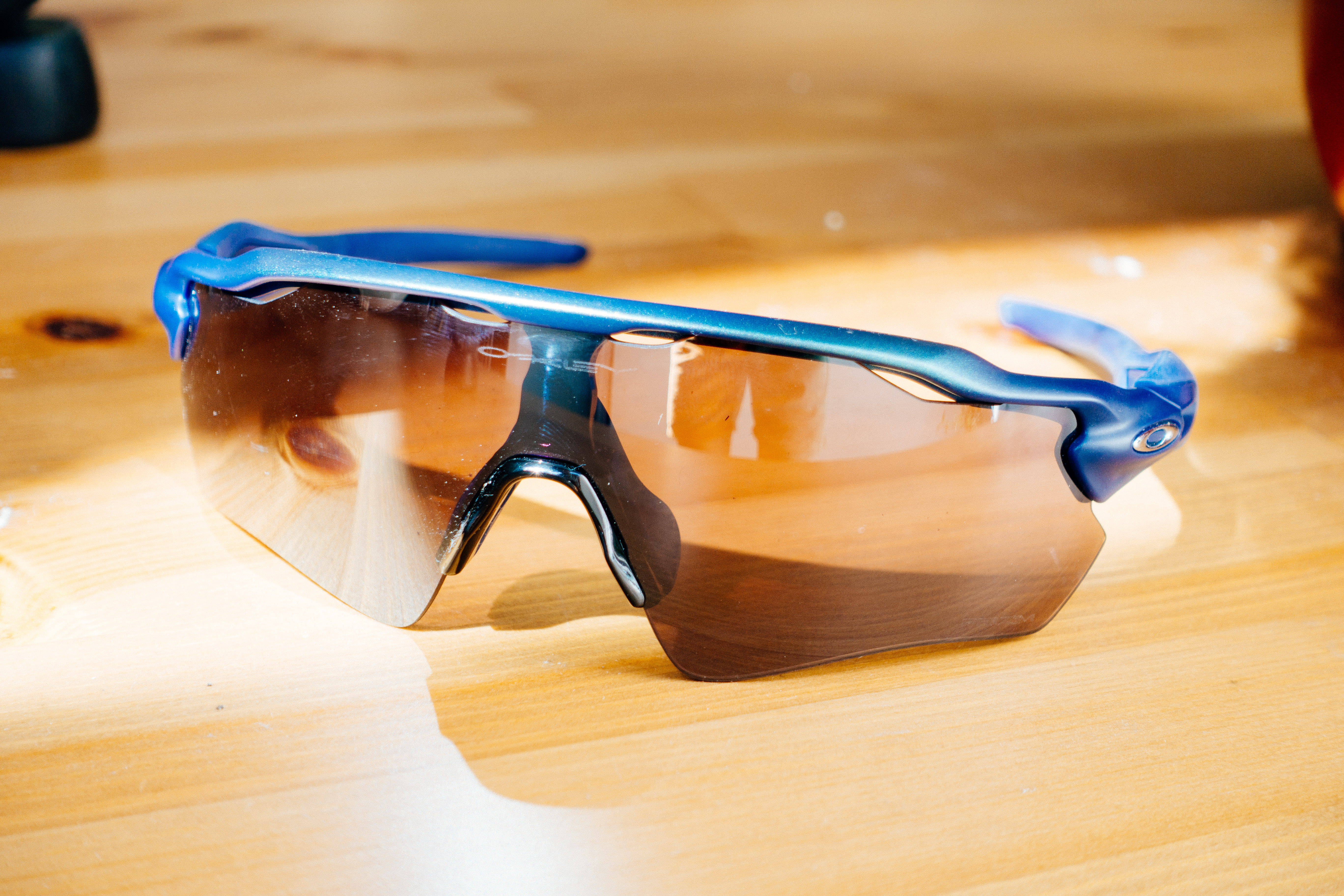
Specifications
Reasons to buy
Reasons to avoid
✅ You want a classic pair of glasses that work across multiple sports: These are a great pair of glasses, not just for cycling, but for more or less any activity you can think of.
✅ You want good value glasses that are comfortable and secure: The fit is excellent, with arms and a nosepiece that hold firmly, so you can confidently ride over rough terrain.
❌You want full coverage lenses: These don’t offer quite the same field of view as bigger glasses, so protection from wind and debris is slightly reduced.
❌You want to follow the latest cycling trends: These are a long-standing, established set of cycling glasses that won't give you the oversized look that's currently popular.
The Radar EV Path aren't really my cup of tea, but they do exist in a space in the market that transcends purely cycling and offers a true multisport offering that will no doubt appeal to many. This is reflected in a truly dizzying array of lens options available, from the brilliant Prizm Road to golf and watersport-specific options.
They also offer an aesthetic package that doesn't necessarily scream 'cyclist', which may be a bonus to some of you, particularly if you engage in sports other than cycling too.
They're certainly a less arresting visual package than the whopping mono lenses of the POC Devour and the Oakley Sutro Lite, though the smaller lens does offer a more limited field of view, particularly at the top of the lens where the frame does encroach a little on things when in a full aero tuck. I found the frame basically sits against my eyebrows too, which was a little annoying.
All this aside, you're still getting brilliant Oakley optics, and a retention only really topped by the Encoder. If you're into more than just cycling (maybe you do insane things like running too, no judgment) and want something that works well while in an upright position, these are hard to overlook.
My Oakley Radar EV Path review goes into why I think these still have a place amongst the best on the market.
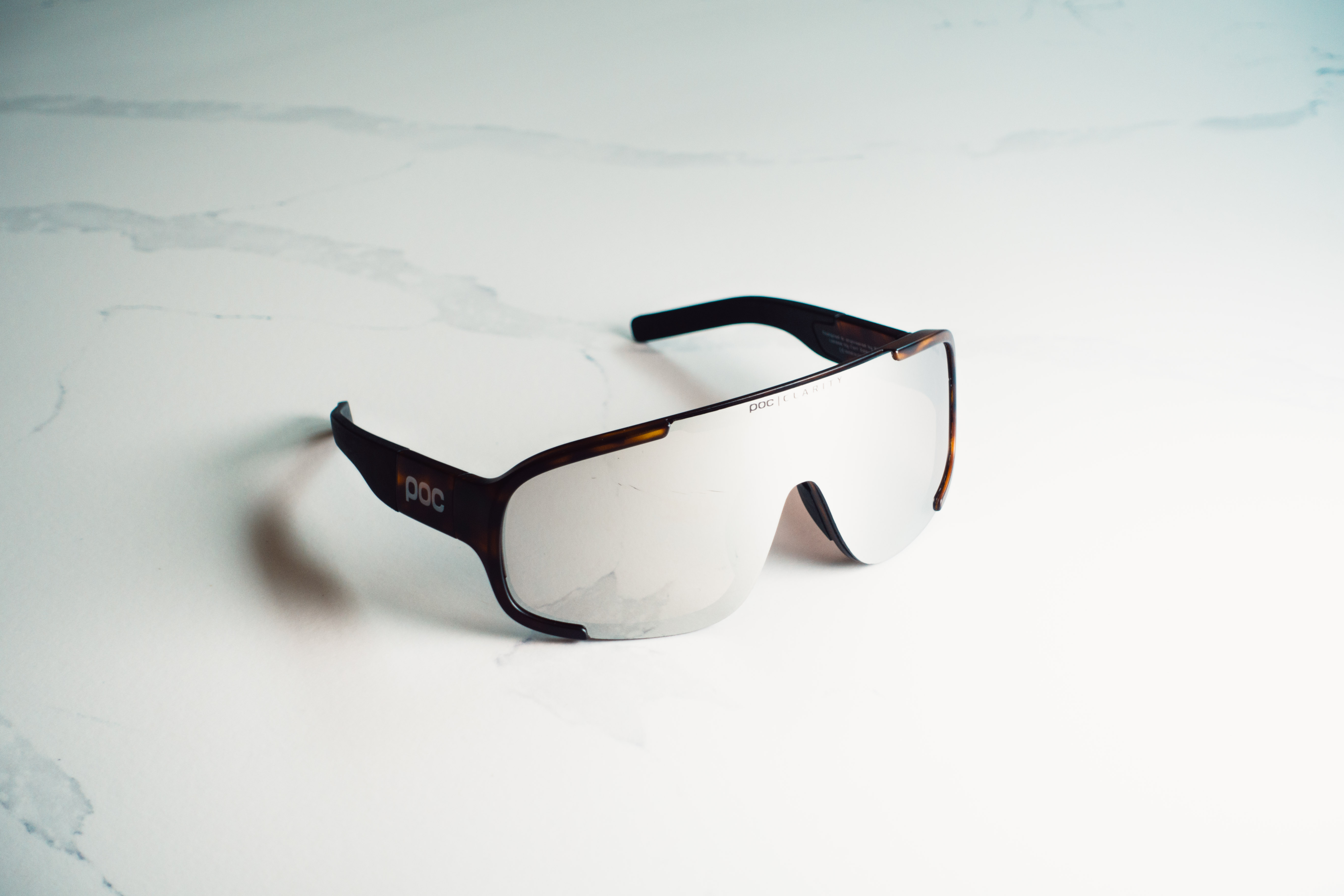
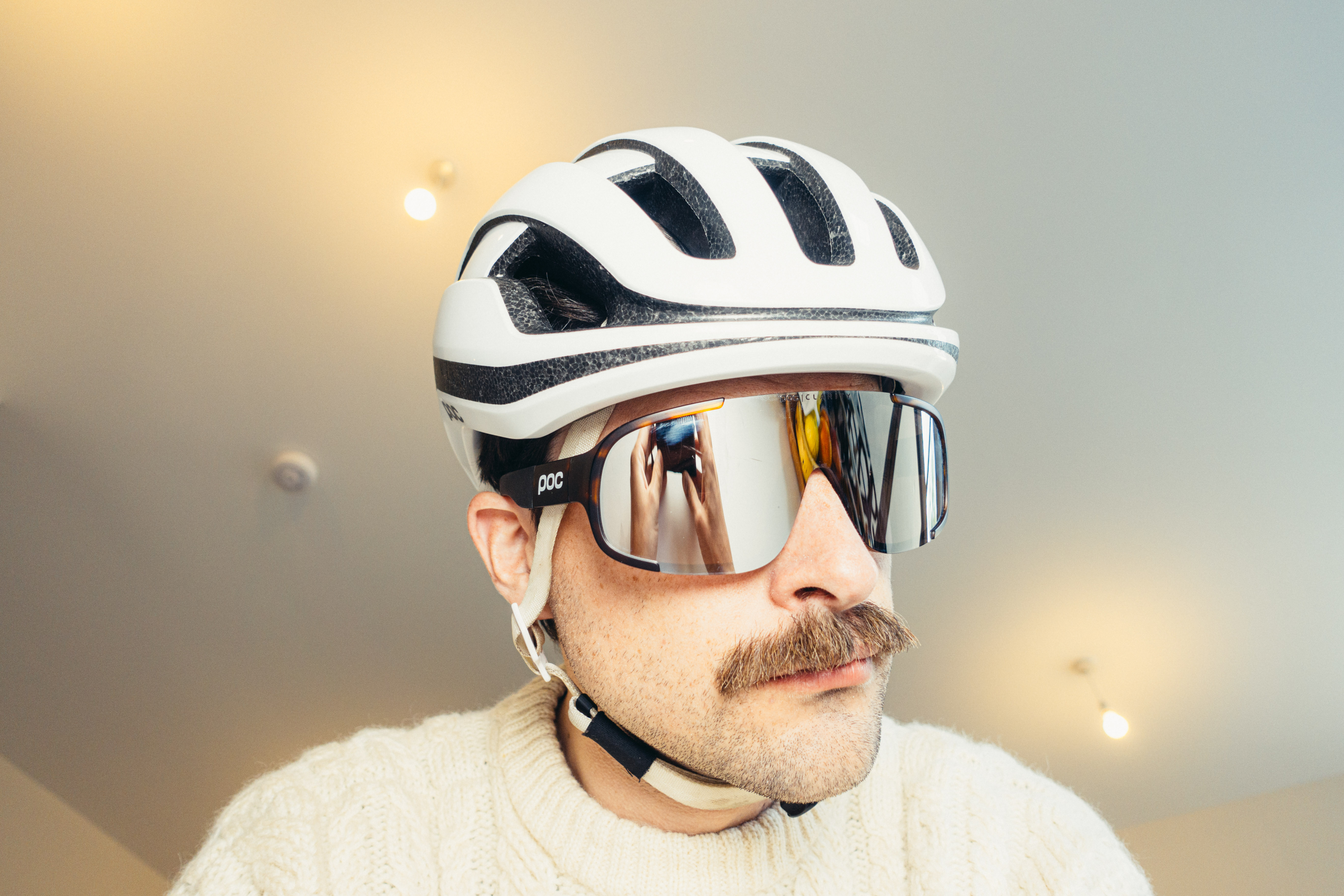
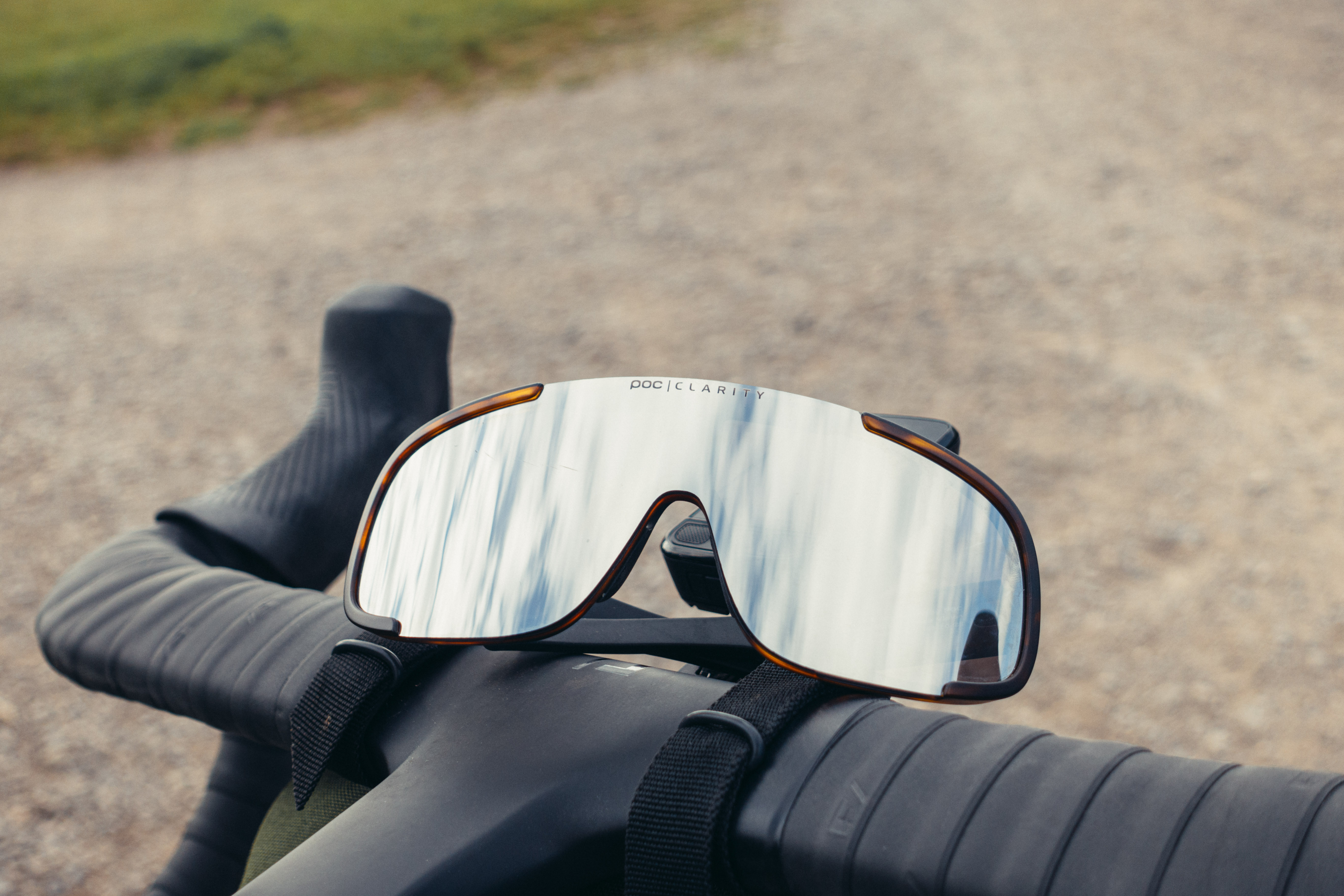
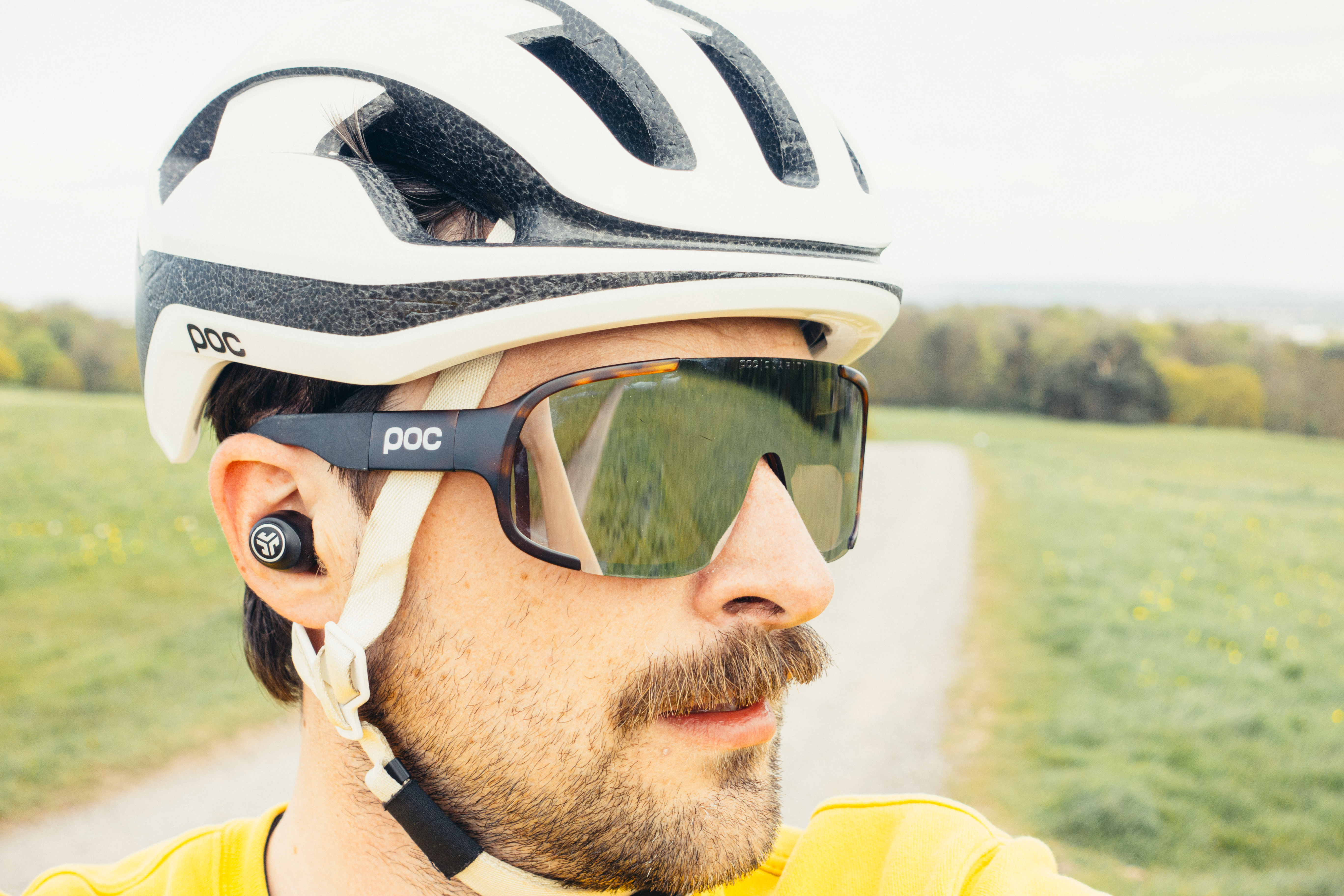
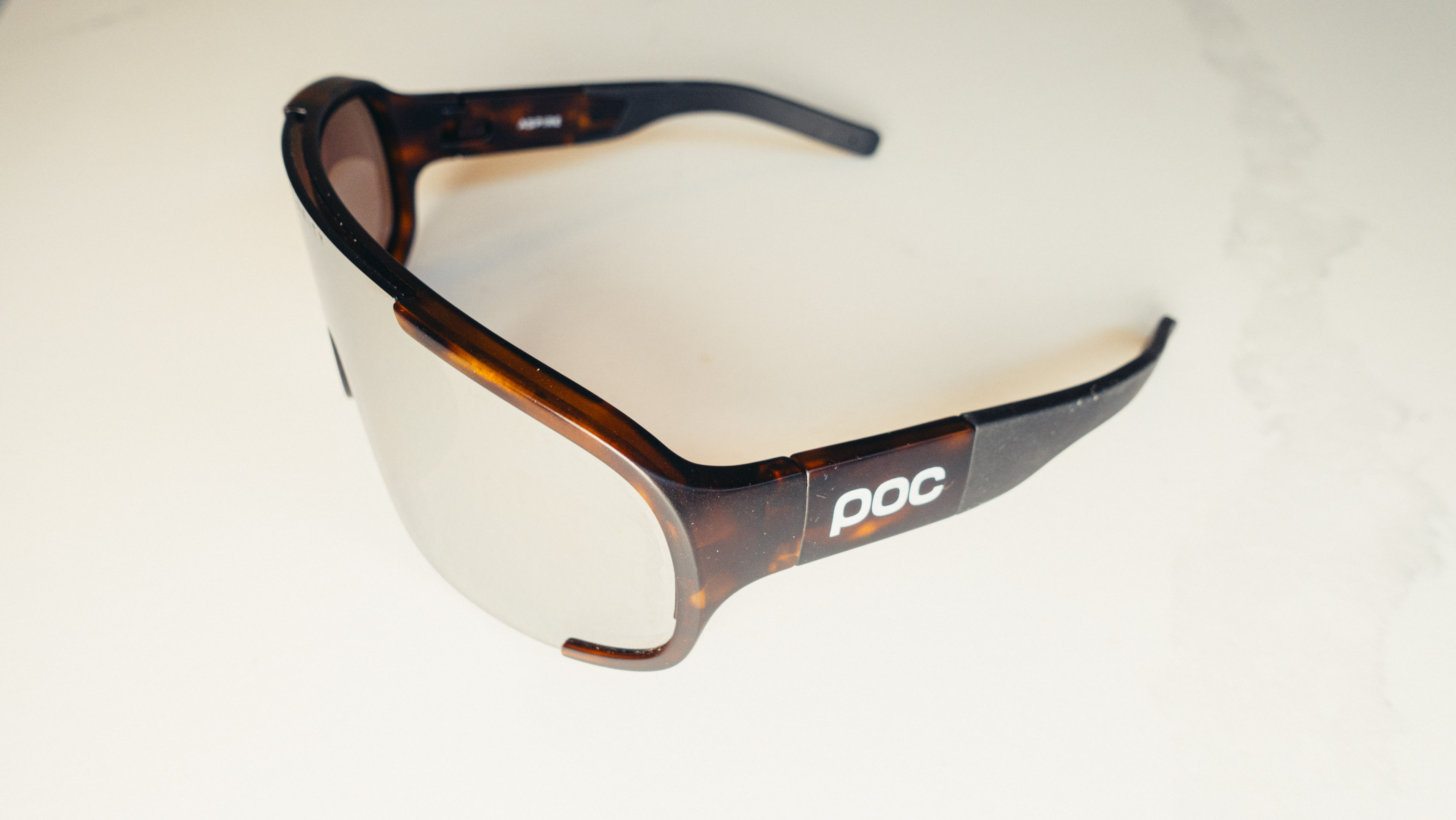
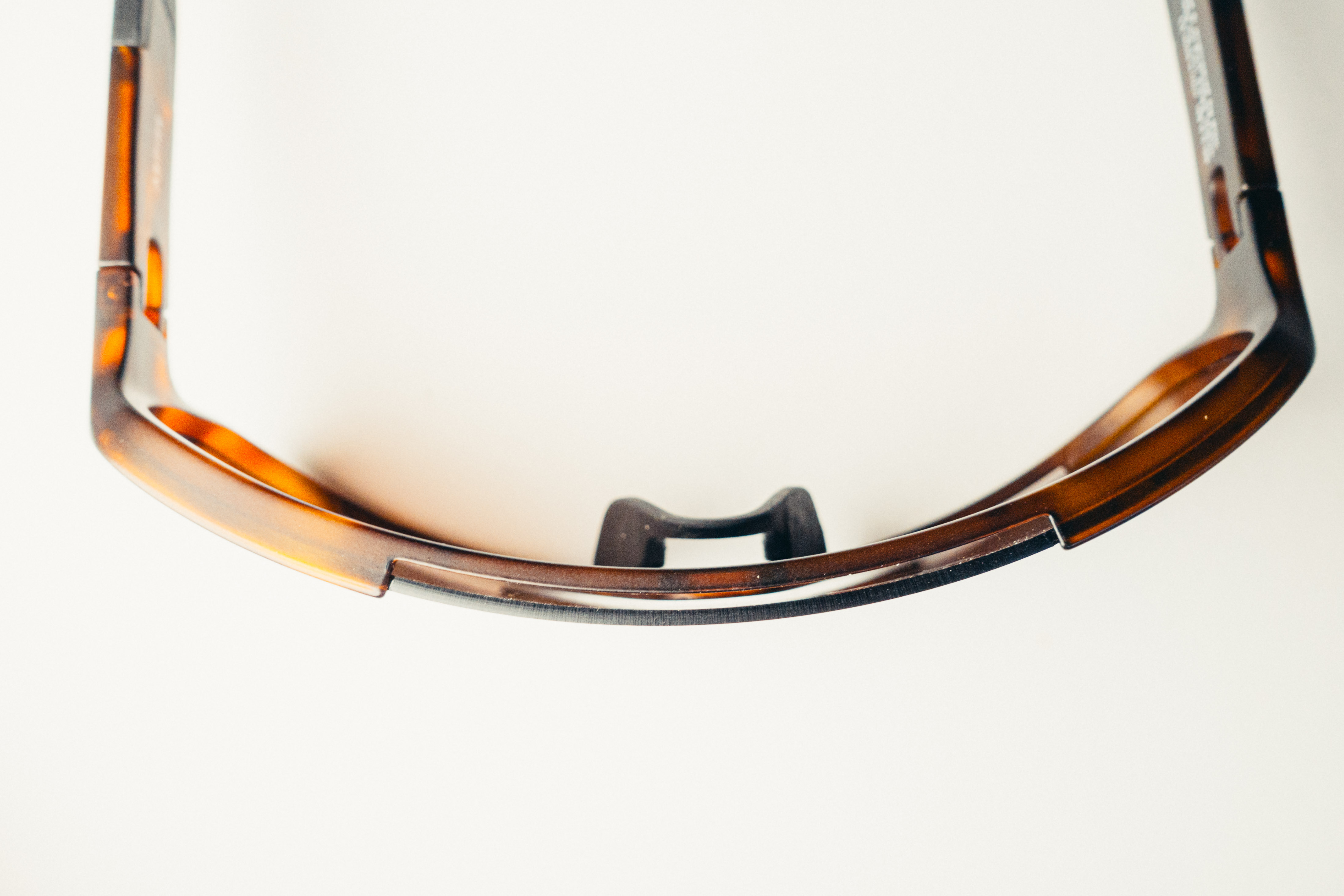
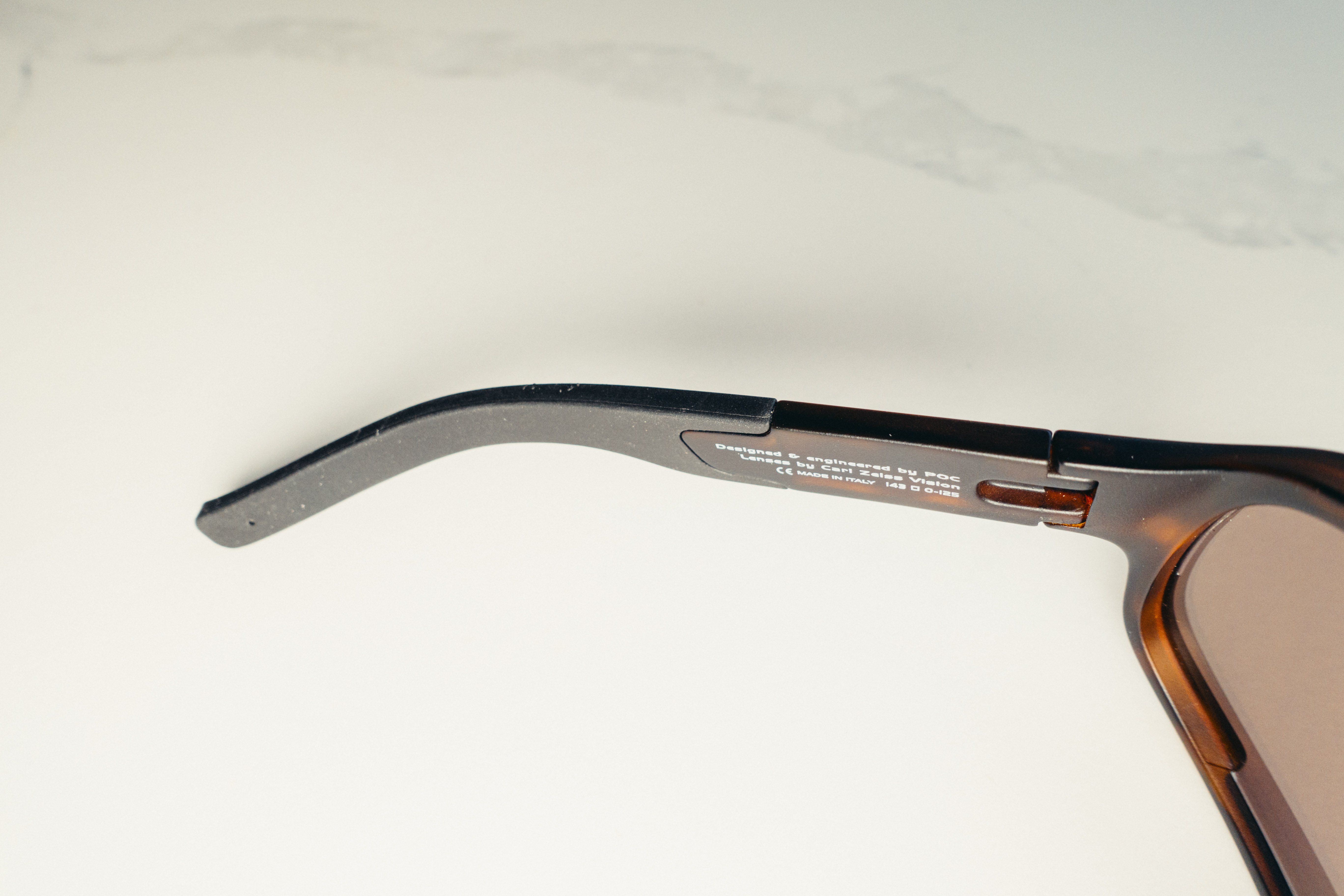
Specifications
Reasons to buy
Reasons to avoid
✅ You want glasses that are a little bit different: These have a distinctive aesthetic that has that EF ‘cool bike team’ cachet.
✅ You want a high-quality, well-built pair of glasses: The construction of these glasses is excellent, and the lens quality is superb.
❌ You want a lightweight pair of glasses: The large lens, full frame, and thick adjustable arms make these one of the heaviest pairs on test.
Cycling glasses from POC all have a similar aesthetic; a big lens with rounded edges that are noticeably wider than the competition. The Demos have size, the Elicit have low weight, and the Propel have aero. The Aspire are the generalist, and though they have some drawbacks, I think they're the coolest looking sunglasses on the market, especially in the tortoiseshell that I've got. This may be thanks to their use by the EF Pro Cycling teams, but whatever it is, it works for me.
The large lens, full frame, and thick, tuneable arms make them one of the heaviest pairs on test, and while the retention isn't quite so good at the nose, the bendable arms can be shaped to fit even my tiny pea head easily, so they don't go anywhere.
The Clarity lenses are second only to the Prizm range for me, and offer a huge field of view. Not so uninterrupted as that of the frameless Elicit, but not far off. The size and lack of vents do mean I tend not to take them out on absolutely roasting days, as they can be a little stuffy, but most of the time they're fine as they sit quite far from the face.
Lens swapping isn't the easiest, and they don't come with a clear lens like some other POC options, but much like with Prizm lenses, I tend not to feel like I need to swap until it's basically time to just take them off and stow them in the helmet. It also goes without saying that they play very nicely with POC helmets. One thing about POC lenses, particularly, is that I've found they're more prone than others to pick up fingerprints and smudges.
If these look like they might float your boat, then head to my POC Aspire review for all the details.
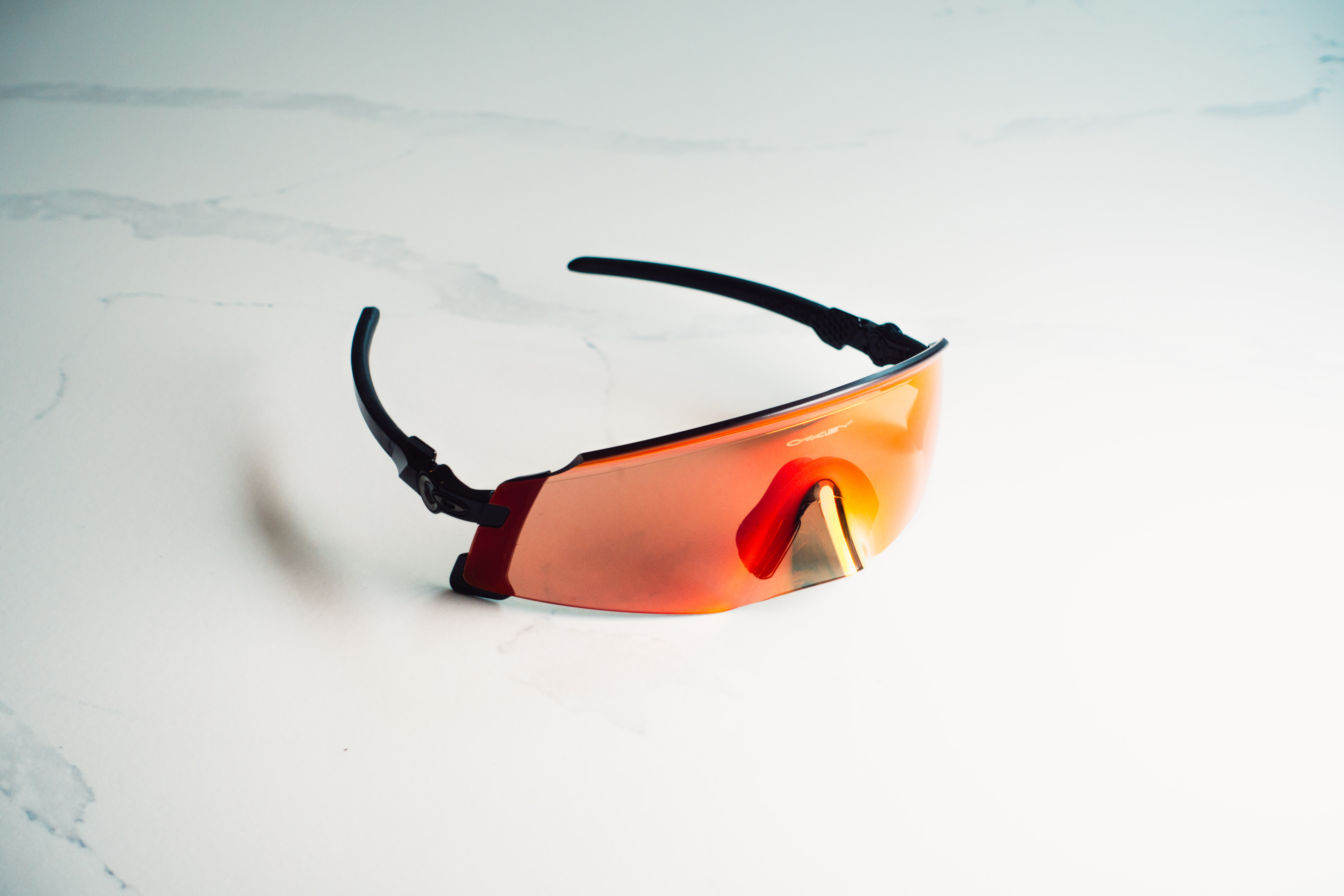
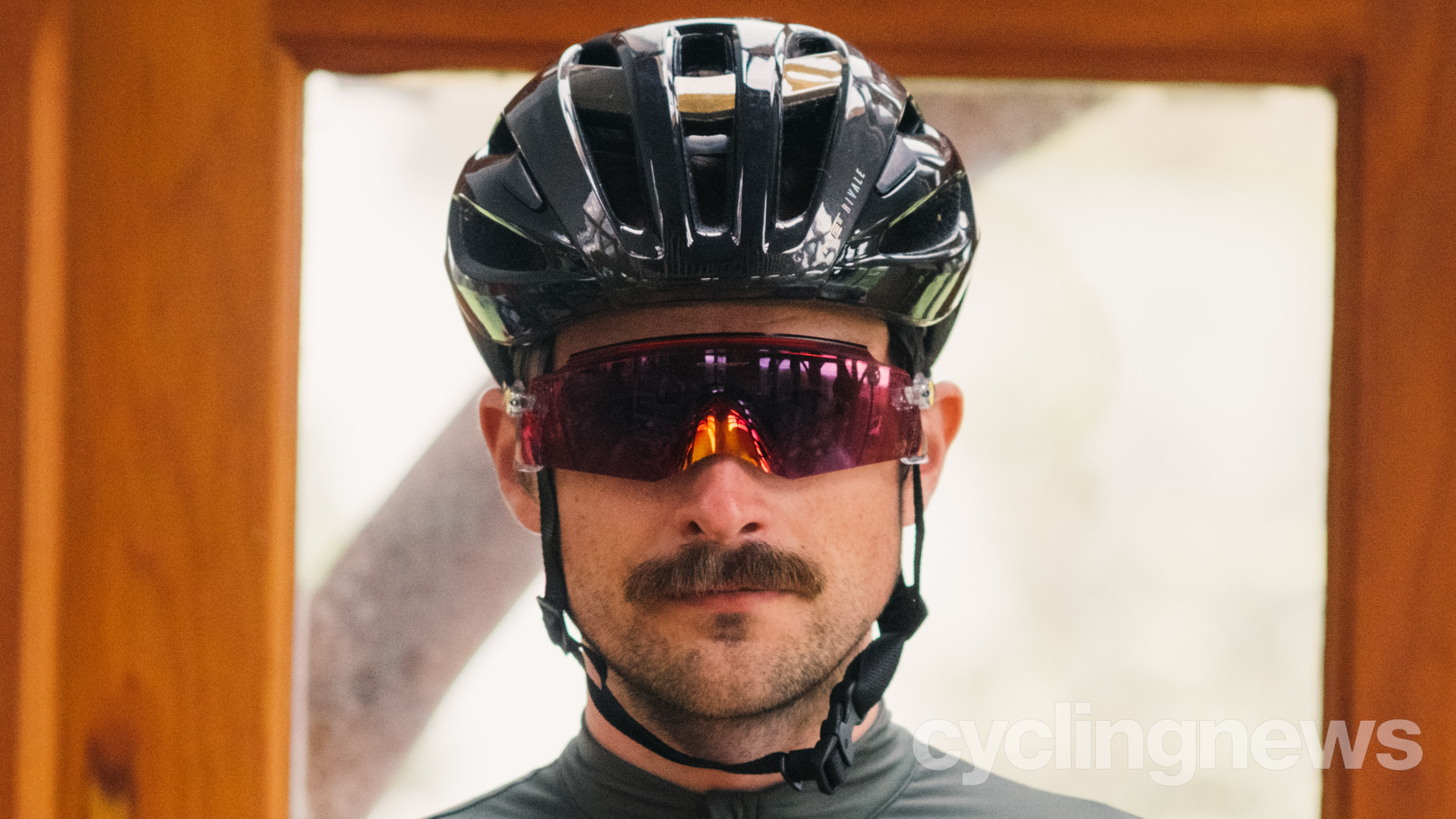
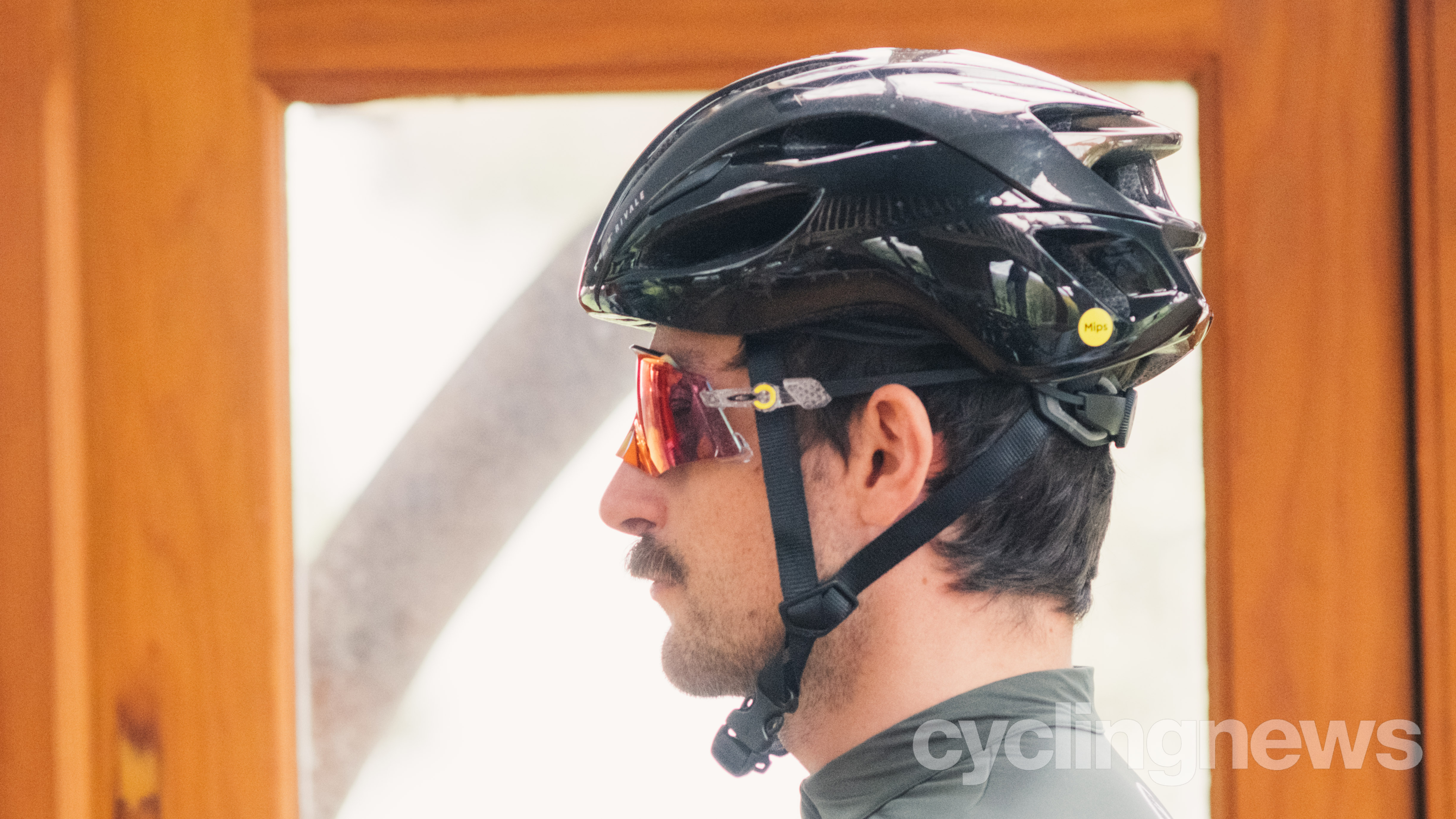
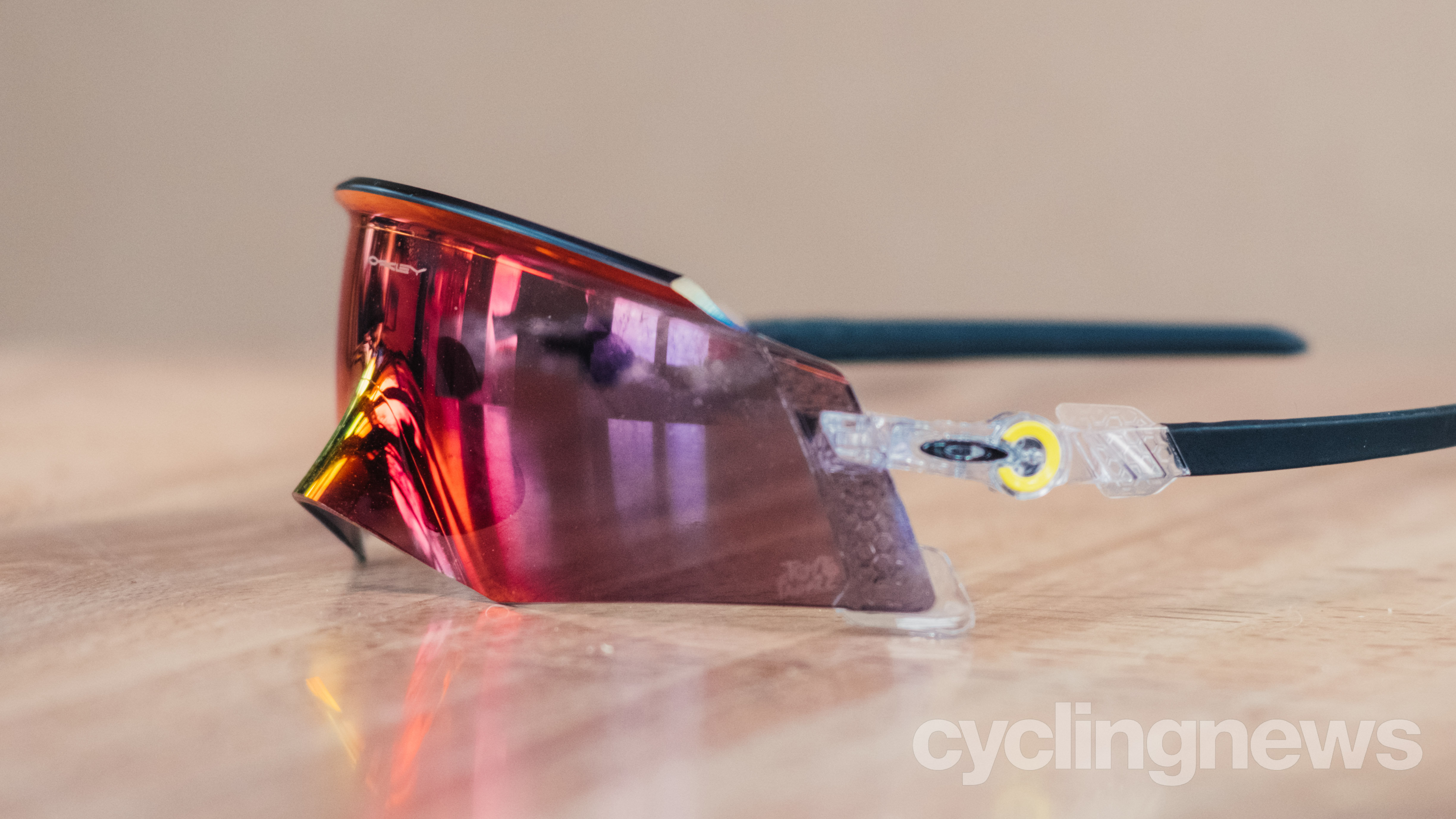
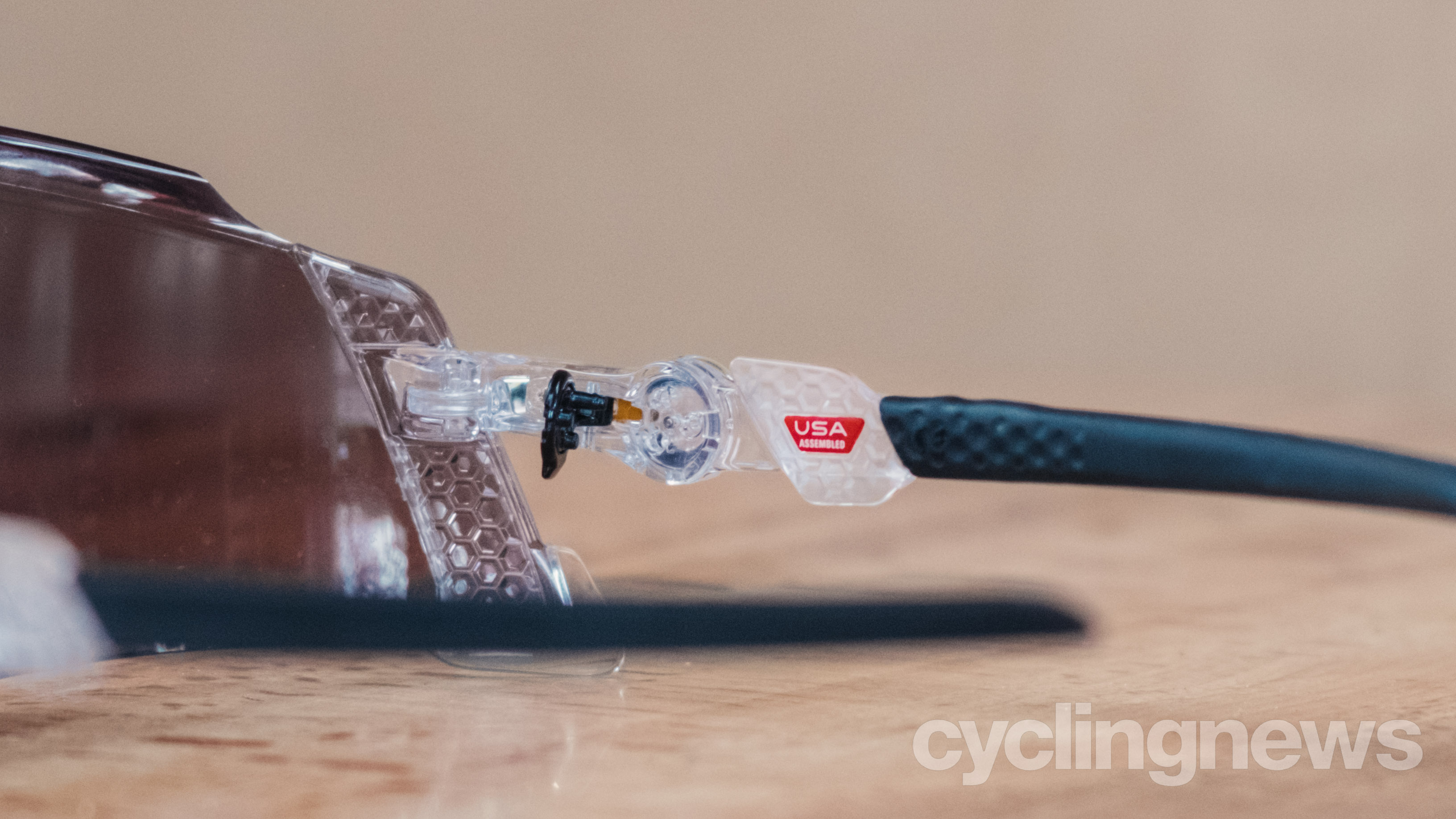
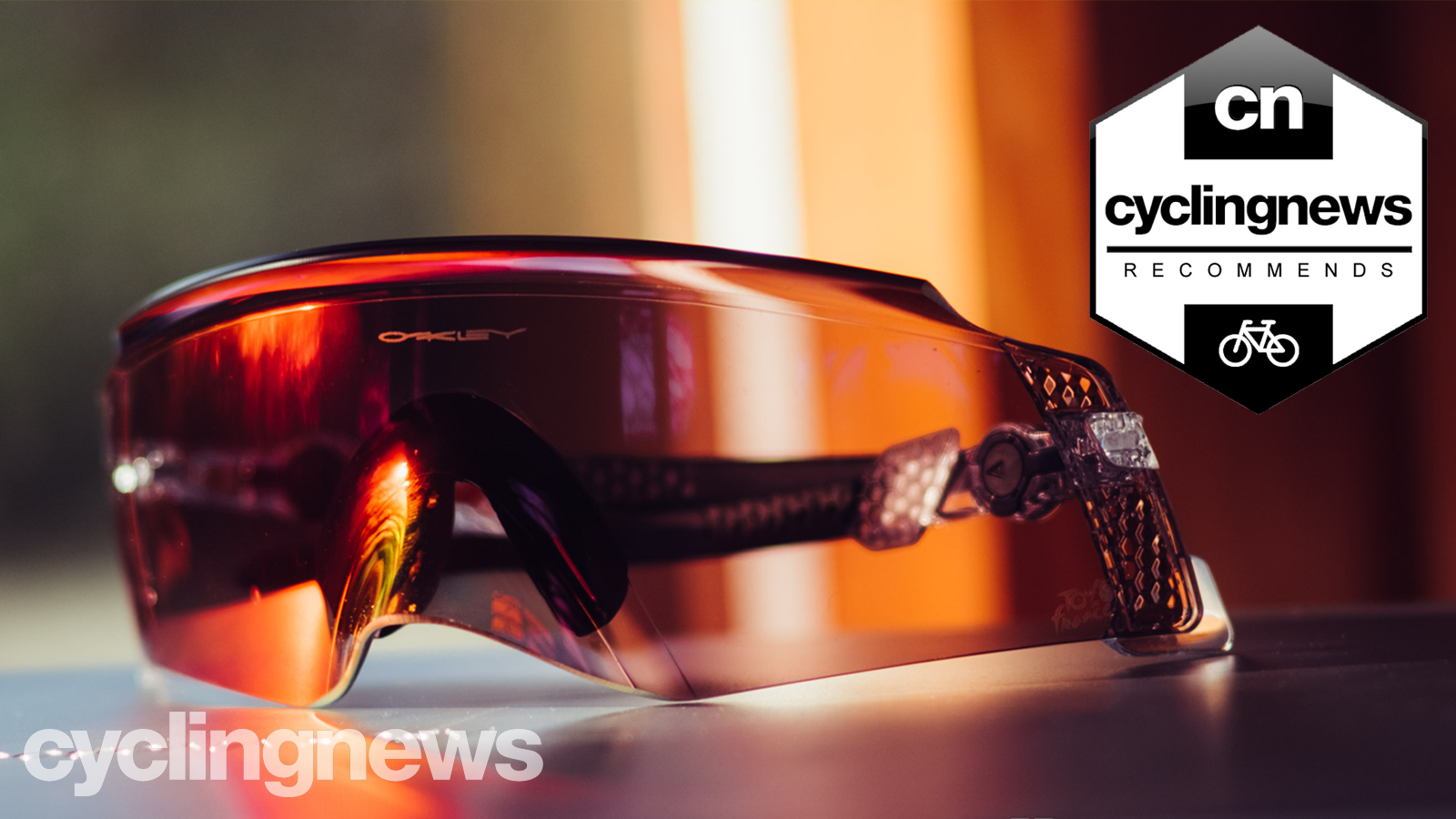
Specifications
Reasons to buy
Reasons to avoid
✅ You want the ultimate performance cycling glasses: These are a truly performance-oriented pair and the field of vision is second to none.
✅ You want glasses that will make you stand out: The bold wraparound design and oversized lens are sure to turn heads.
❌ You want glasses that are easy to pack away: The aren't any hinges, so the arms don't fold away, which makes them a bit awkward for day-to-day use.
❌ You want glasses that you can wear off the bike: These are radical-looking glasses that are really only suited to wearing with a helmet.
I think any fan of pro cycling is lying to themselves if they say they don't enjoy a bit of 'pretending to be a pro racer'. Whether it's sprinting for town signs or dressing the part, it's very much part of the fun, and while the Kato wasn't my favourite pair of cycling glasses, they are used by a great swath of the peloton and have found particular favour among the sprinters.
The wrap is enormous, meaning they have a peripheral vision only really matched by the equally wrapped Poc Propel. The Prizm Road lens is just as brilliant as it is on any other model, though around the nose shield, there is a small bit of distortion.
The lens takes some adjustment; because of the nose shield, you need to adjust the rake angle of the lens so the gripper, and not the lens itself, sits on your nose. It's fiddly, but once it's done, it's fit and forget.
My main issue with the Kato is that they're very breezy. I sometimes found my eyes watering on long, fast descents, and so if you are torn between these and the similar-looking Encoder, then I suggest the latter.
However, aesthetics are a big part of cycling glasses, and if these appeal to you then they are still a decent set of shades, and won't let you down, especially if they make you feel like Jasper Philipsen.
Check out my Oakley Kato sunglasses review for more details.
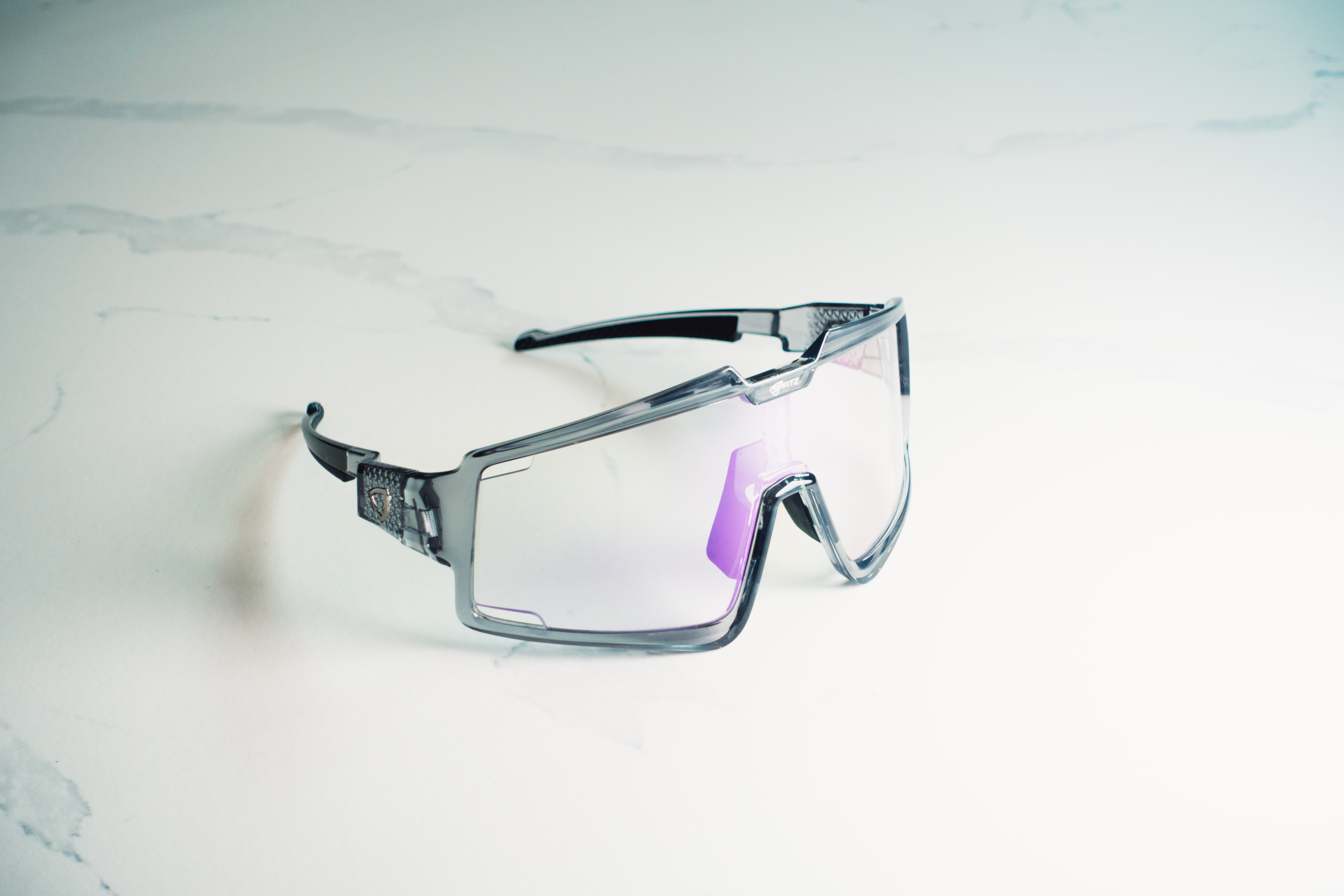
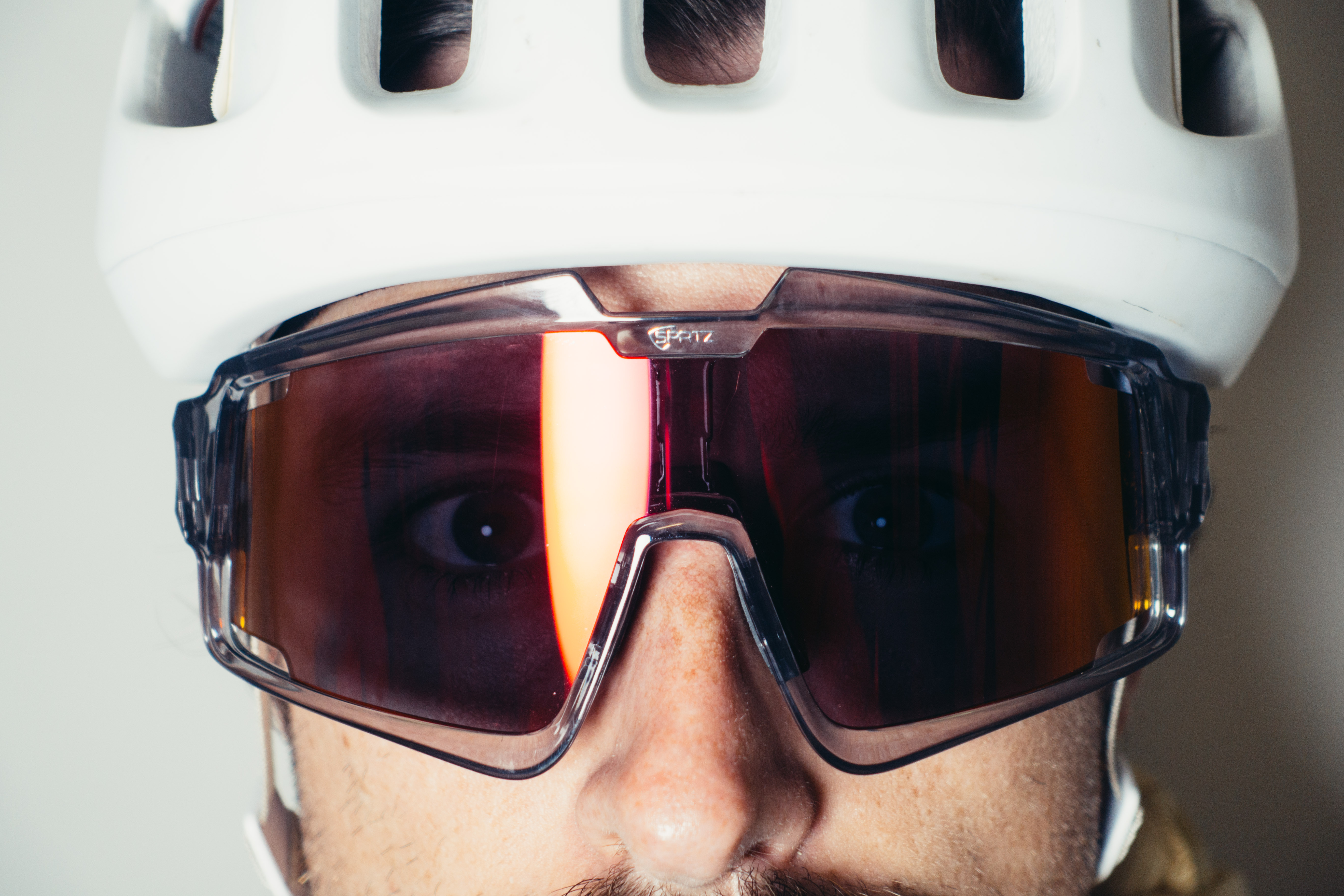
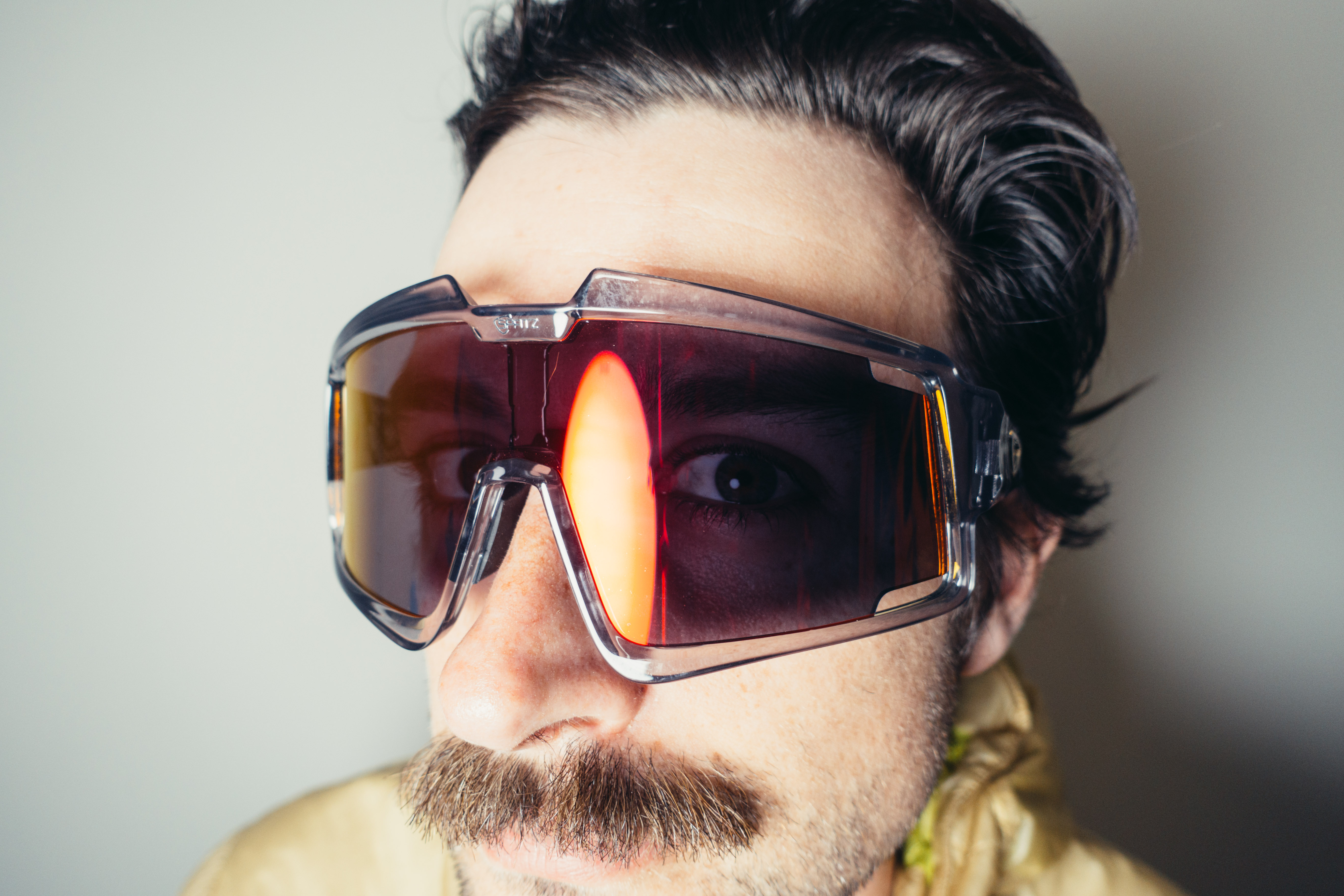
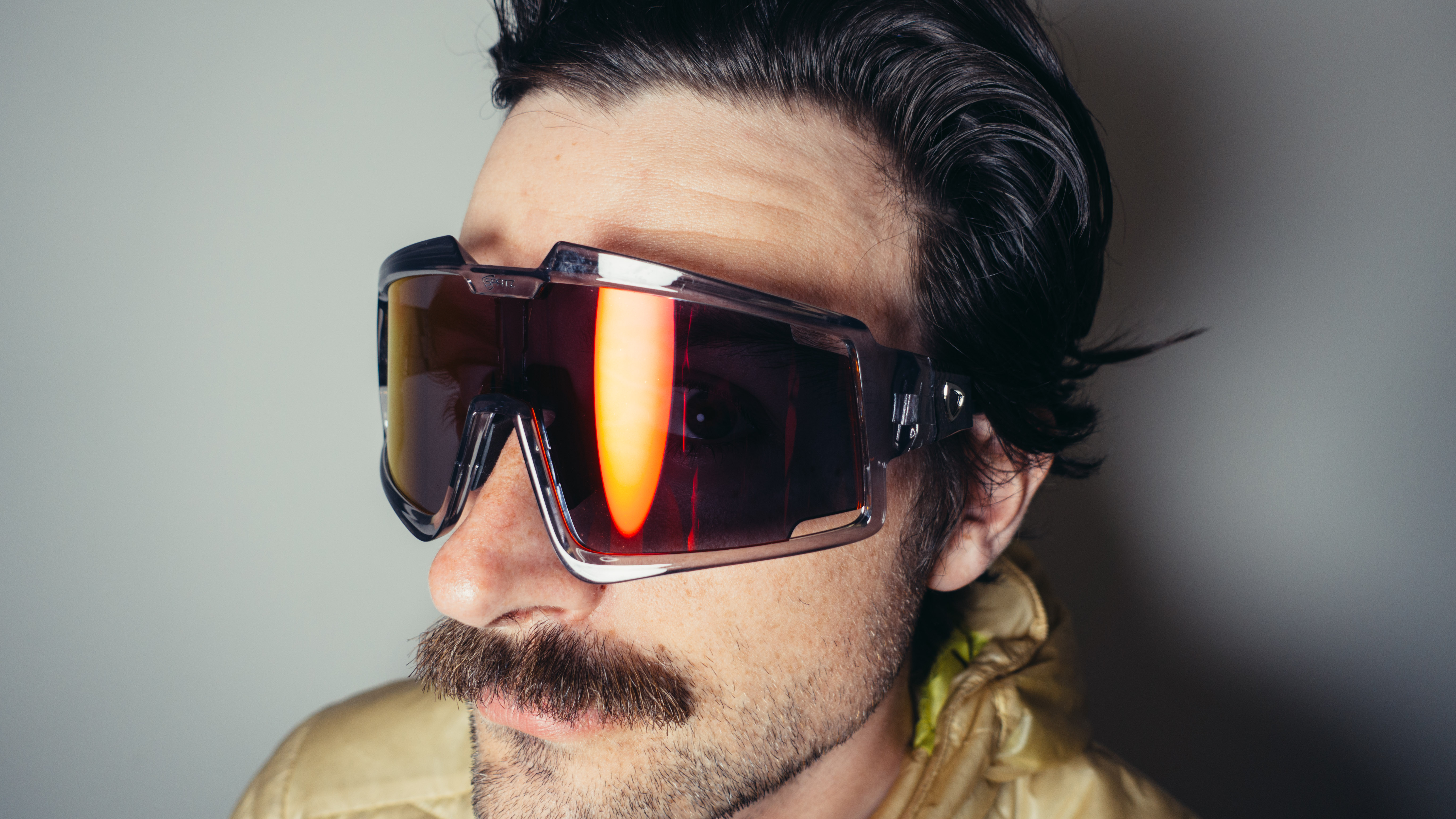
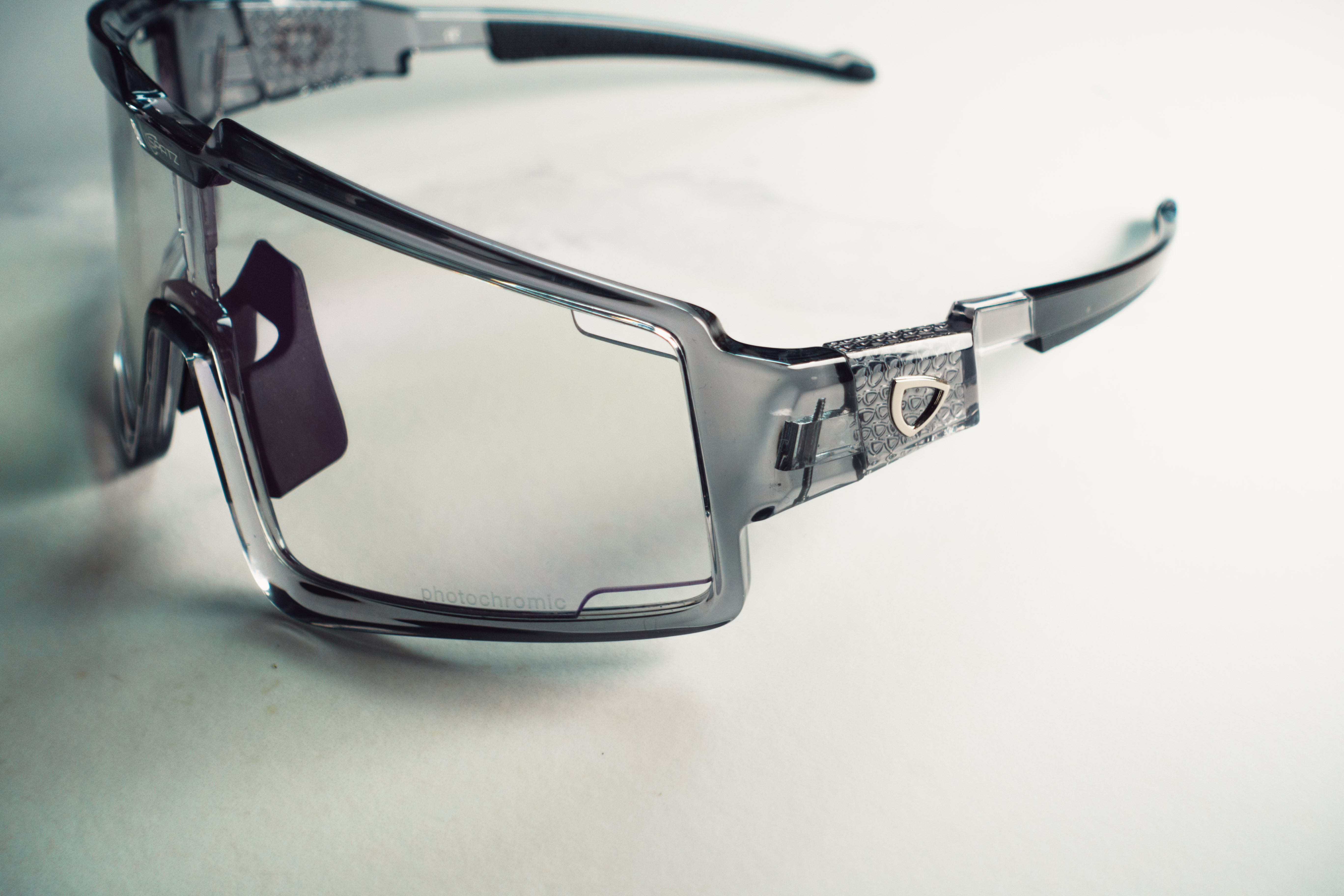
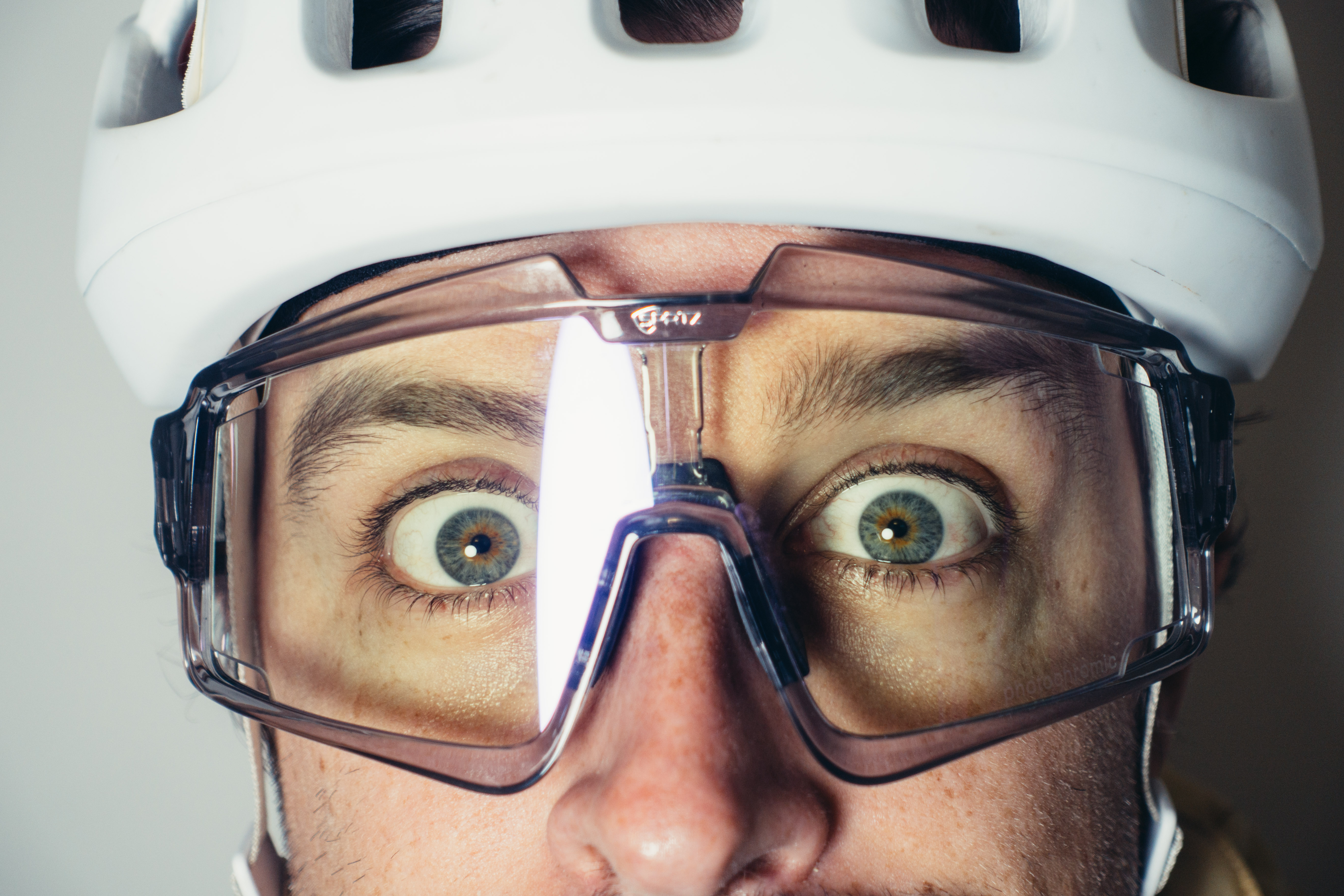
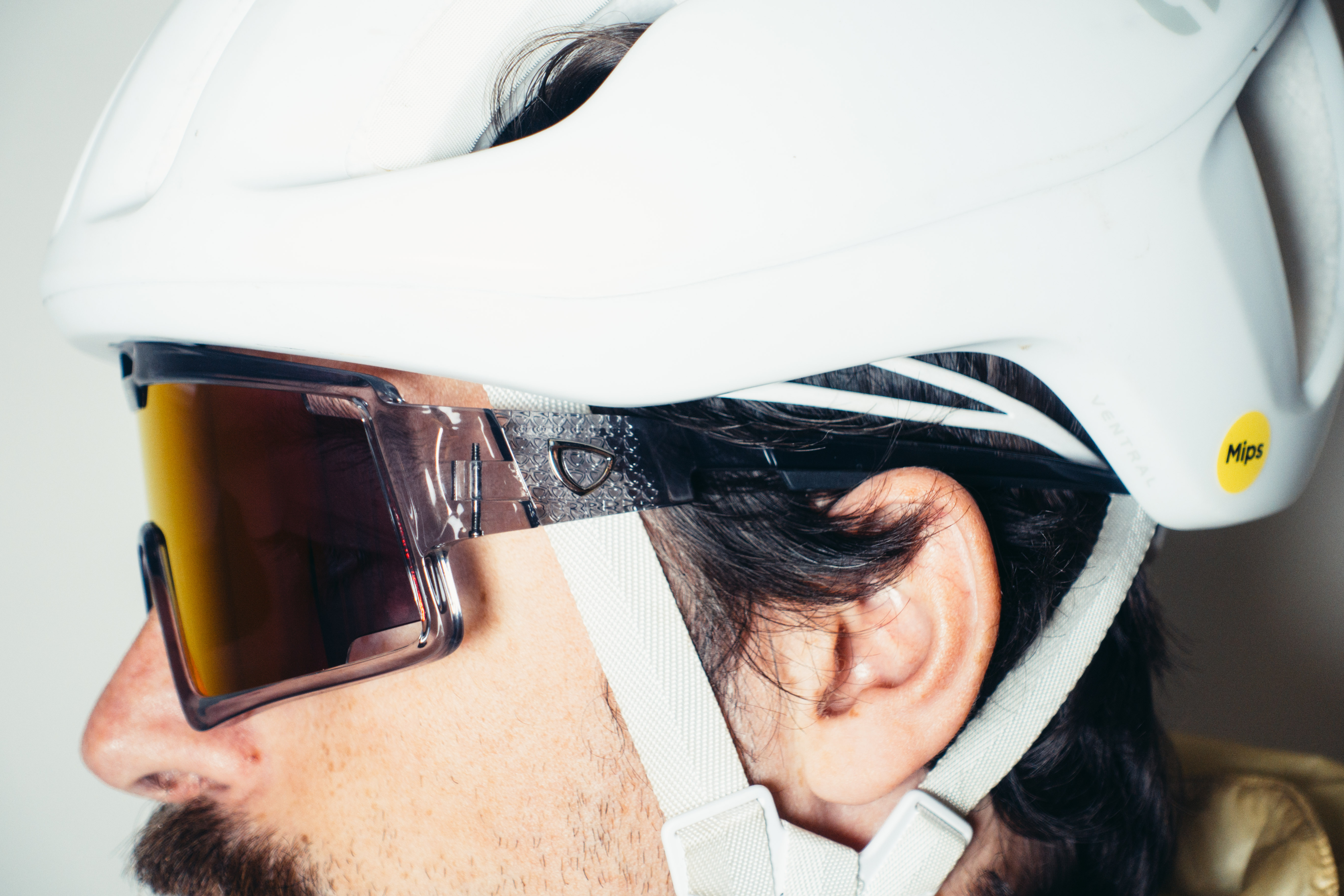
Specifications
Reasons to buy
Reasons to avoid
✅ You want maximum protection and quality: With a robust full-frame build and a huge lens, these glasses shield your eyes while feeling solid.
✅ You want glasses that handle any light: These glasses have a brilliant photochromic lens, making it ideal for spring and autumn rides.
❌ You prefer smaller glasses: These glasses are very big, leaving little wiggle room between the glasses and your helmet.
❌ You want ultra-easy lens swaps: The frames are very sturdy, so changing lenses isn’t as quick or effortless as some other glasses.
Normally, I eschew photochromic lenses. Modern lenses are so good nowadays that they feel slightly unnecessary, but the Spatz Shield made me reconsider. Spatz is better known for making overshoes for riding in torrential rain, but it's now expanded into eyewear, and I'm happy to report it's done so successfully.
The Shield is another very big option, up there with the Demos, and the thick transparent plastic full-frame design means they feel extremely sturdy. This, combined with the thick arms at the temple, makes them the most solid feeling of any I've come across.
So good is the Photochromic lens that I haven't bothered using the included Iridescent Red option. The red lens looks to be a pretty standard affair, but from the brief tests I've done, it does lack the contrast of top-tier options. If, however, you want a lens that changes with the conditions, then this is the pair to opt for.
The photochromic lens has a subtle purple tint that, when they are fully transparent, just takes any edge off things, and feels a little like those blue light-blocking glasses. It's subtle, but when it's overcast, it makes a difference and will stop you squinting.
While massive, they do sit quite far from the face and do get a little breezy, but not to the point it becomes a real annoyance. The lens swap too, isn't the easiest, mostly as the frames are so sturdy, but it's far from a pain too.
To find out all the ins and out of these, head to my Spatz Shield sunglasses review.
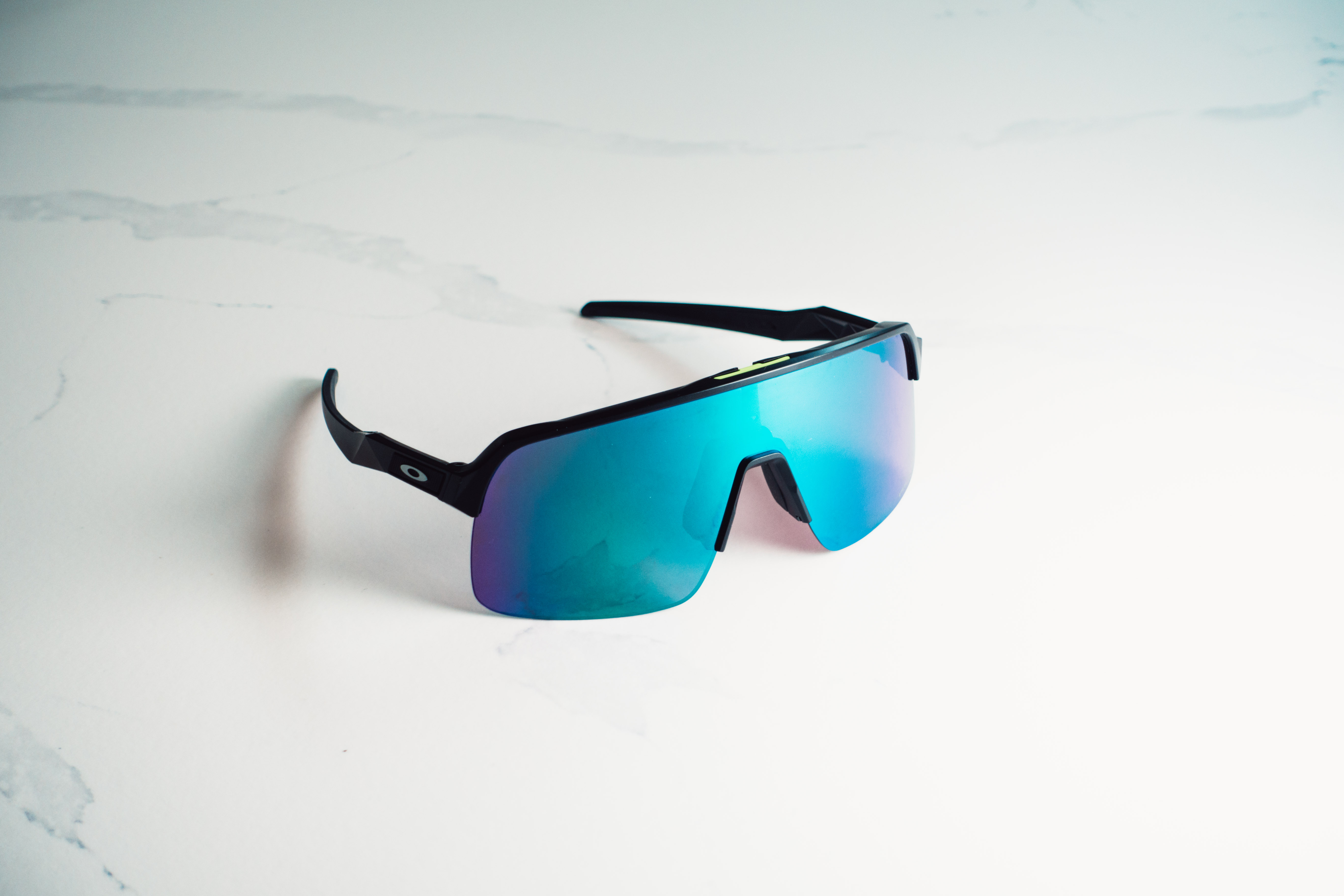
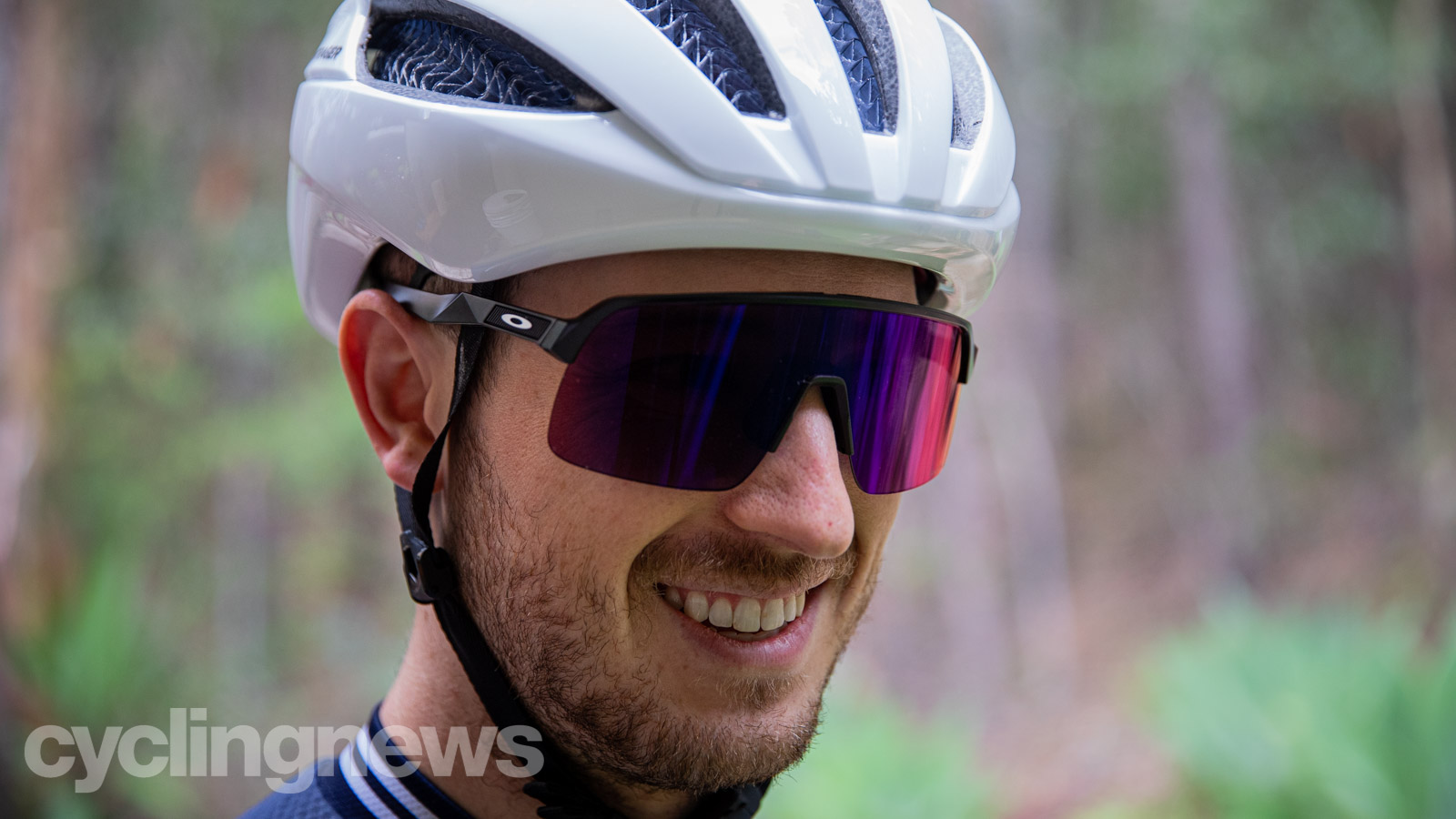
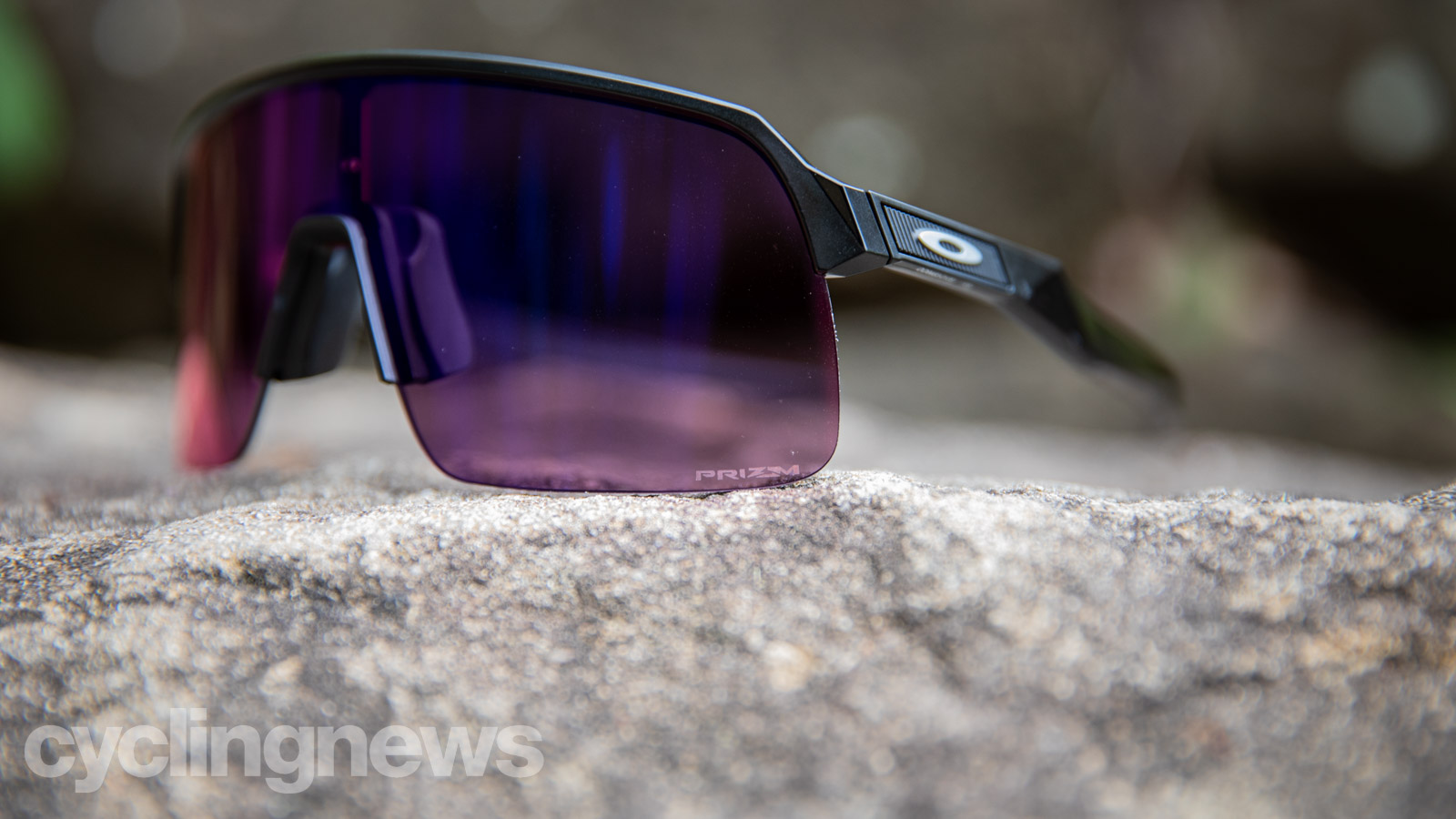
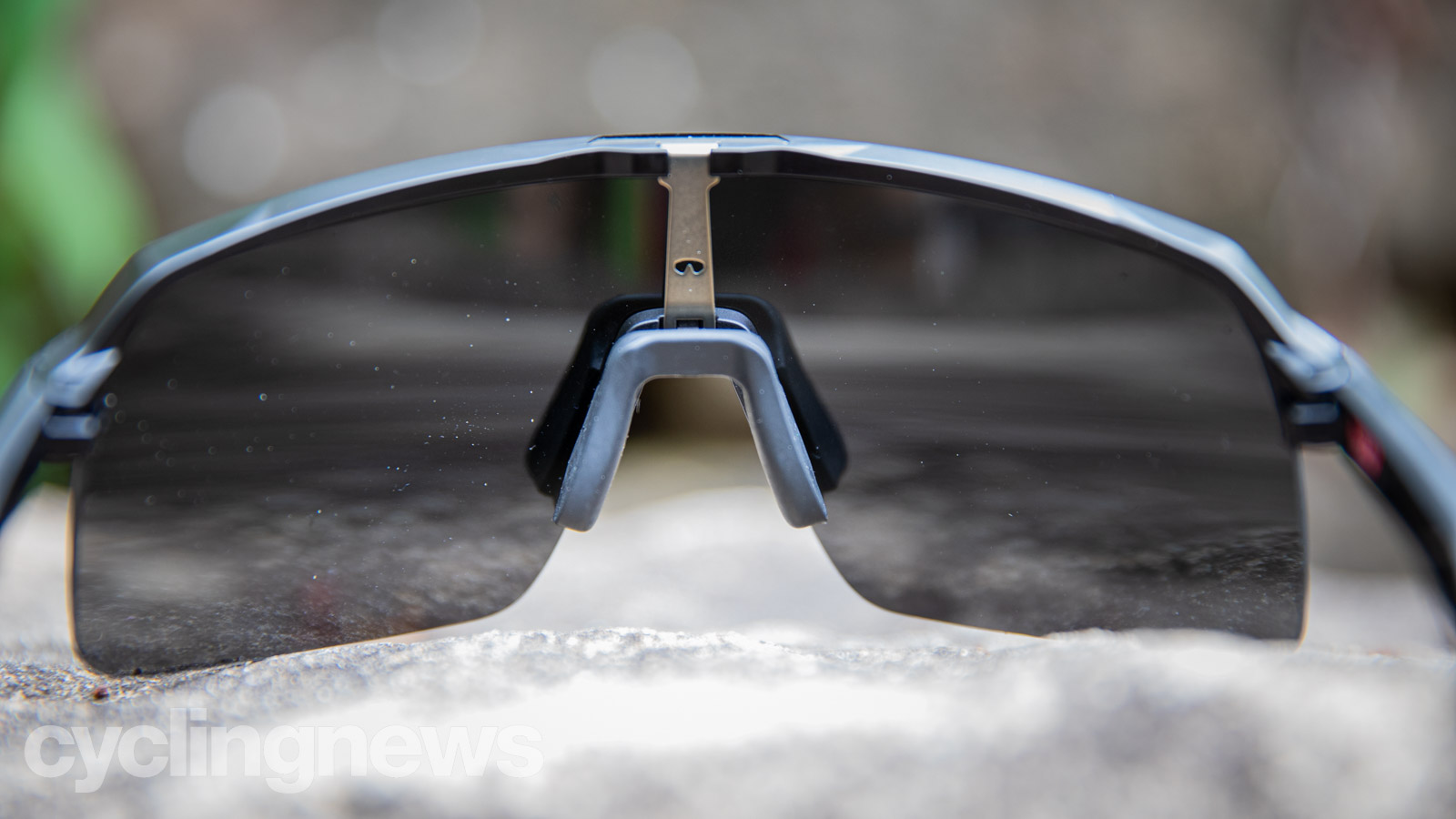
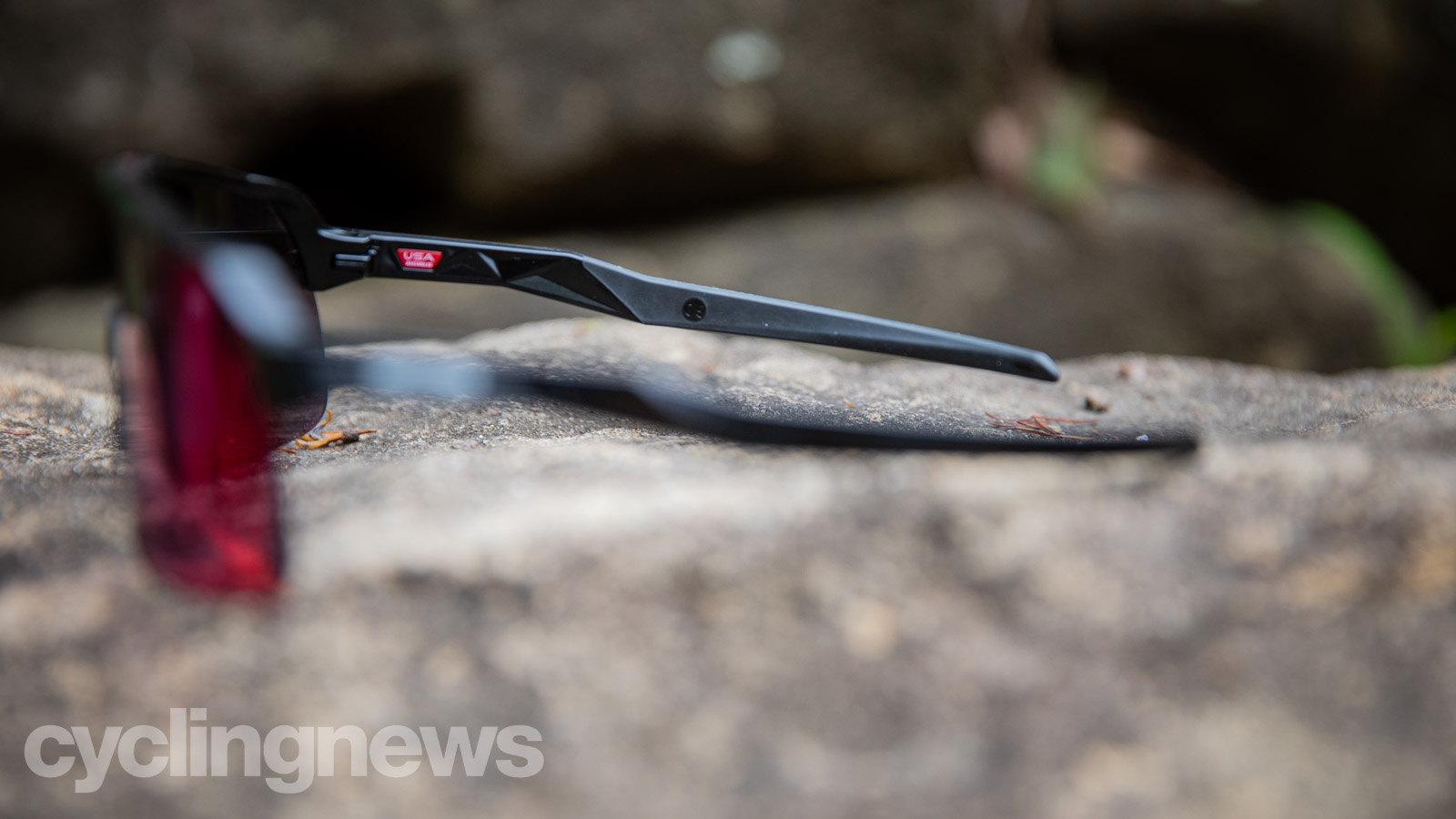
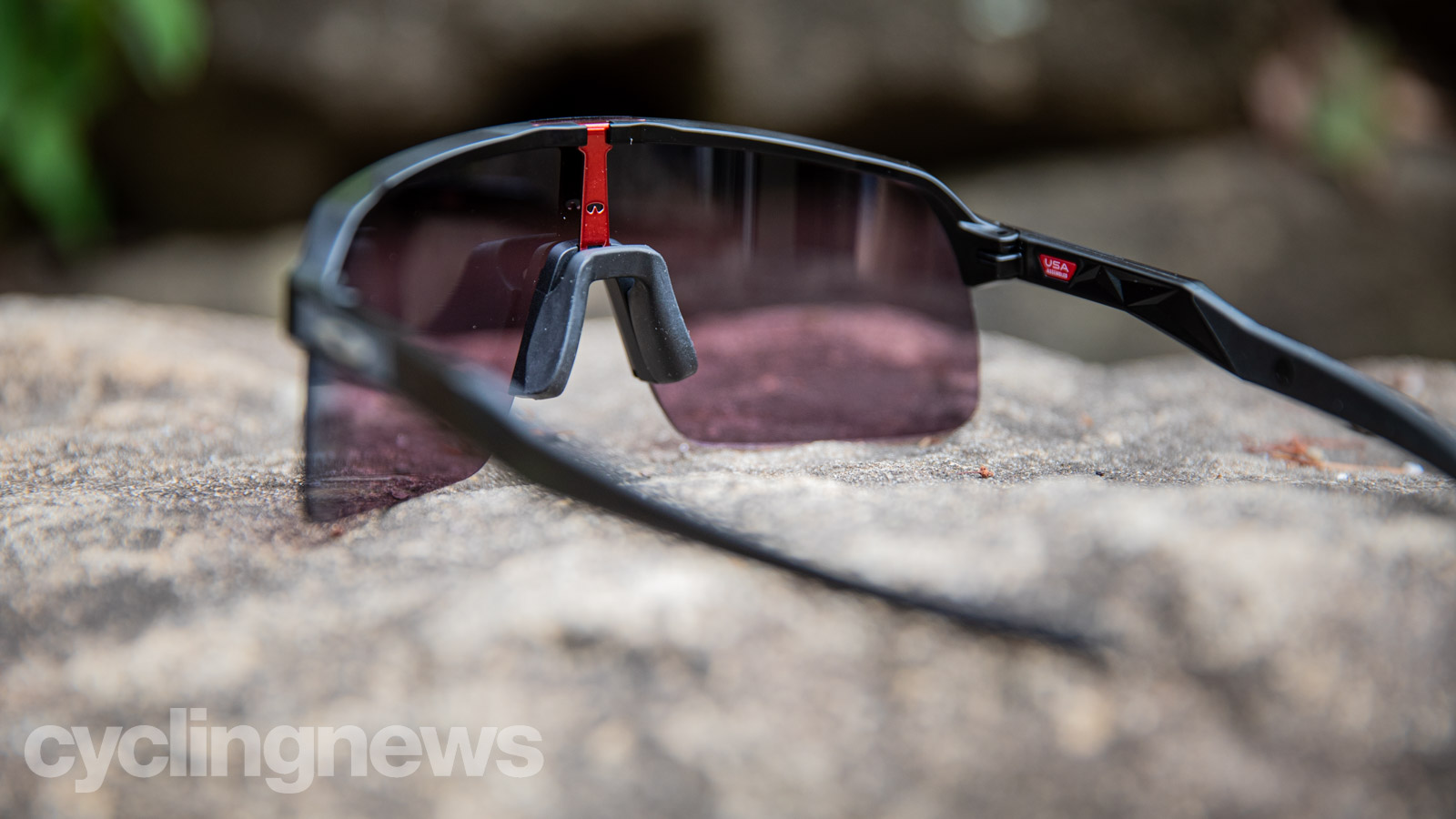
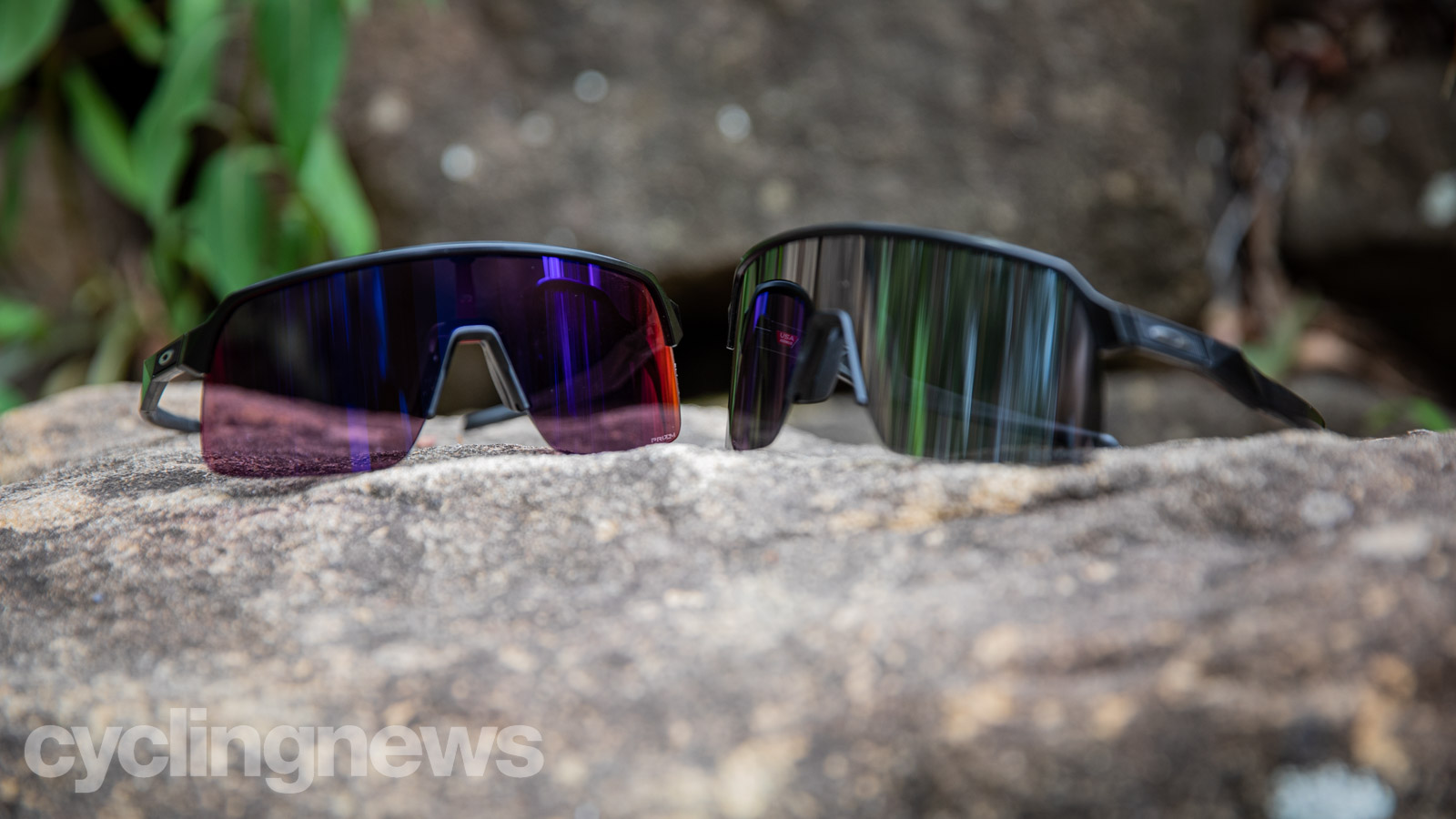
Specifications
Reasons to buy
Reasons to avoid
✅ You want glasses that stay securely mounted to your face: Oakley has applied its Unobtainium to the inside of the earstocks, providing excellent grip on a range of surfaces.
✅ You want glasses with excellent coverage: The large retro lens offers fantastic coverage from wind and debris.
❌ You want glasses that work with all helmets: The long arms on the Sutro Lite's cause trouble with some retention systems.
❌ You have a smaller head: These glasses have a big profile despite the disappearance of the bottom half of the frame.
While the Jawbreaker set something of a benchmark for cycling performance eyewear, the Sutro, for some time, set the standard for "having a massive lens". While it's not the biggest, smaller than the POC Devour and even the 100% S3, and it offers many of the same advantages, primarily an enormous field of view.
Having used both the Sutro and the Sutro Lite (and the Sutro Lite Sweep), my advice is to go for the Sutro Lite. The Lite, as well as ditching half the frame, also adds arm grippers, and so the retention is drastically improved.
I have a pair with the Prizm Sapphire lens, and while it isn't as contrasty in low light as the Prizm Road option, it's better in very bright sun.
Aesthetically, I think the Sutro Lite is a great look, but they do fall down on some performance metrics. The lack of lens venting is one, as is the inability to easily swap lenses (again, just get the Prizm Road lens, trust me). They sit far enough from the face though, that venting isn't a huge issue. The only real bugbear I had with the normal Sutro was the lack of arm grippers, and the Lite more than fixes this.
They are big, though. If you have a small face, then they may well swamp you, and may also start interfering with the brow of your helmet.
There's even a titanium version too, rivalling the POC Elicit Ti for the bling factor. We've got a full Oakley Sutro Lite review if you want to know more.
Best lightweight cycling glasses
Not just for the weight weenies and those riding the best lightweight bikes, having a truly featherweight pair of cycling glasses comes in handy in far more important ways than just shaving a couple of grams.
Most options are frameless, and in my experience, are a better choice in hotter climates. The low weight is great, but they are generally a little more airy, so they're what I reach for if it's muggy, or if I'm doing a ride with protracted climbs to allow a little more airflow to my face.
The tradeoff is that they tend to feel a little less secure on the face, sothey are less suitable for gravel riding in particular.

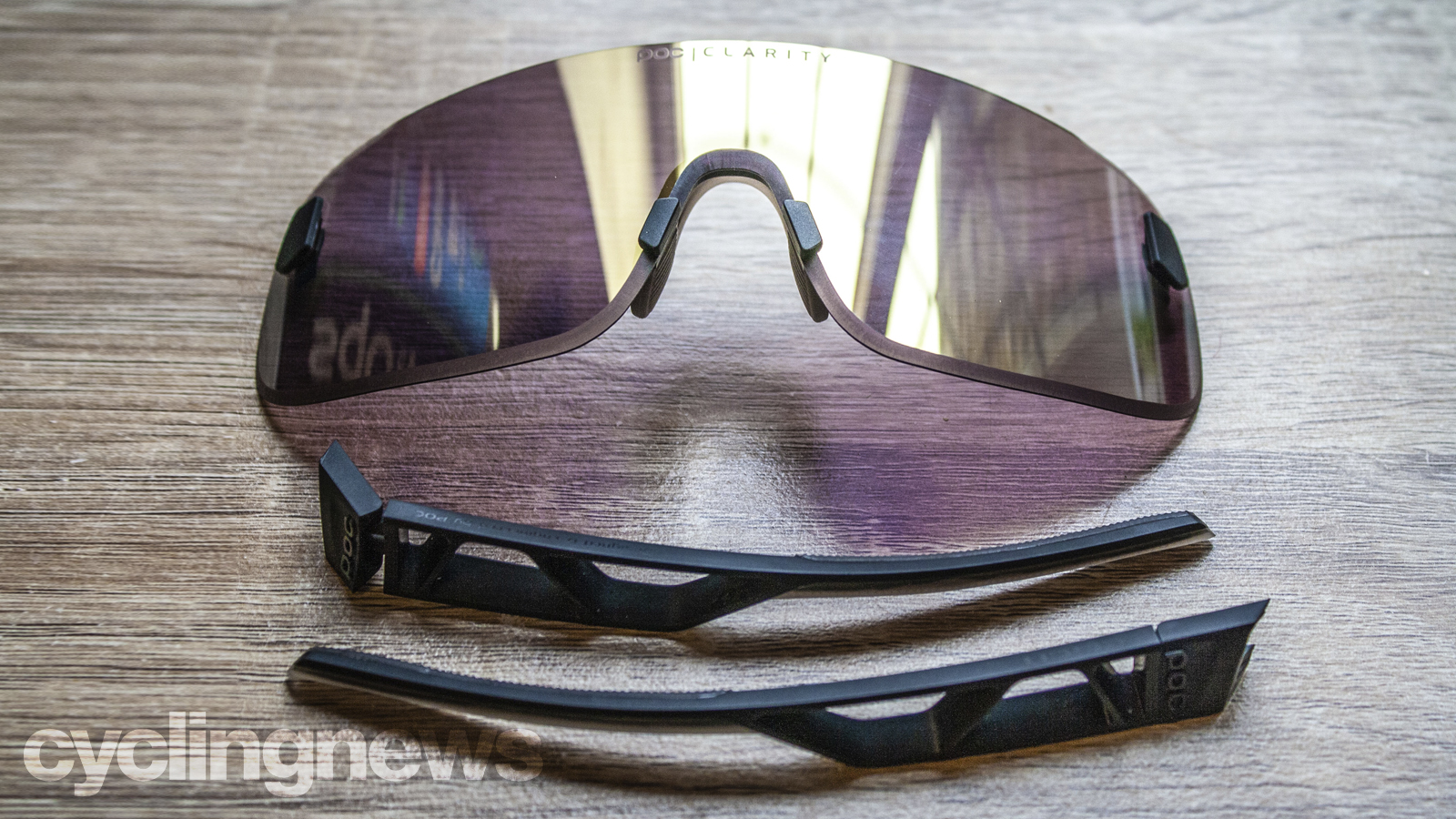
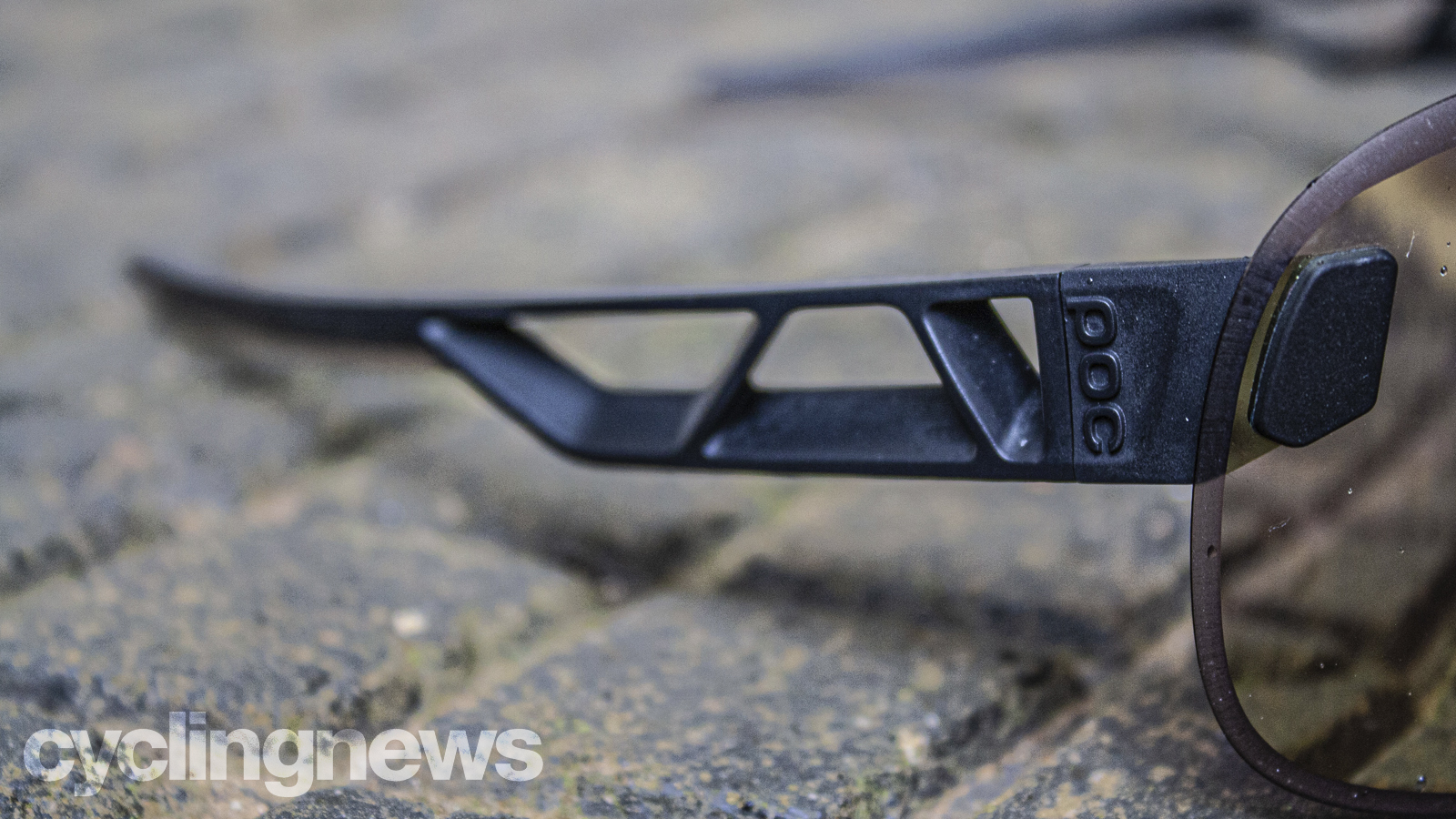
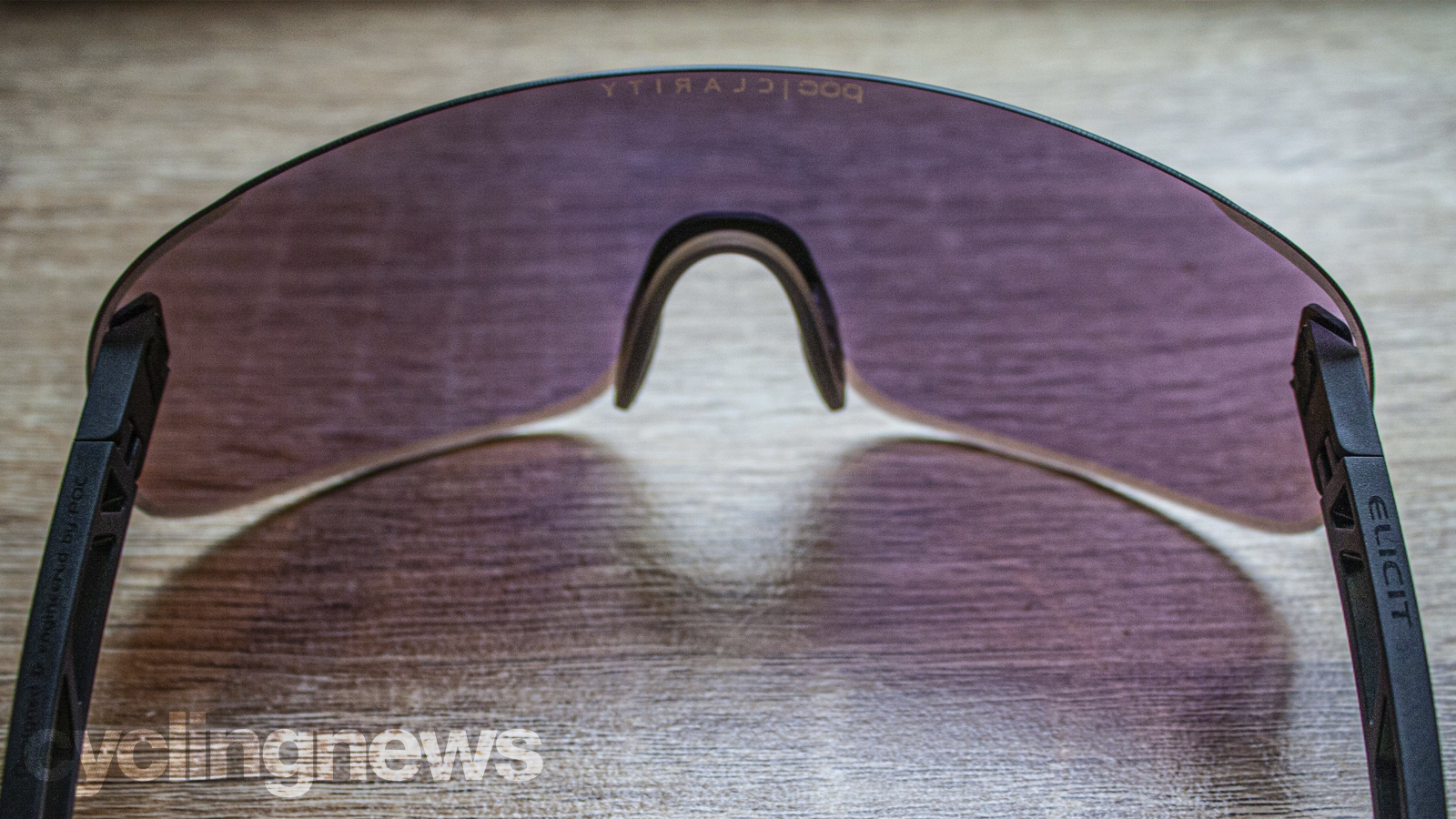
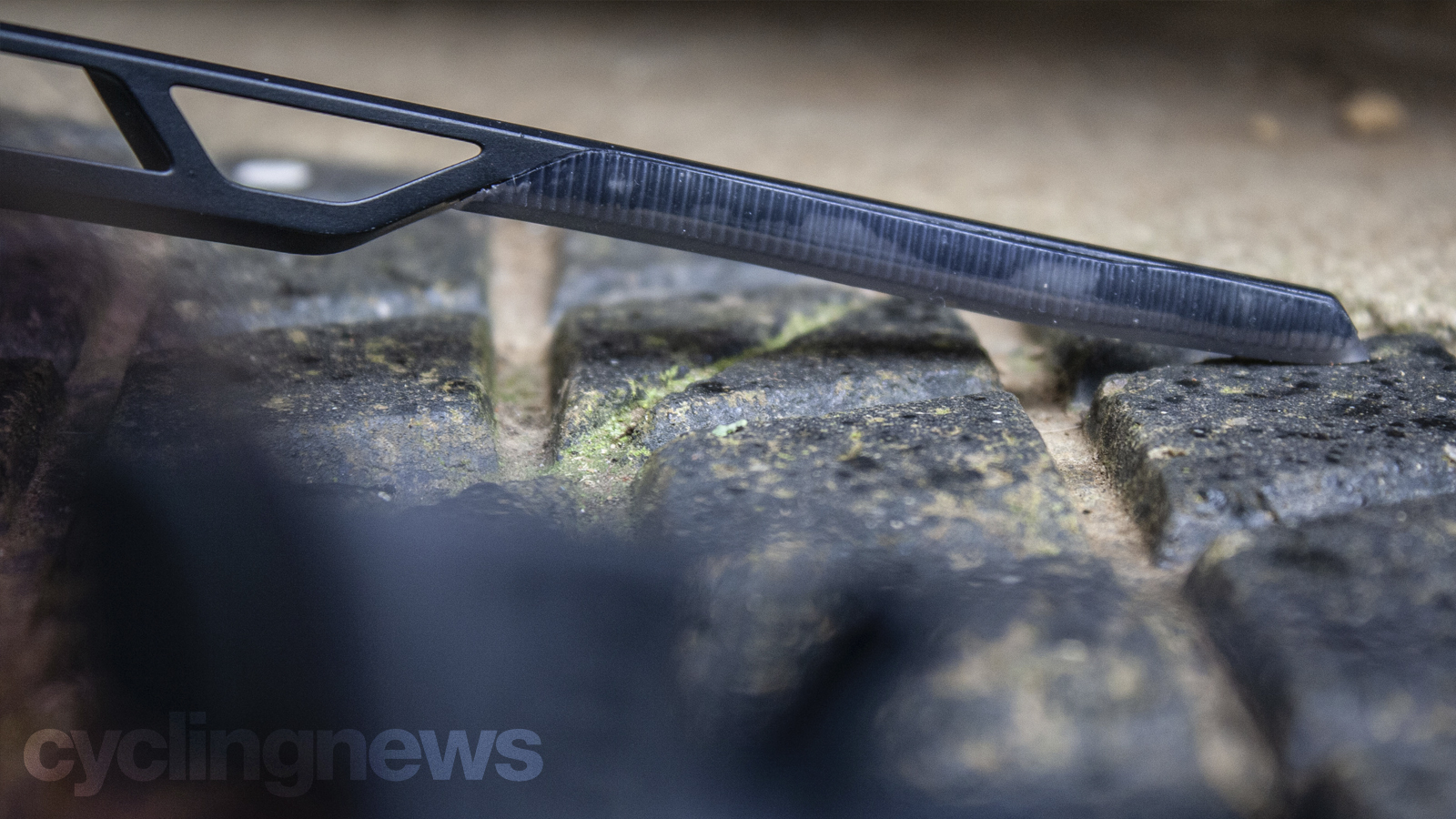
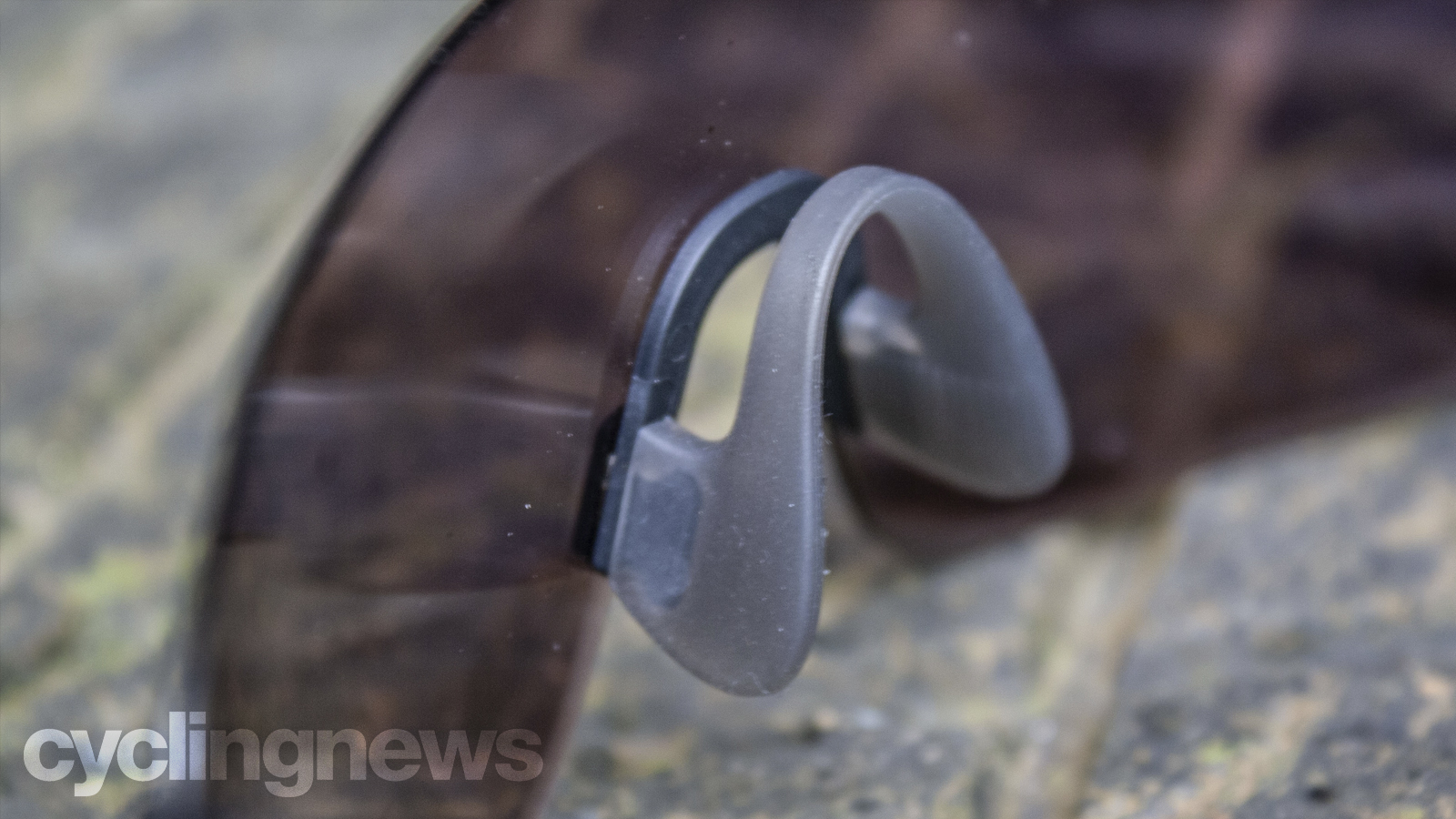
Specifications
Reasons to buy
Reasons to avoid
✅ You want a featherweight pair of cycling glasses with a barely-there feel: One of the lightest pairs of glasses on the market and up there with the best in the business.
✅ You want superb clarity and an uninterrupted field of view: The Clarity lens technology impresses, offering a crisp and unobstructed view ahead.
❌ You're looking for a budget-friendly option: With a high RRP, these are a premium investment, offering high performance but at a steep price.
If you want a featherweight pair of cycling glasses then these are, in my opinion, the best in the business. They're a little more expensive than the Hypercraft from 100%, but the lenses and field of view are better.
As with most frameless pairs the retention isn't so secure as with a frame, so on a small head they feel looser, but they do a good job with quality arm grippers and a replaceable nosepiece. The rounded edges to the lens, along with its size, meaning the edges feel like they almost blend seamlessly into the periphery, adding to the feeling that you're not really wearing any glasses at all.
If you want to go bling then there is a titanium version, and those do grip even better and are lighter, but at least the arms on these plastic versions hinge.
As per the other POC options, the lenses are excellent, though prone to smudging. The benefit for me is that thanks to a large lens that sits far from the face and no frame, they are lovely and airy on scorching days without any real issues letting wind get to your eyes. They don't feel nearly as stuffy as the Aspire, but they also are a little more fragile feeling.
The lens swap is simple, with both the main lens and the included clear spare featuring a socket that the arms simply slide onto. Think of it less as a lens swap and more as an arm swap. Check out our POC Elicit Clarity review for all the rest of the details.
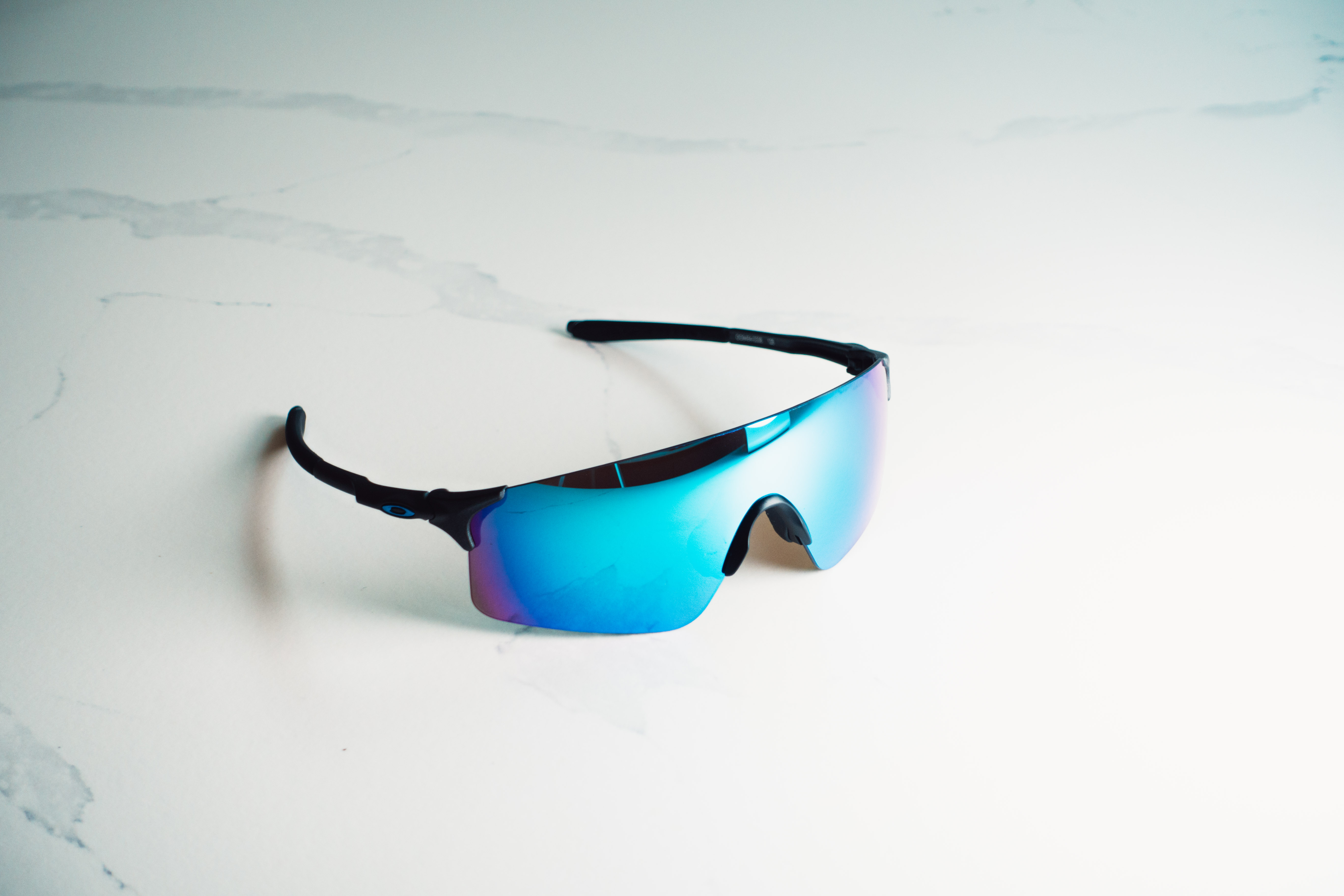
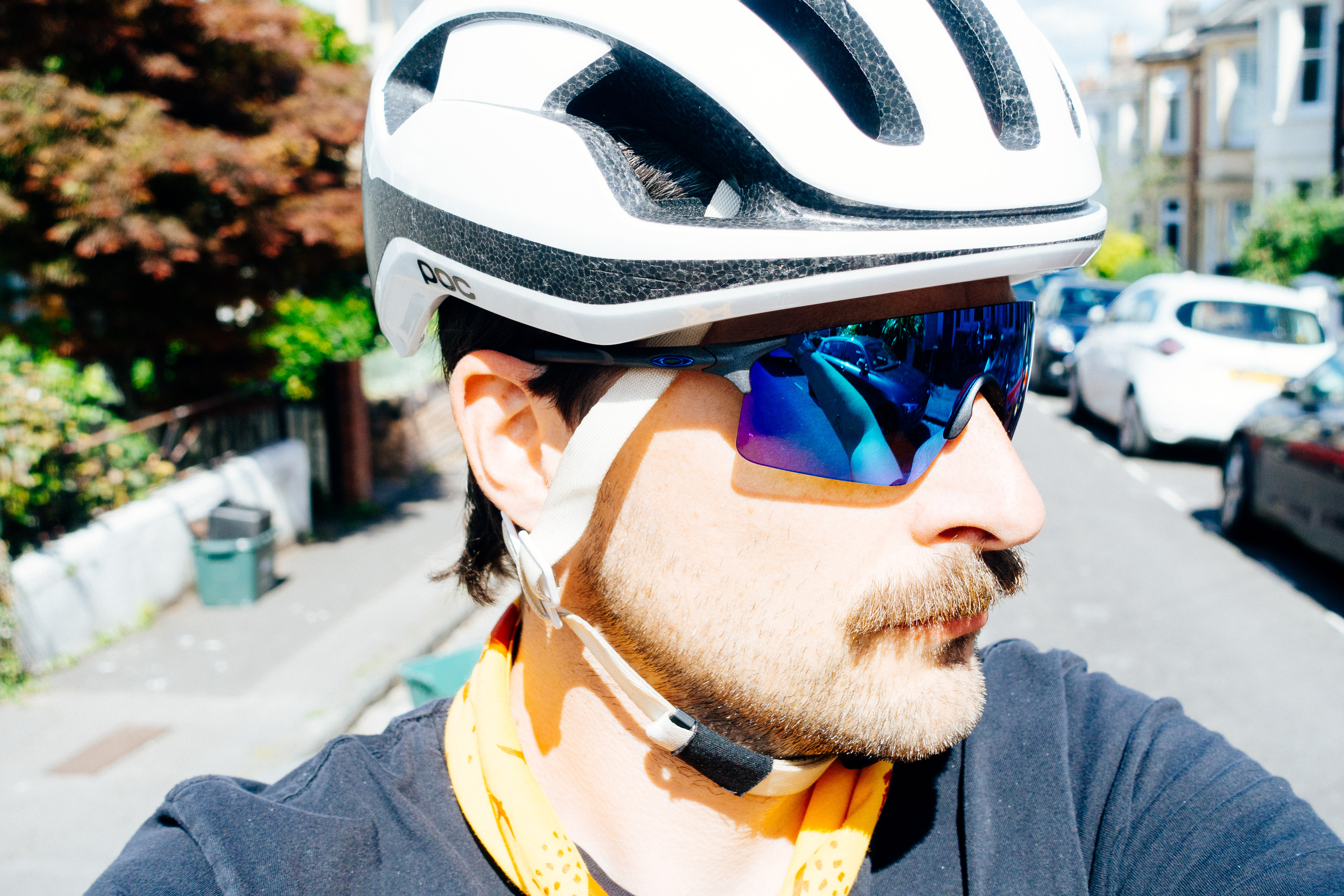
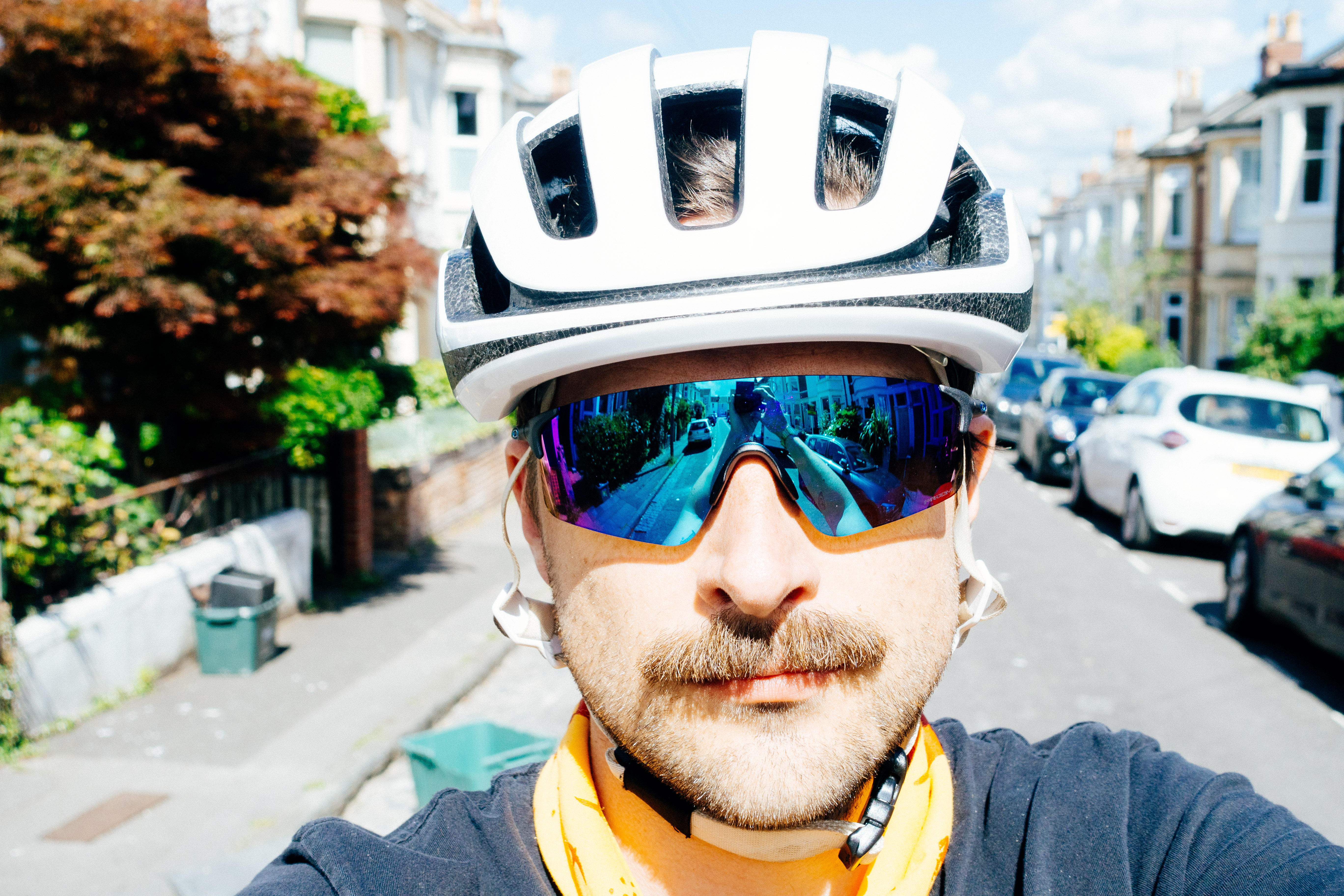
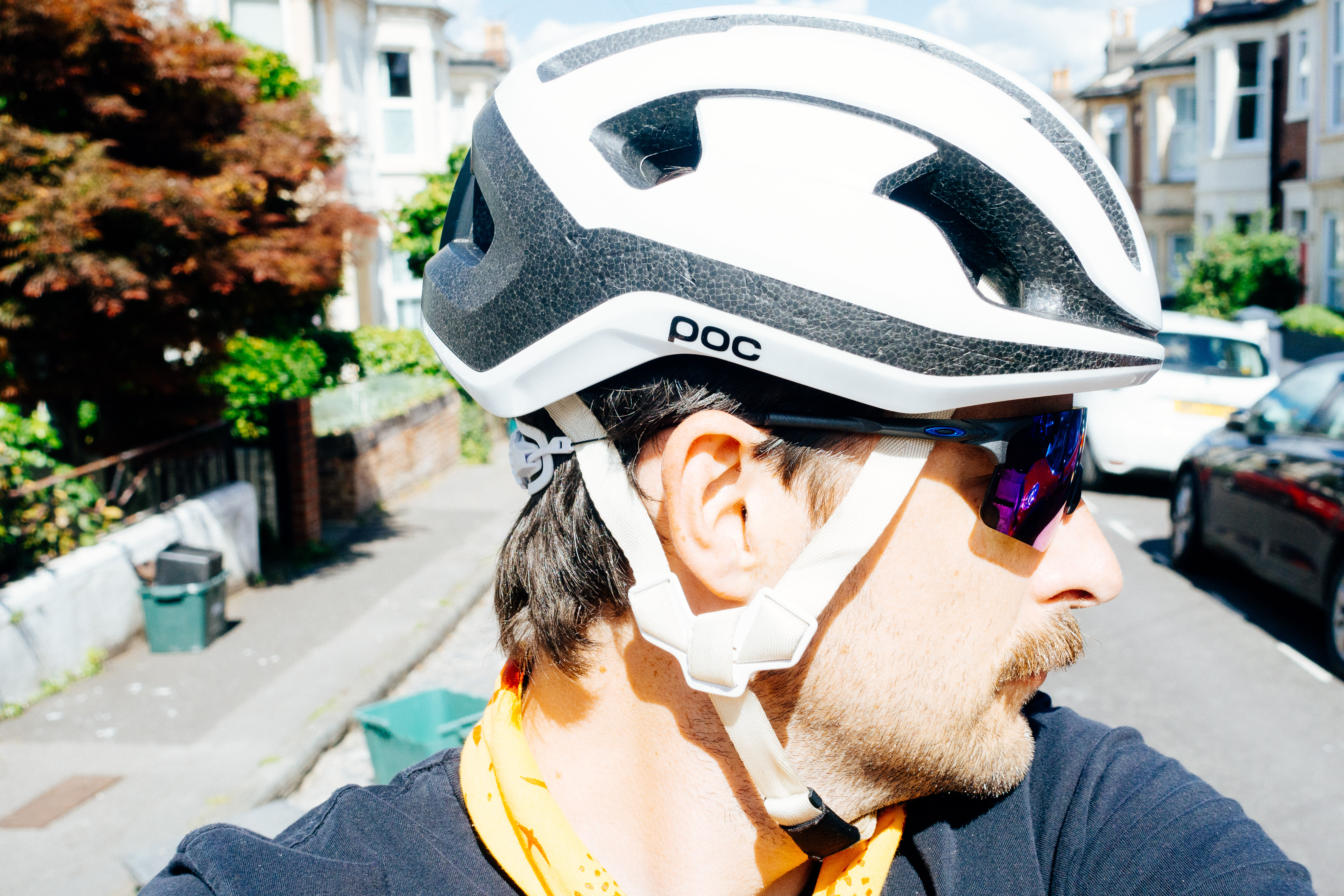
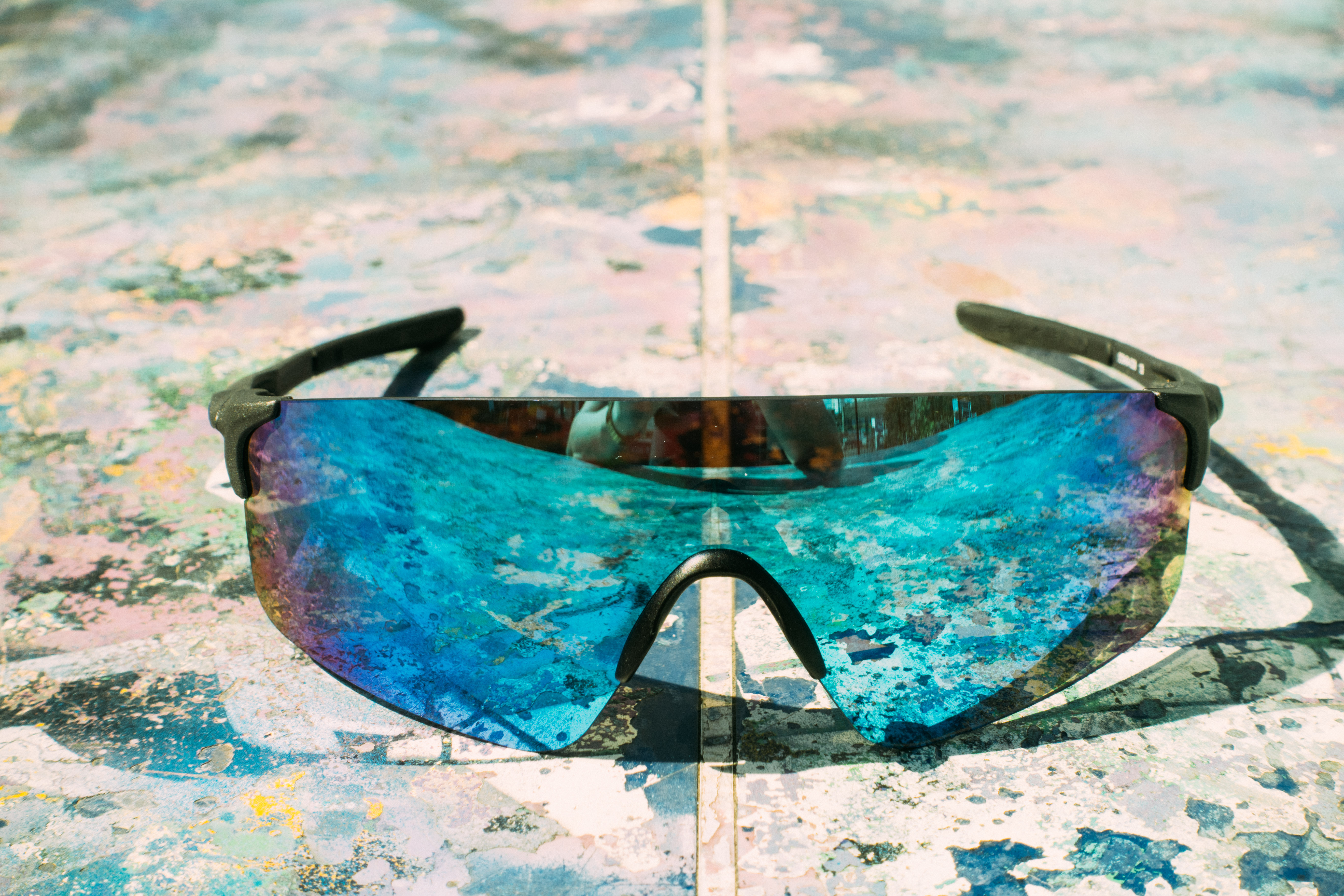

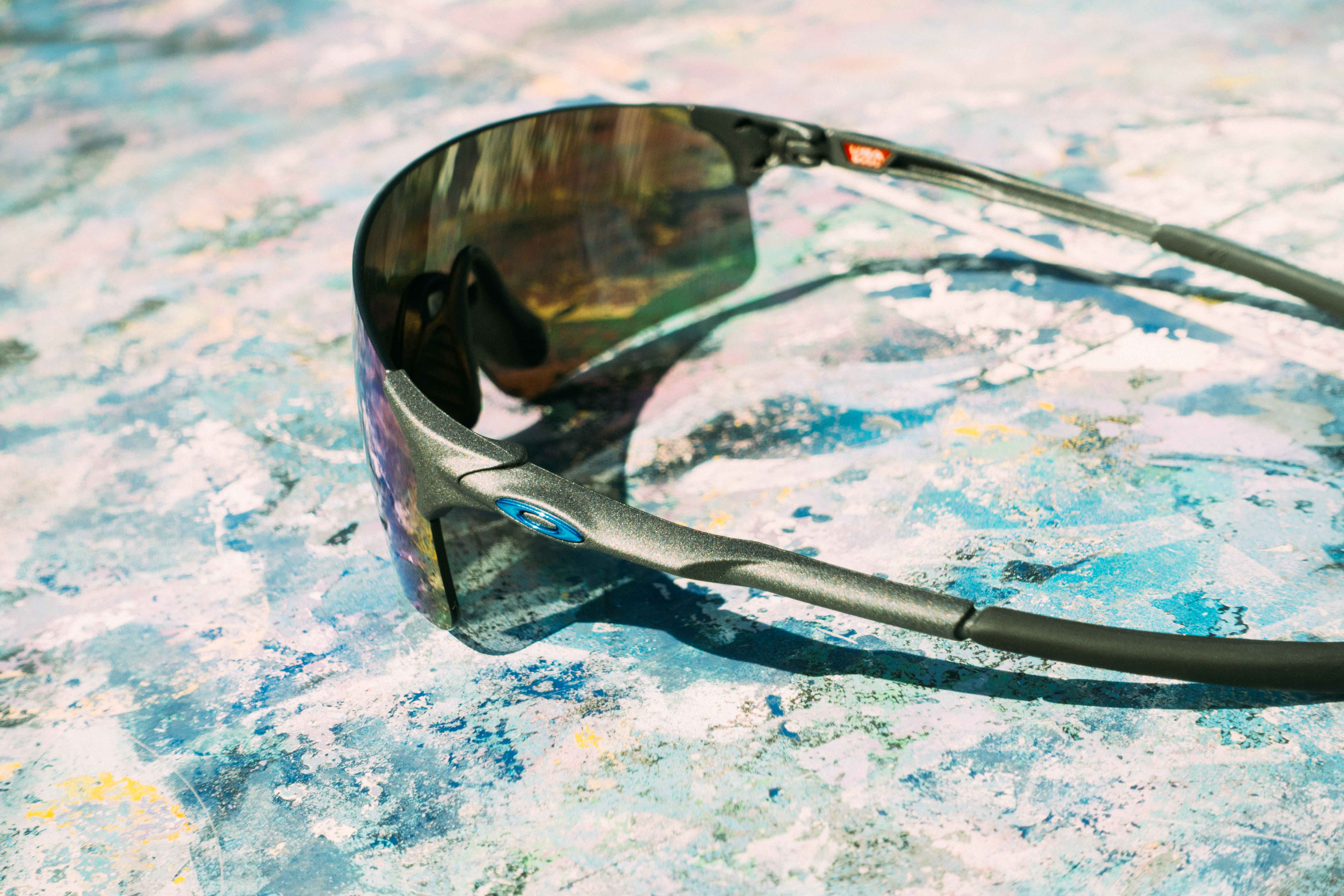
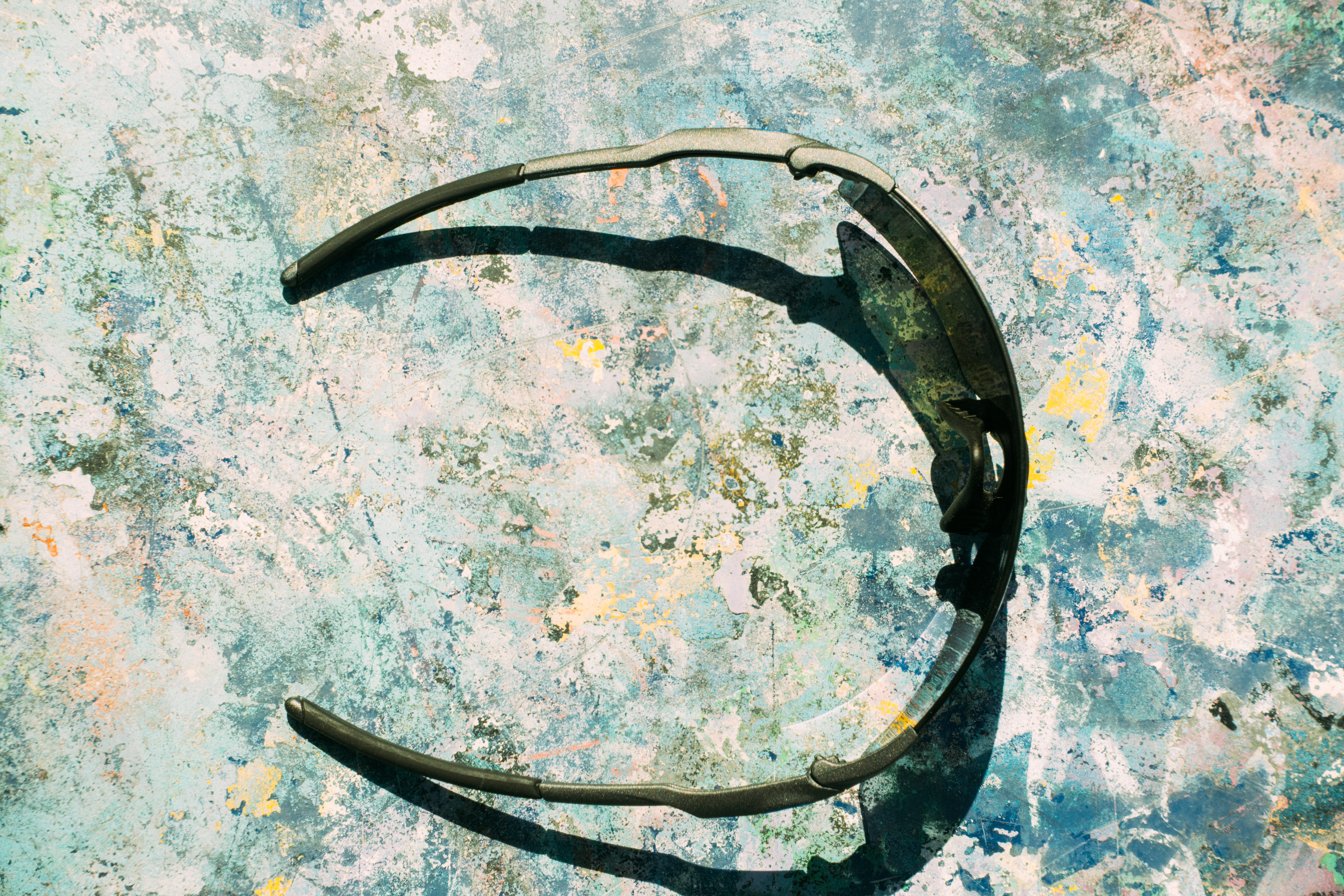
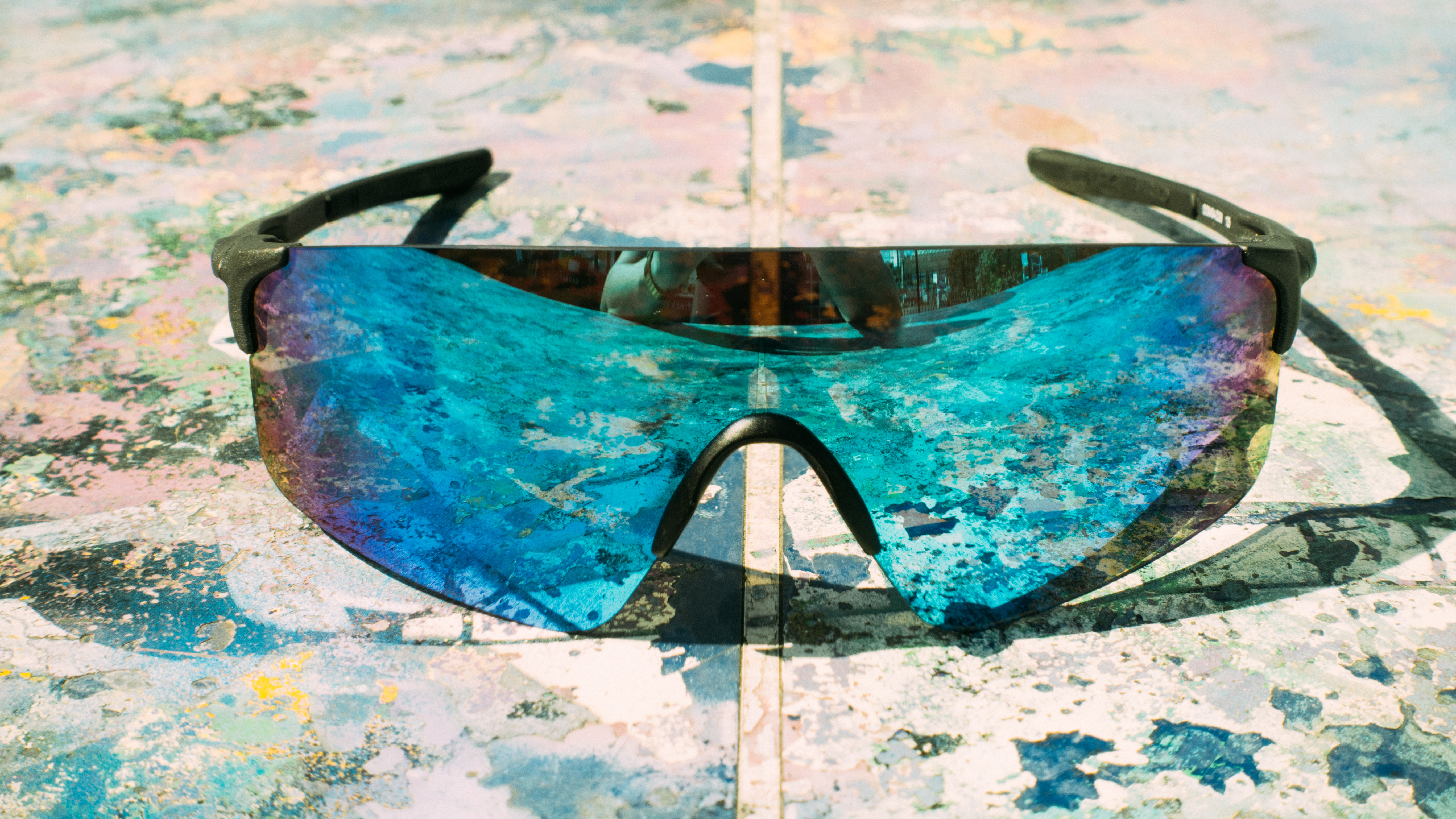
Specifications
Reasons to buy
Reasons to avoid
✅ You have a smaller face and want glasses that fit comfortably: These glasses sit well on smaller faces, avoiding the oversized mirrored wall look of many larger cycling sunglasses.
✅ You want feathery light glasses: At just 21.6g, these are the lightest on test, thanks to their small size and frameless design.
❌ You're in the big glasses camp: These lenses are smaller, but it’s purely an aesthetic difference - the close fit and wrap mean your field of vision isn’t compromised.
❌ You want interchangeable lenses: Although the Oakley lenses are excellent, they can't be swapped for a clear or alternative lens.
As per the Radar EV Path, the EVZero Blades from Oakley cover those of you who want a more 'normal-looking pair of cycling glasses, but with a flyweight package. They are the lightest on test by a fraction of a gram, but lack the retention of the rest of the Oakley range; the mono lens doesn't have enough structure to hold them in place on smaller faces, though the arm and nose grippers do an admirable job all the same.
Despite the more pronounced wrap the field of view is noticeably smaller than the other lightweights, more on a par with the Radar EV Path, except without the bulky upper ridge to disrupt the line of sight.
Despite the less sturdy feel you do still get fantastic optics, and despite the fact the lens flexes a little when you wear them it didn't produce any noticeable distortion. As ever, I suggest you go for the Prizm Road option if you're primarily going to be road cycling, but these likely have a larger multisport appeal (those pesky runners again) so pick your poison accordingly.
After a long time testing, my Oakley EVZero Blades review details why I think they're the best for small faces.

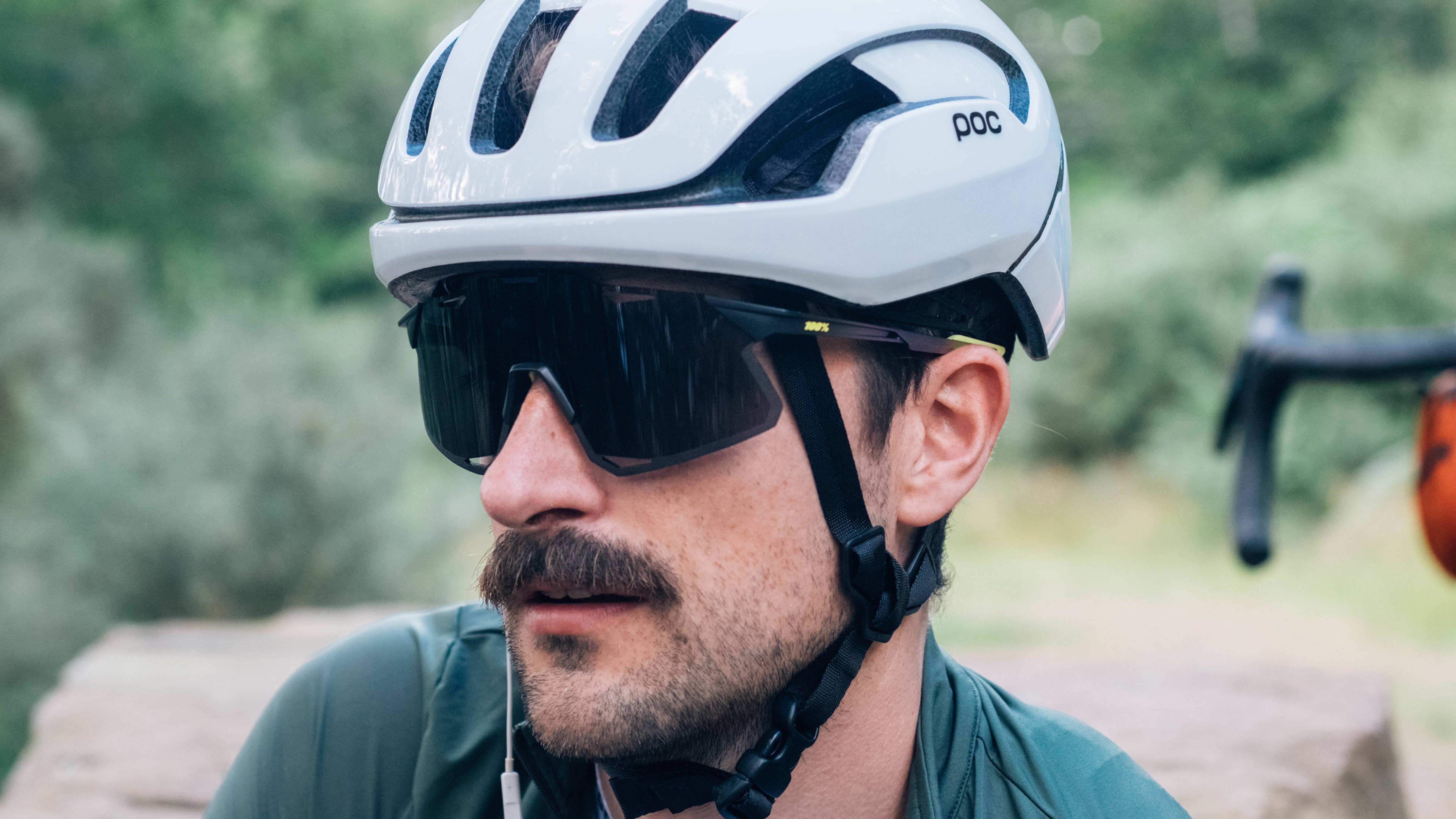
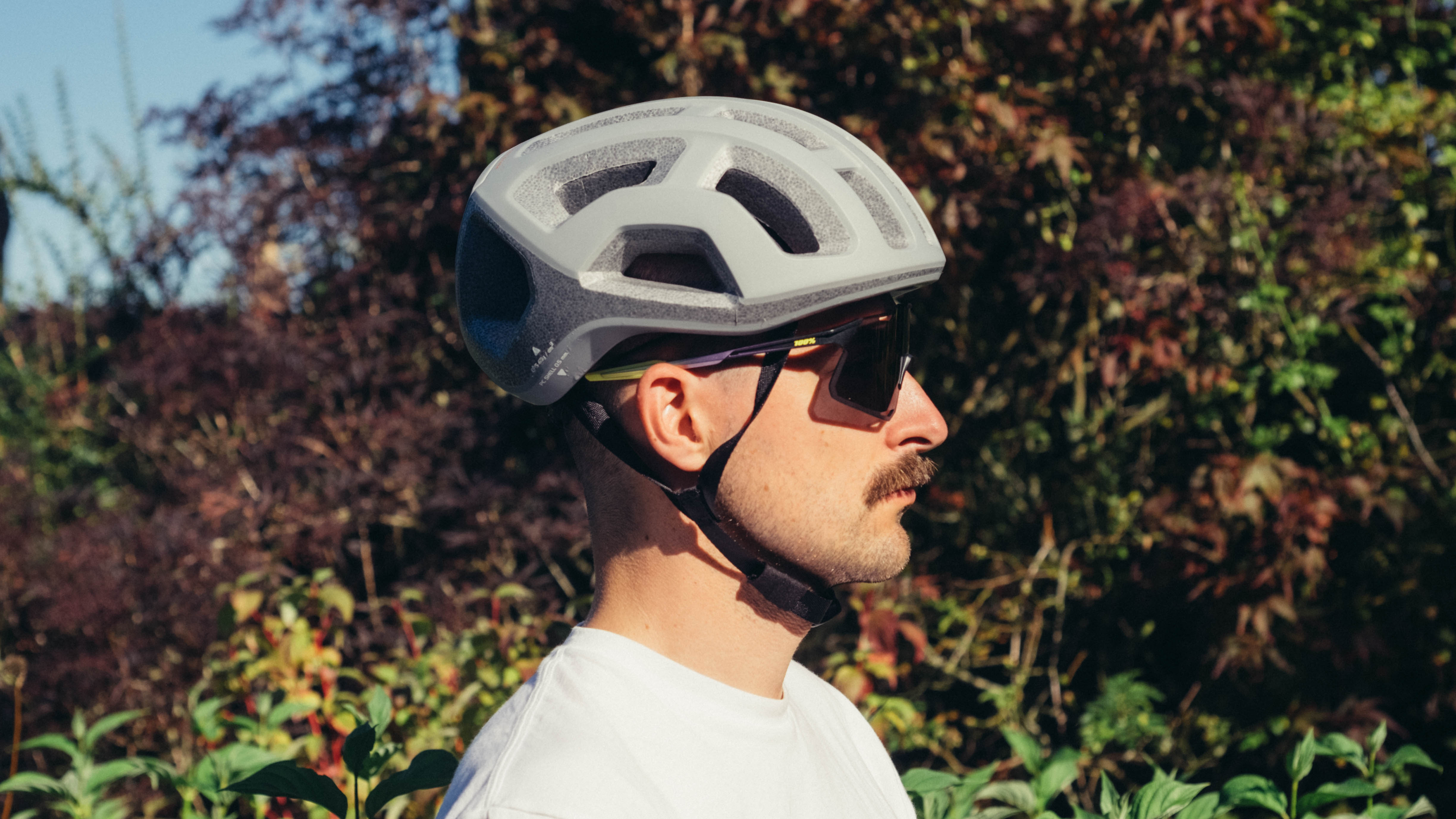


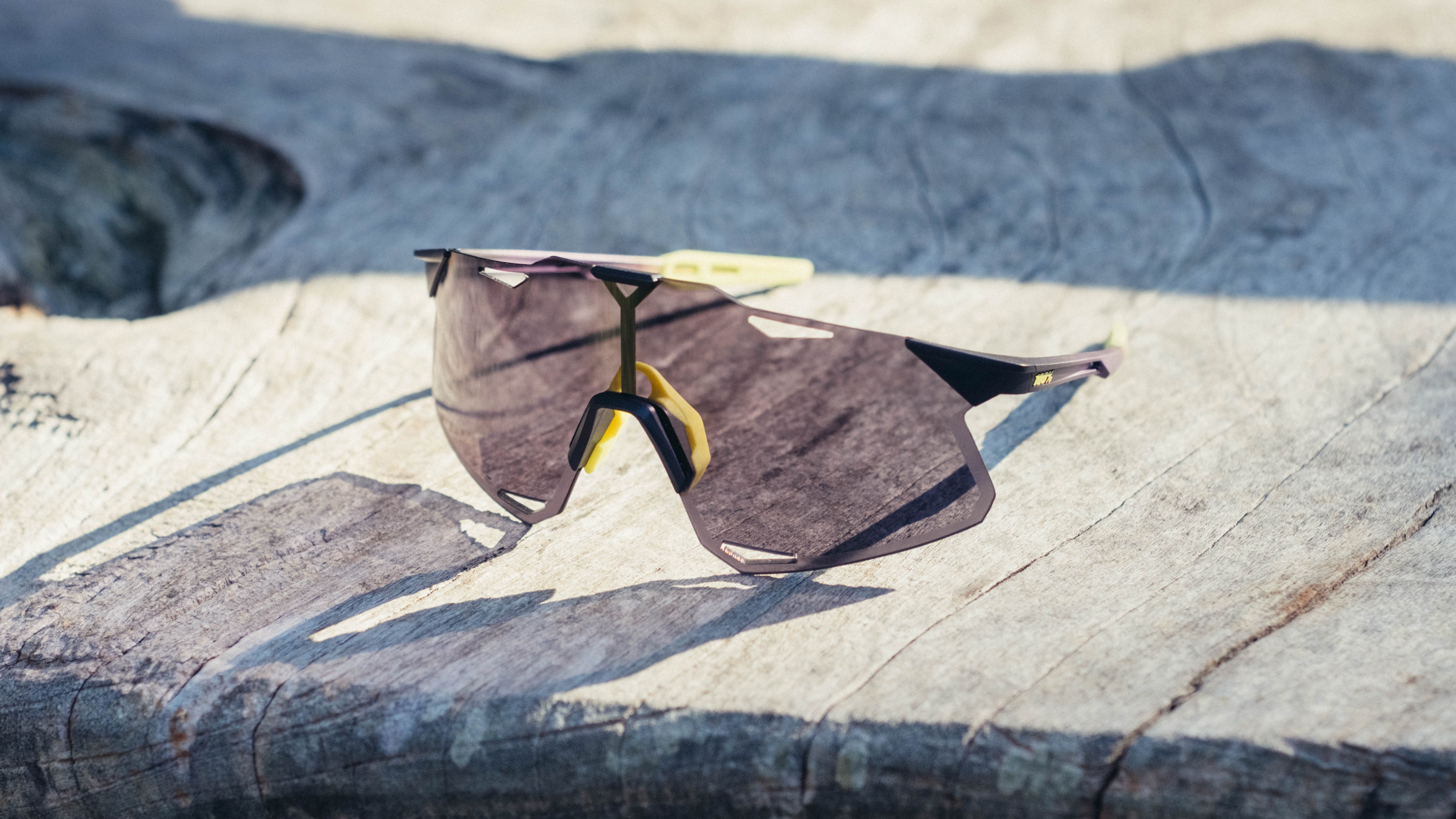
Specifications
Reasons to buy
Reasons to avoid
✅ You want lightweight cycling glasses for racing: The lens sits high on the face, making them great for aero positions.
✅ You want glasses that stay clear and secure: Airflow is perfect for hot and humid days with no fogging thanks to the large vents.
❌ You're looking for all day comfort on the bike: The retention of the Hypercraft's is good, though the narrow arms are less comfortable on longer rides.
❌ You want glasses for everyday riding: These are designed for getting low on the bike, so the lower part of the lens may enter your line of sight in a more upright position.
Lens positioning is important. A lens that is low-slung on the face works well for more upright positions, but as soon as you get long and low on the bike in an aero position, you very quickly start looking through the upper boundary of the lens.
If you're a rider who rides in an aero position for the majority of the time, then I suggest you go for the Hypercraft from 100% over the POC elicit. The lens sits noticeably higher on the face by comparison, and while the optics aren't quite so good, they are comparable in many other ways.
A clear lens is included, and while the swap is easy, it does feel a little like you're breaking the arms off. Retention is similar to the Elicit too, though the waspish, narrow arms are less comfortable on longer rides. As per the S3, too, the longer arms with a minimal wrap can interfere with helmet cradles if you're small of head.
Another big selling point over the Elicit is the price; especially on sale, the Hypercraft are a lot cheaper, making them a more attractive proposition if you want a set of lightweights for more occasional use.
There is a 100% Hypercraft review encompassing all that I liked and disliked on the site already, so have a browse if these tickle your pickle.
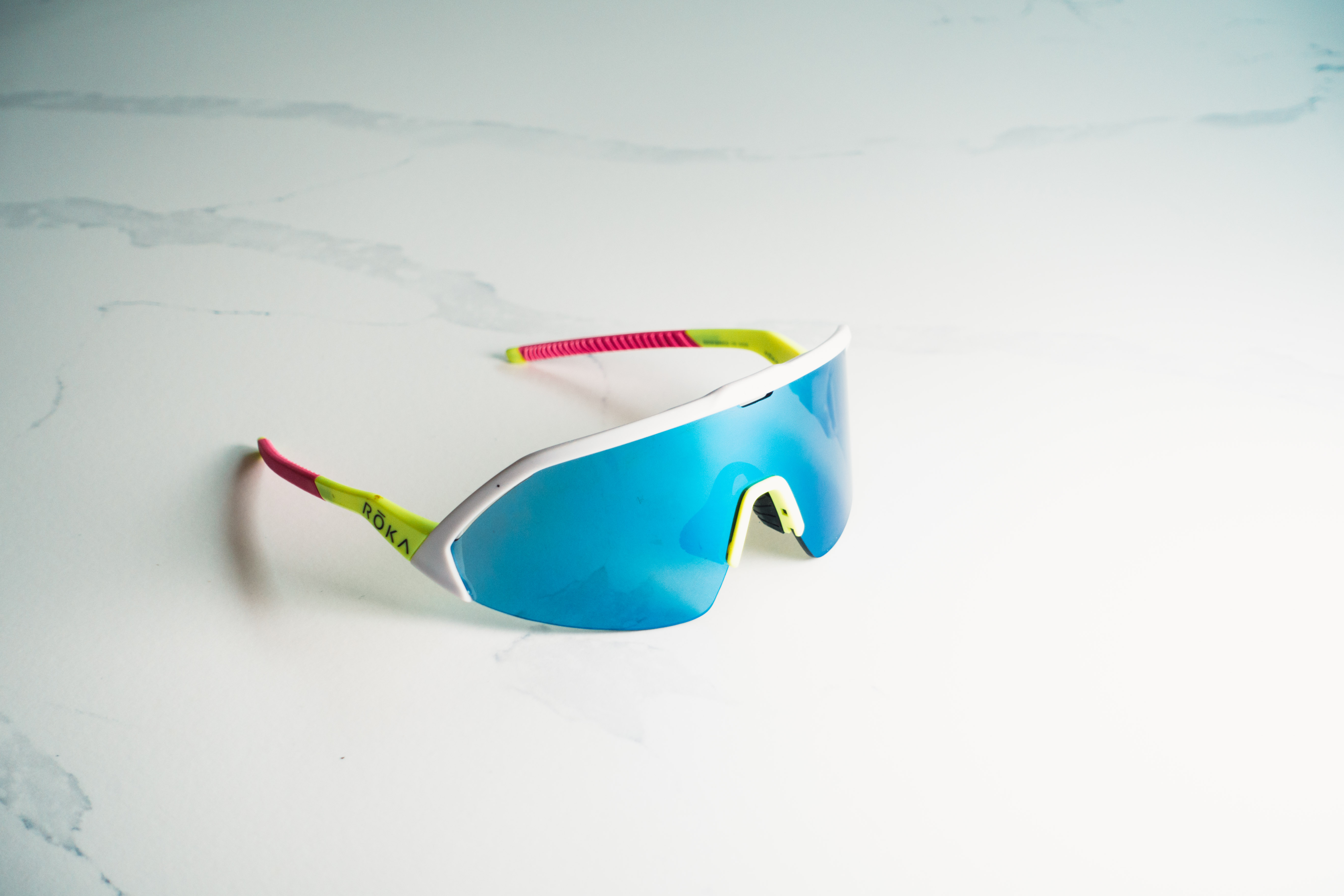


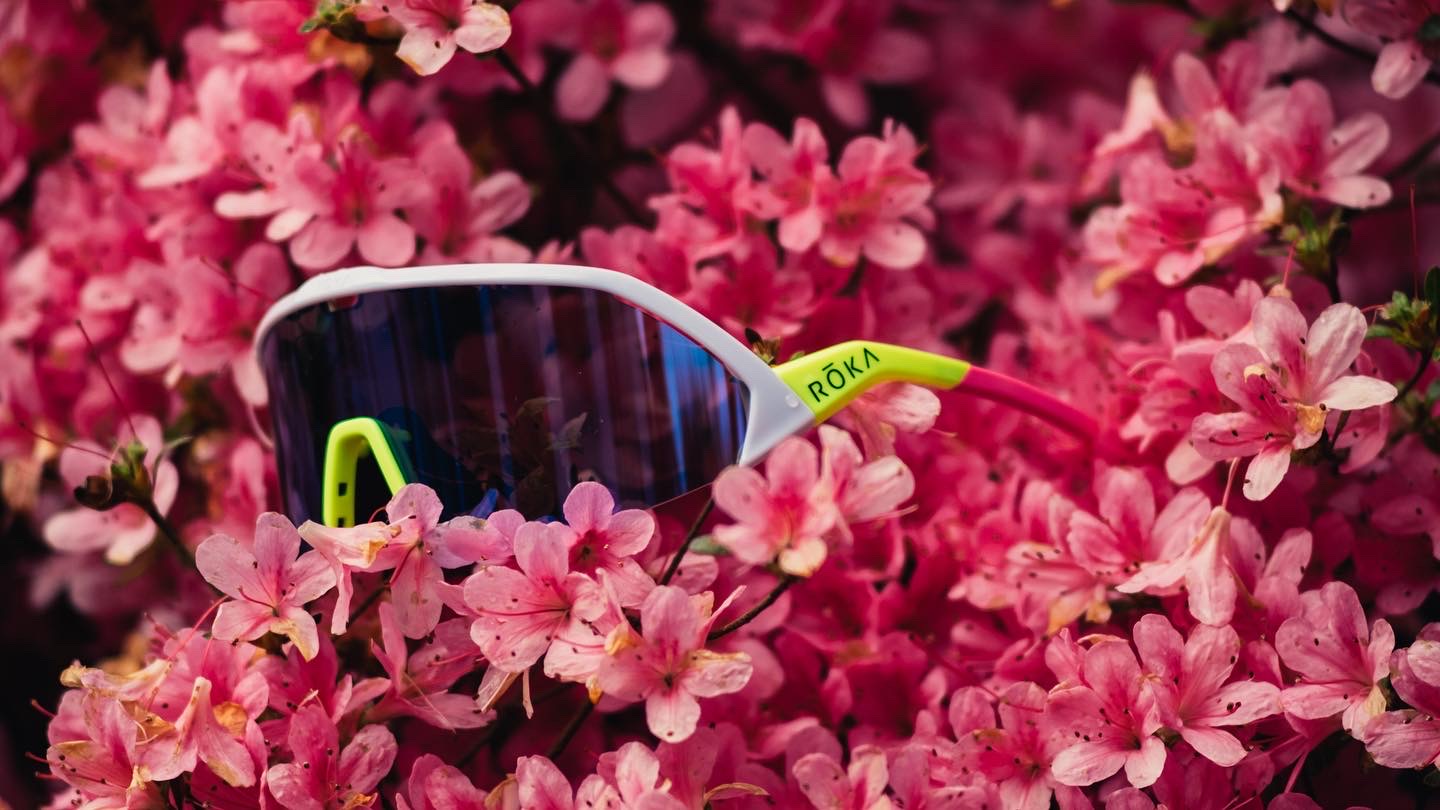
Specifications
Reasons to buy
Reasons to avoid
✅ You want comfortable cycling glasses for a smaller head: Lightweight, good grippers, and just the right amount of arm compression mean these fit securely and comfortably.
✅ You want a lightweight pair of cycling glasses: Given that they’re a half-frame design, the weight is impressive and lighter than many frameless glasses.
❌ You want glasses for cloudy days or riding in woodland: While the shade was spot on for overcast conditions, the lenses felt a little hazy and lacked contrast.
Considering they are a half-frame, the Roka Matador Air are still extremely lightweight. They offer a different visual package, with arms that join the lower half of the lens. This is claimed to offer benefits whereby the arms don't interfere with helmet straps, but I've never found that to be an issue on any of the countless pairs I've tested. Nonetheless, it still looks cool in my eyes, especially in my beautiful/hideous "Miami waterfront in the 80's" custom colourway.
The optics and field of vision are slightly left wanting, particularly in low light, compared to other options at this price point, but they do offer unmatched retention for lightweight, and stellar comfort. The combination of low weight, good grippers, and just the right level of arm compression means I could happily wear them 24/7 (I sleep on my back so it's fine).
These are definitely a pair better suited to smaller heads in my opinion, and while they don't come with a clear lens the lens swap is very easy. Given how long I've been using them I've written up a full Roka Matador Air review for your perusal if these seem like something that'd suit you.
Best budget cycling glasses
I've put together a separate guide to the best cheap cycling glasses, but from this guide, two pairs really stood out to me as punching well above their price points, so I've included them here. The lenses and build aren't going to match a really top-end set, but for the price, they're incredible, and if you're just getting started, they're a great jumping-off point into the world of dedicated eyewear.

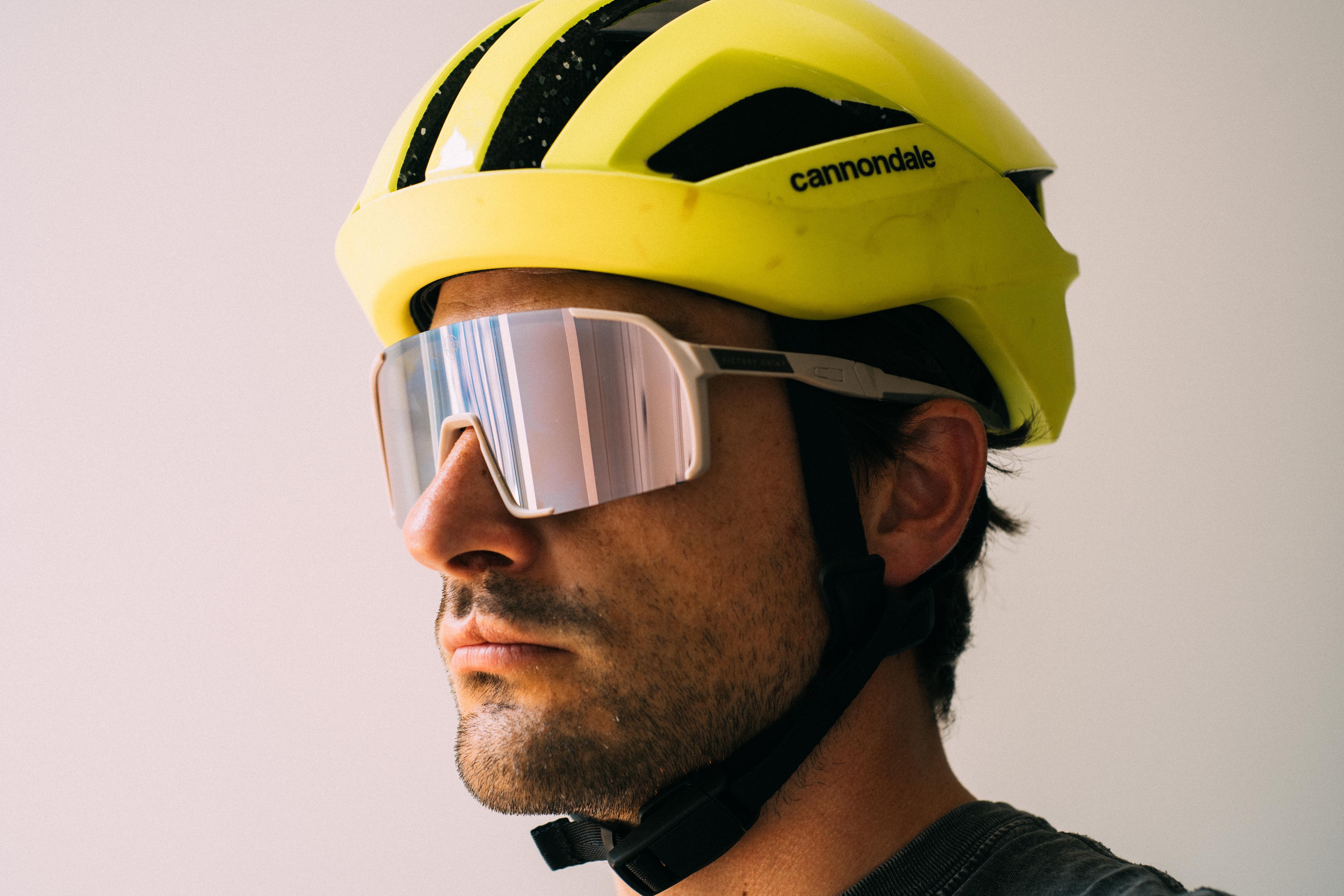
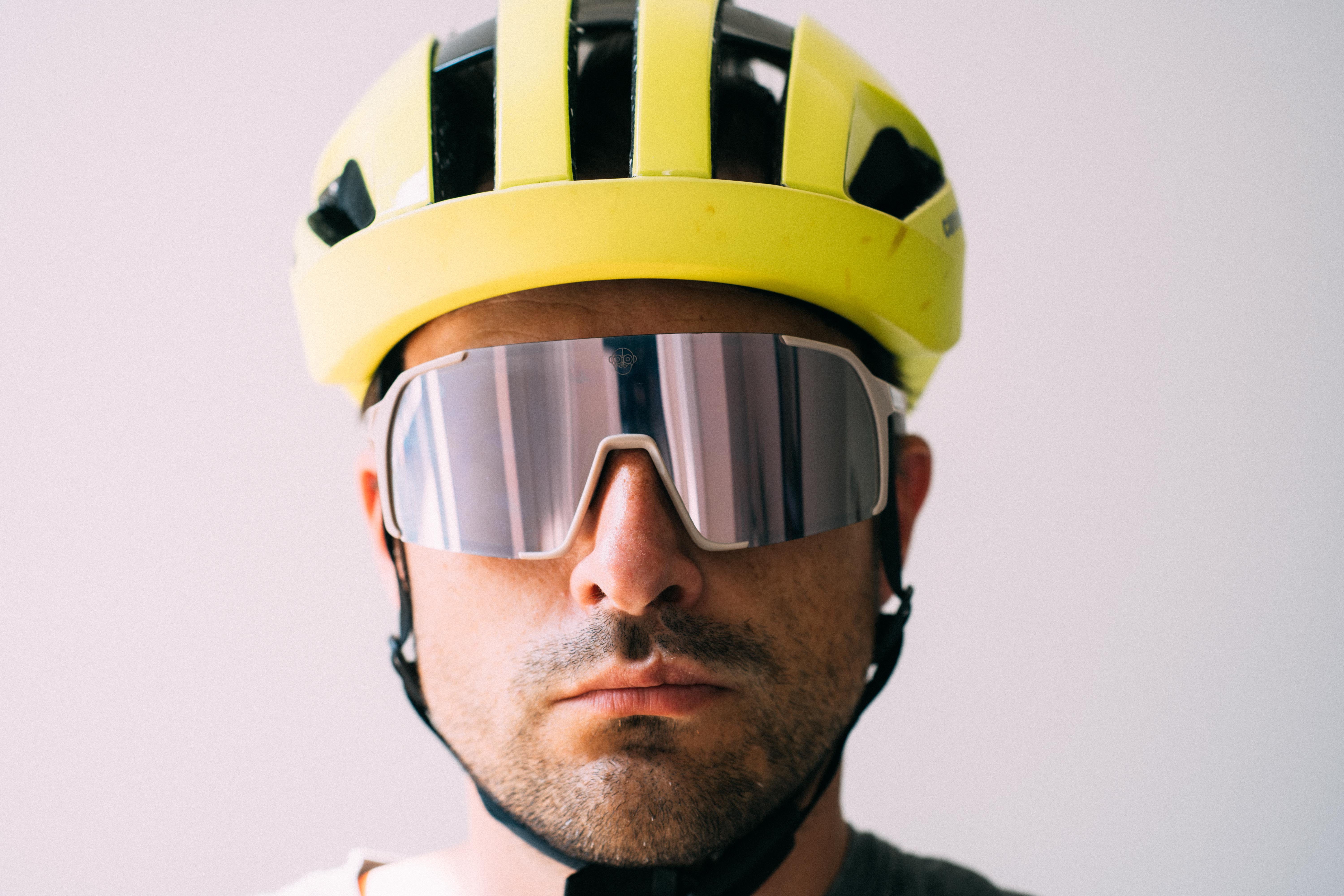
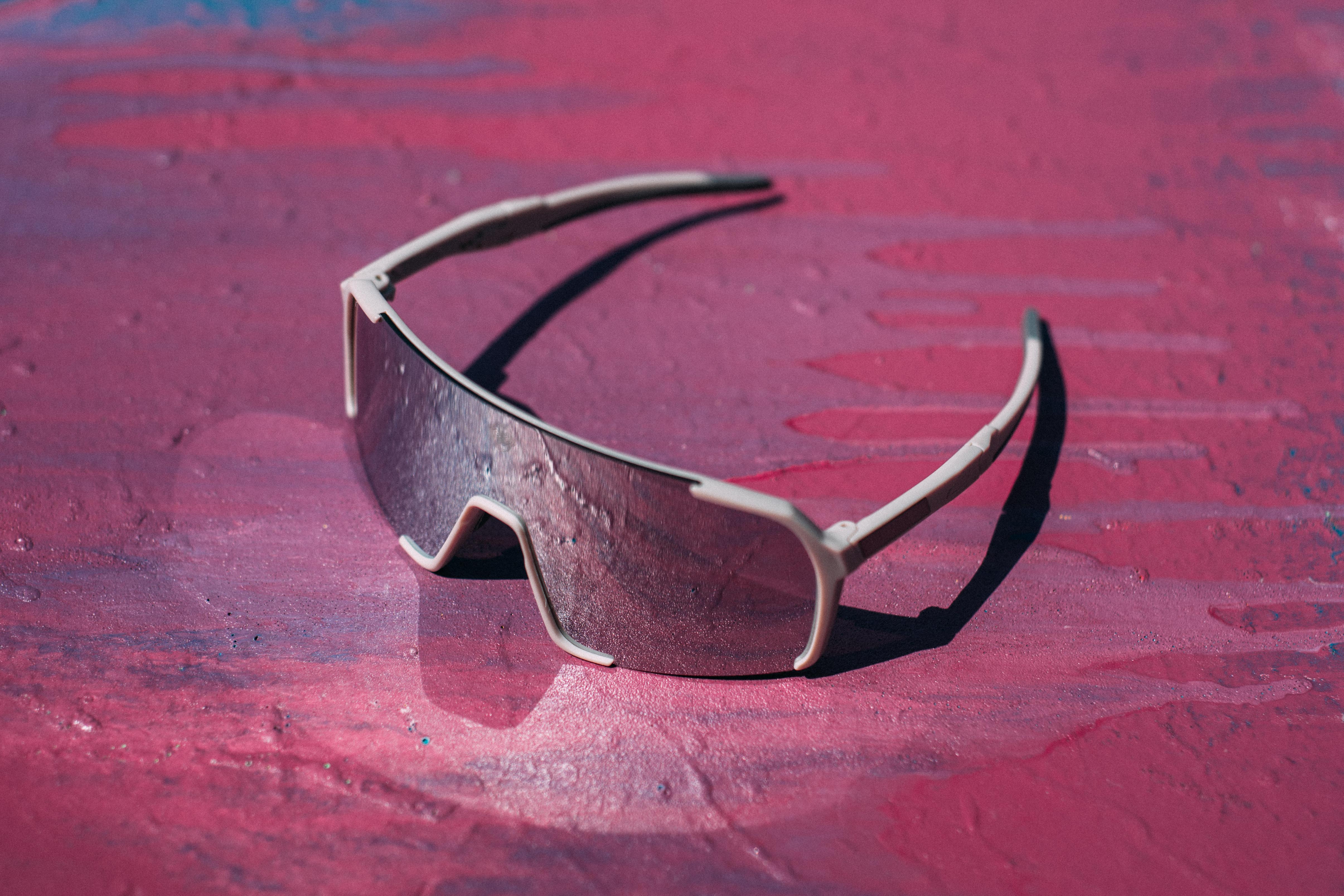
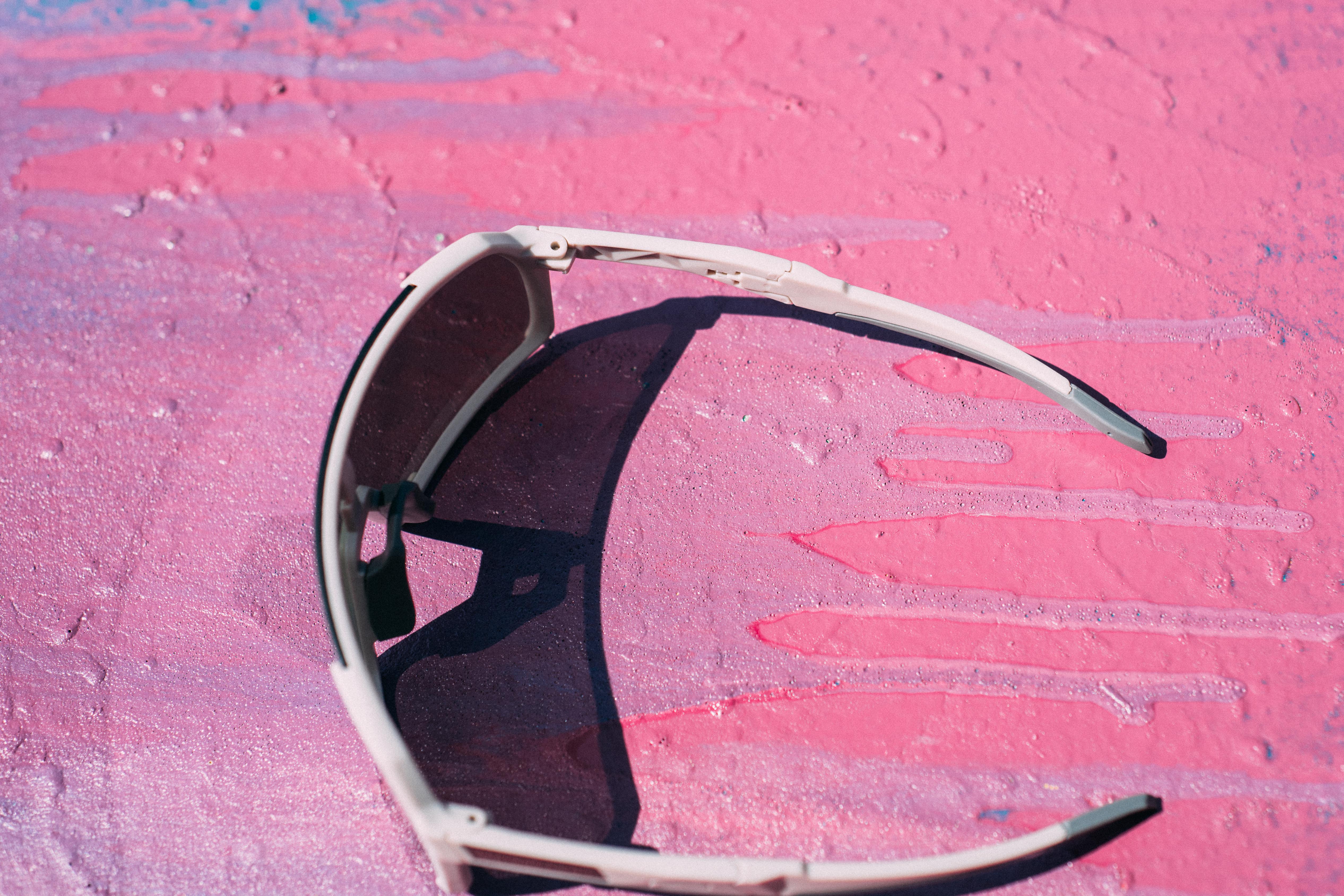
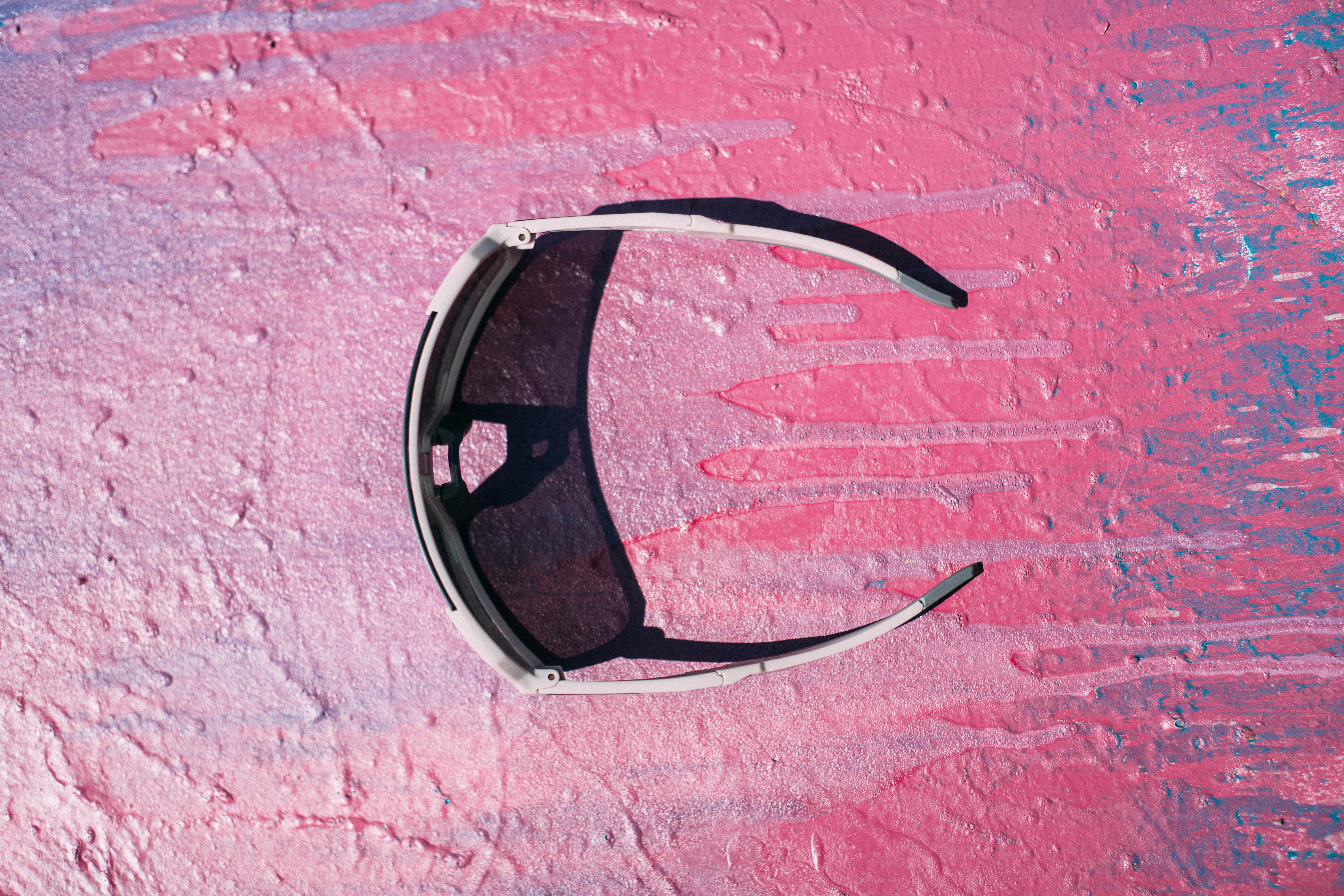
Specifications
Reasons to buy
Reasons to avoid
✅ You want a great value pair of cycling glasses: Nothing beats the APE Optics Vega Evo for value, coming with three lenses as well as a prescription lens insert for under £40.
✅ You want a modern, premium look on a budget: The Vega Evo mimics more premium models with a semi-frameless design and contemporary colours.
❌ You want top-tier materials: The materials feel a little cheaper than higher-end models, but that's because they are, and you’ll save a significant amount of money as a result.
In terms of value, nothing beats these APE Optics Vega Evo from Victory Chimp. As well as looking far more premium, for under £40 ($50ish) you get a mirrored lens, a clear one, and a polarised one, as well as a prescription lens insert. For a little more, you can get a photochromic lens included too
Aesthetically the Vega Evo apes (yes, pun intended) more premium models with a full frame that's partially occluded by the lens, making it appear semi-frameless. The colour palettes are modern too.
The main lens is decent enough, though, like many cheaper cycling glasses, it has this slight colour shift quality to it while you look through. It's not hugely detrimental, and in sunlight, you'll be fine.
In low light, you'll want to swap out to one of the other lens options though, but that's the beauty of these; like the far more premium 100% S3 you are covered for year-round riding.
The materials feel a little cheaper than higher-end models, but that's because they are, and you'll be saving a pretty large wedge of cash to make up for it.
My Victory Chimp Vega Evo review should fill you in on all the details if you want more info.
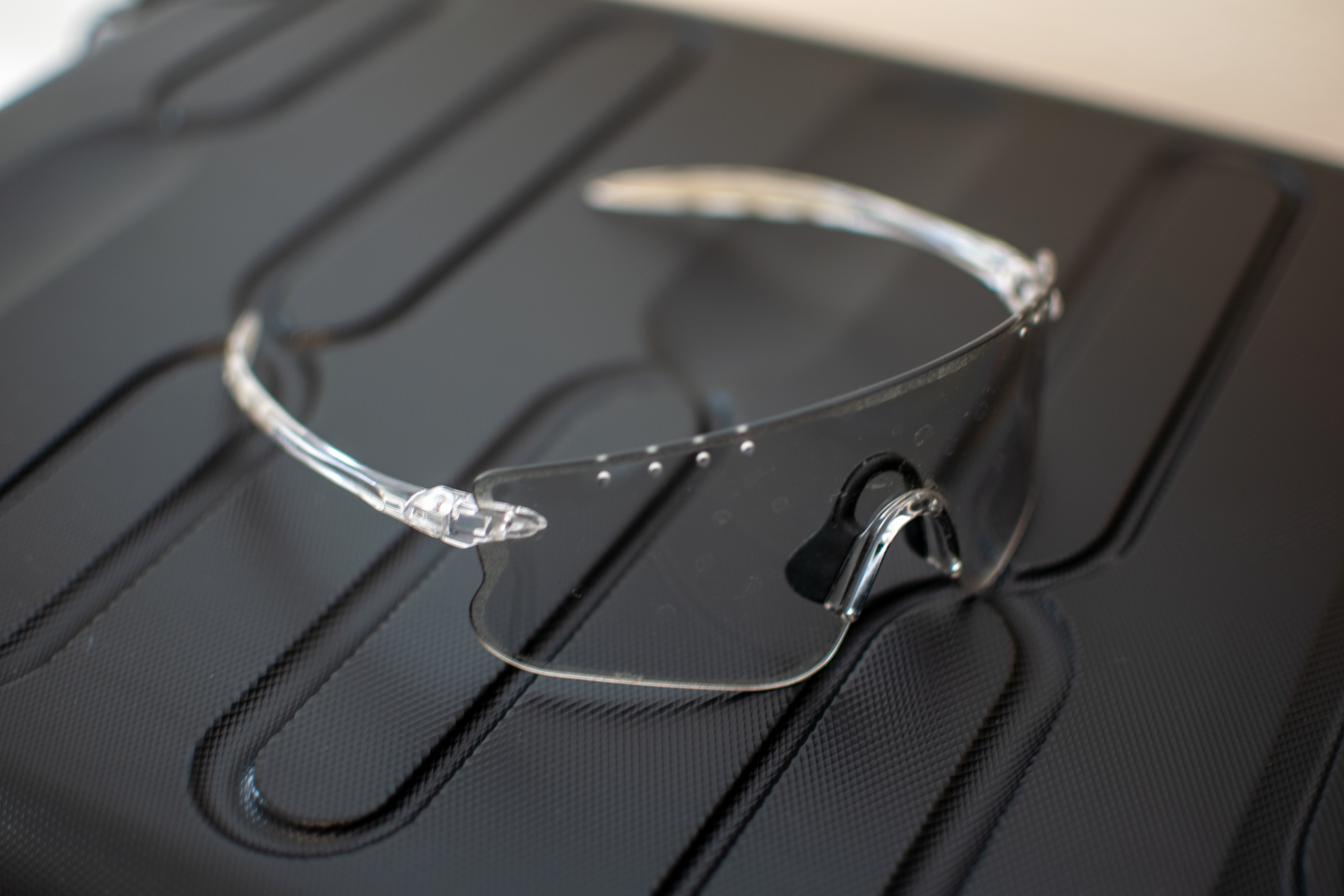
Specifications
Reasons to buy
Reasons to avoid
✅ You want a smaller lens: The Galibier Grand Tour has a lens that's smaller than many of the oversized options that are trending
❌ You want swappable lenses: The lens is fixed, so you can't switch to different lenses based on conditions.
The Galibier Grand Tour cycling glasses are another pair of eyewear that impressed us, with performance beyond their affordable RRP. While it doesn't come close to the Victory Chimp Vega in terms of all-out value and versatility, the lightweight frameless design weighs just 23g and offers a comfortable fit that feels secure when riding.
The lenses come in two options, but they aren't swappable. One of those options is photochromic, which performs well in changing conditions, from bright days to unlit lanes. All lenses feature an anti-fogging, anti-scratch finish, with vents along the top of the lens to aid airflow.
The lenses themselves offer great coverage, although they aren't as large as some oversized glasses on the market. If you're looking for a classic Oakley vibe on a budget, then these are a great option.
For more details, check out our Galibier Grand Tour sunglasses review.
Best specialist cycling glasses
There were a few pairs of sunglasses that I've been testing that I loved, but defied categorisation. Giant lenses, aero gains, side flaps, and some more casual options. I have loved using all the options below, but I appreciate that, more than any others on the list, these are definitely a more specialist, more considered purchase.
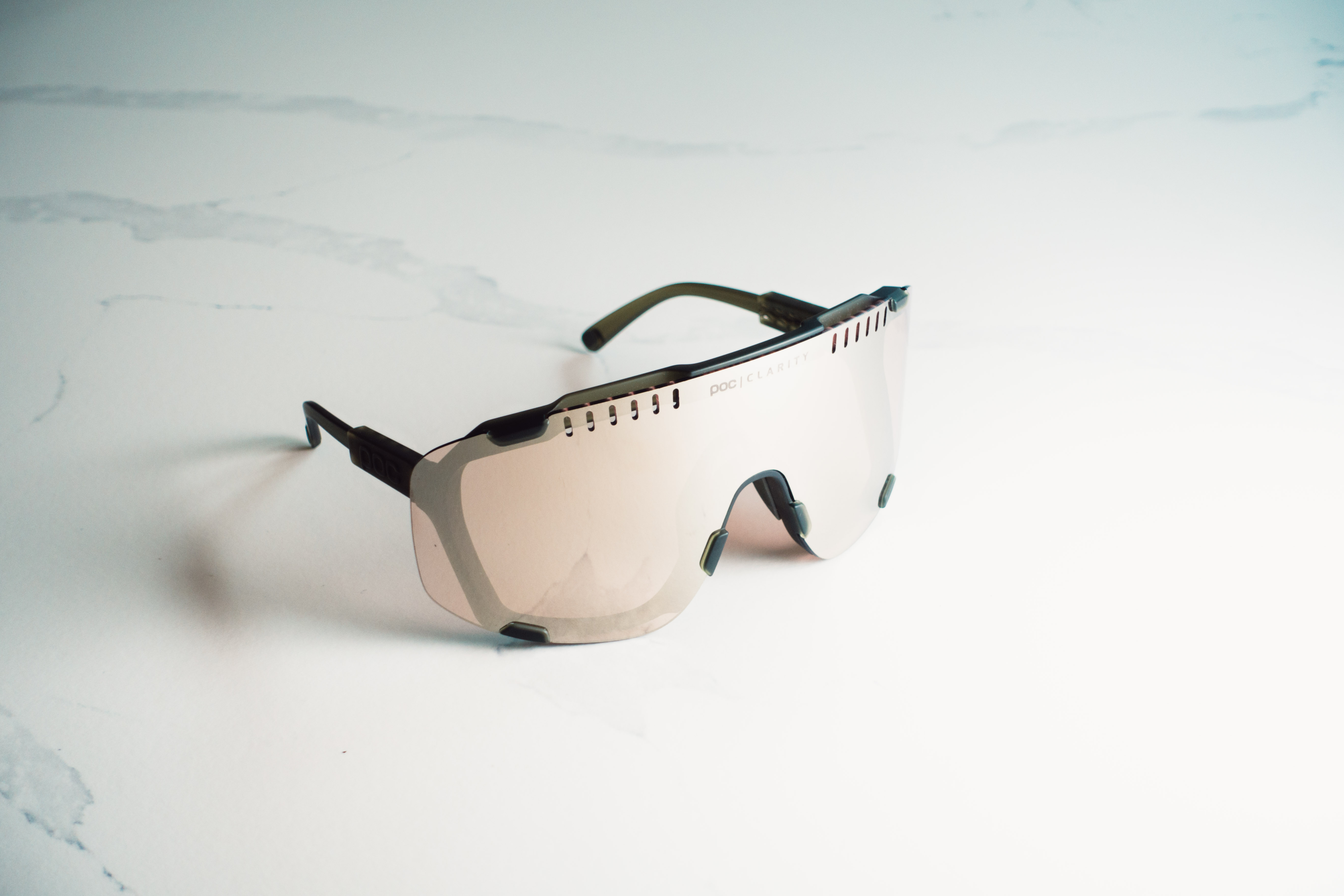
Specifications
Reasons to buy
Reasons to avoid
✅ You want maximum coverage in all conditions: With a massive lens that keeps most things out, the Devour feels almost like wearing goggles and is great for winter riding.
✅ You want a wide field of view: The huge lens provides an expansive field of view so you can see more of your surroundings.
❌ You prefer an unobtrusive fit: The big lens means they are more likely to interfere with your helmet and may dig into your nose.
❌ You're after a lightweight pair of sunnies: The large, high-coverage design adds weight, so they’re not for the weight weenies.
There's been a slow arms race in the world of cycling glasses as to who can make the biggest pair. POC has, with the Devour, created something akin to a nuclear bomb, in that they are just truly gargantuan.
The sheer size of the lens has many benefits. You get a huge field of view, but more than that, you get unmatched protection from the elements, be they sun, rain, wind, muck, or anything else. The feeling of protection the Devour offers is only really matched by actual goggles. This is why, for bad-weather riding in winter, they are my go-to.
With such a whopper of a lens comes some drawbacks, however. The height makes it far more likely to interfere with your helmet, and unless it's the right setup, these do often get pressed into my nose, especially over bumpy terrain. The lowers also touch my cheeks when I smile, but that's not an issue because cycling is a serious pursuit and nobody would be mad enough to enjoy themselves while riding, right?
These are a wild pair of sunglasses, and for some of you, they will be perfect, but they have a very out-there look, are noticeably heavy, and the hooked rather than grippy arms mean they won't necessarily stay the optimum distance from your face. Curious? We've got a POC Devour review to fill in all the gaps.
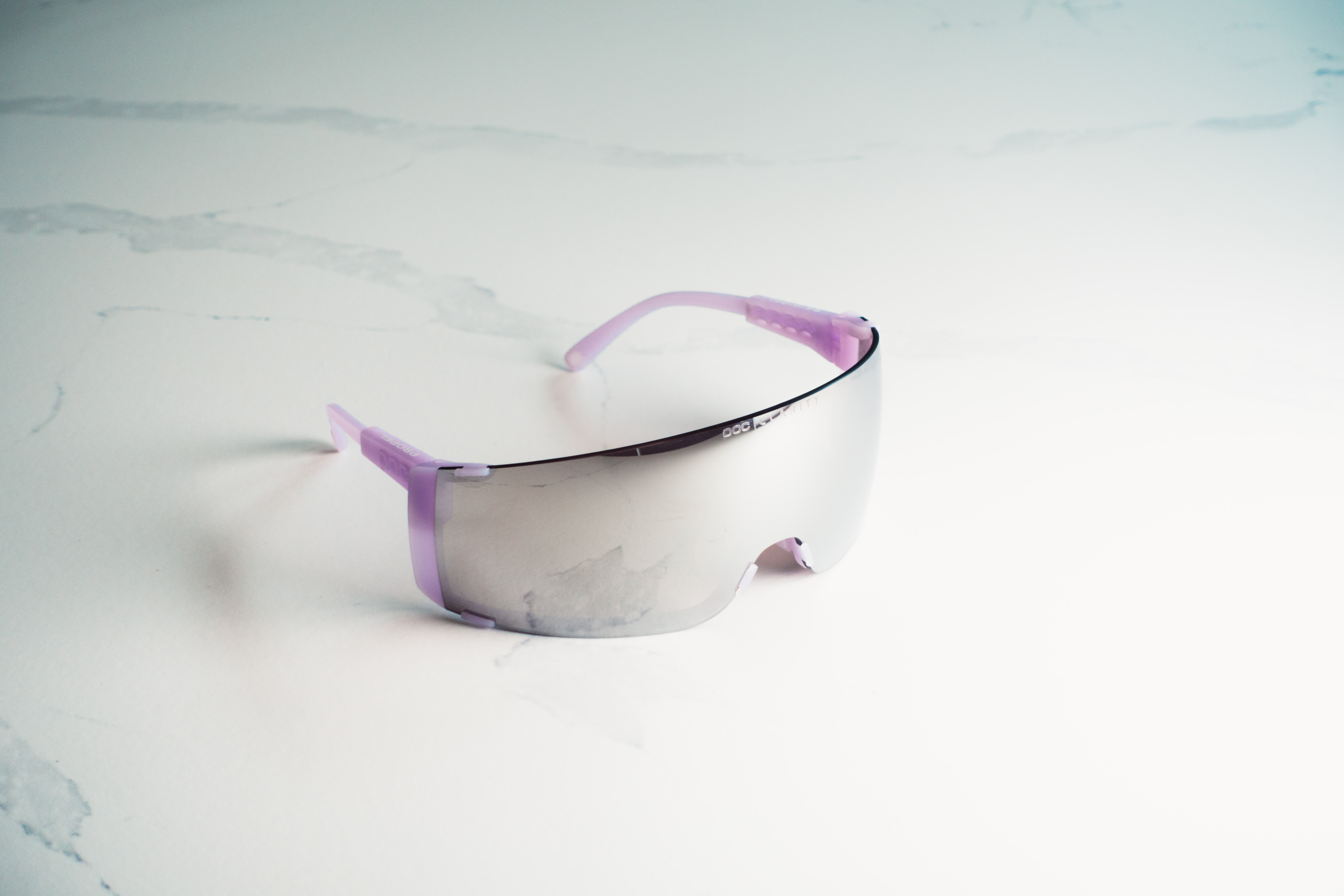
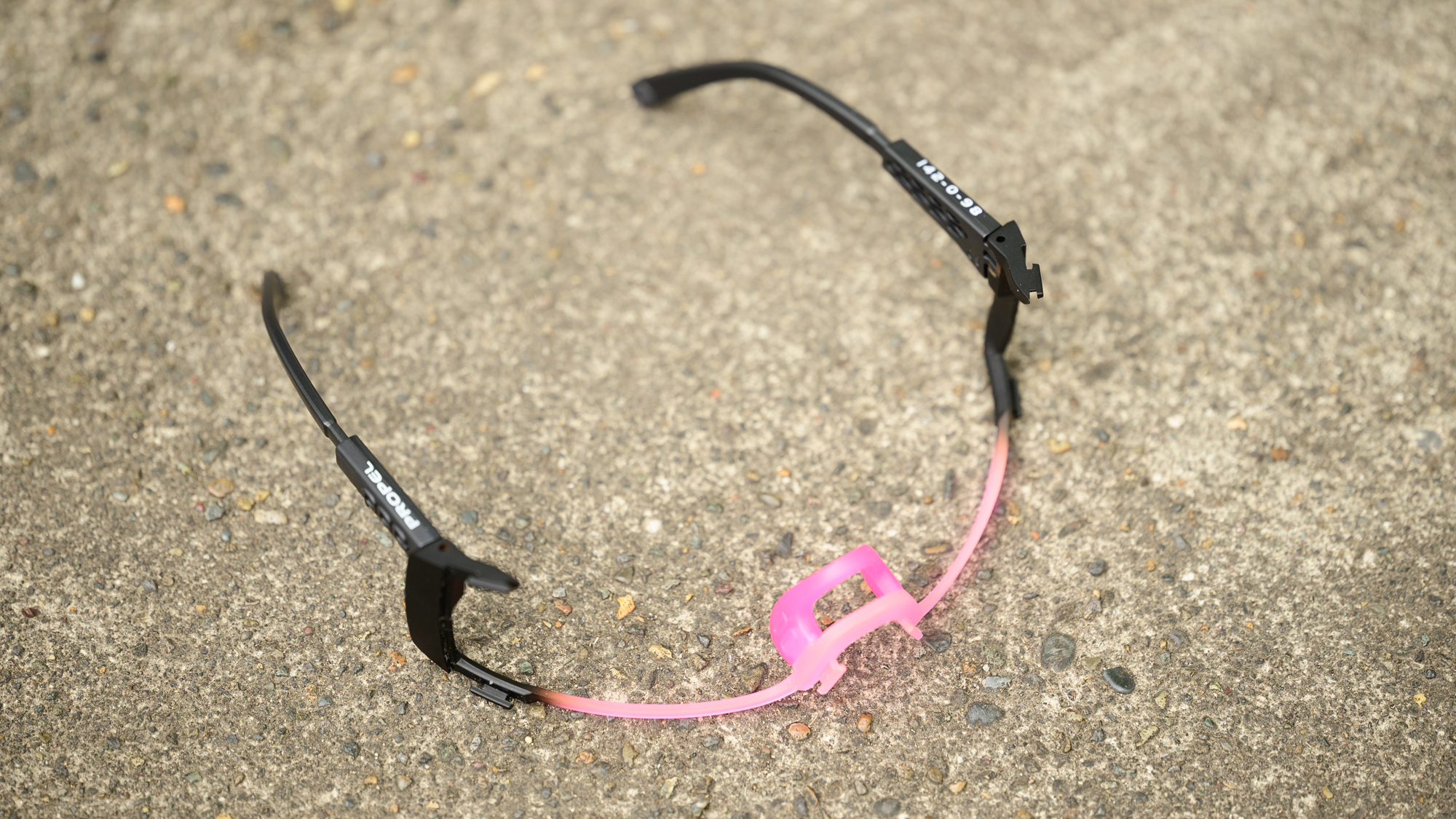
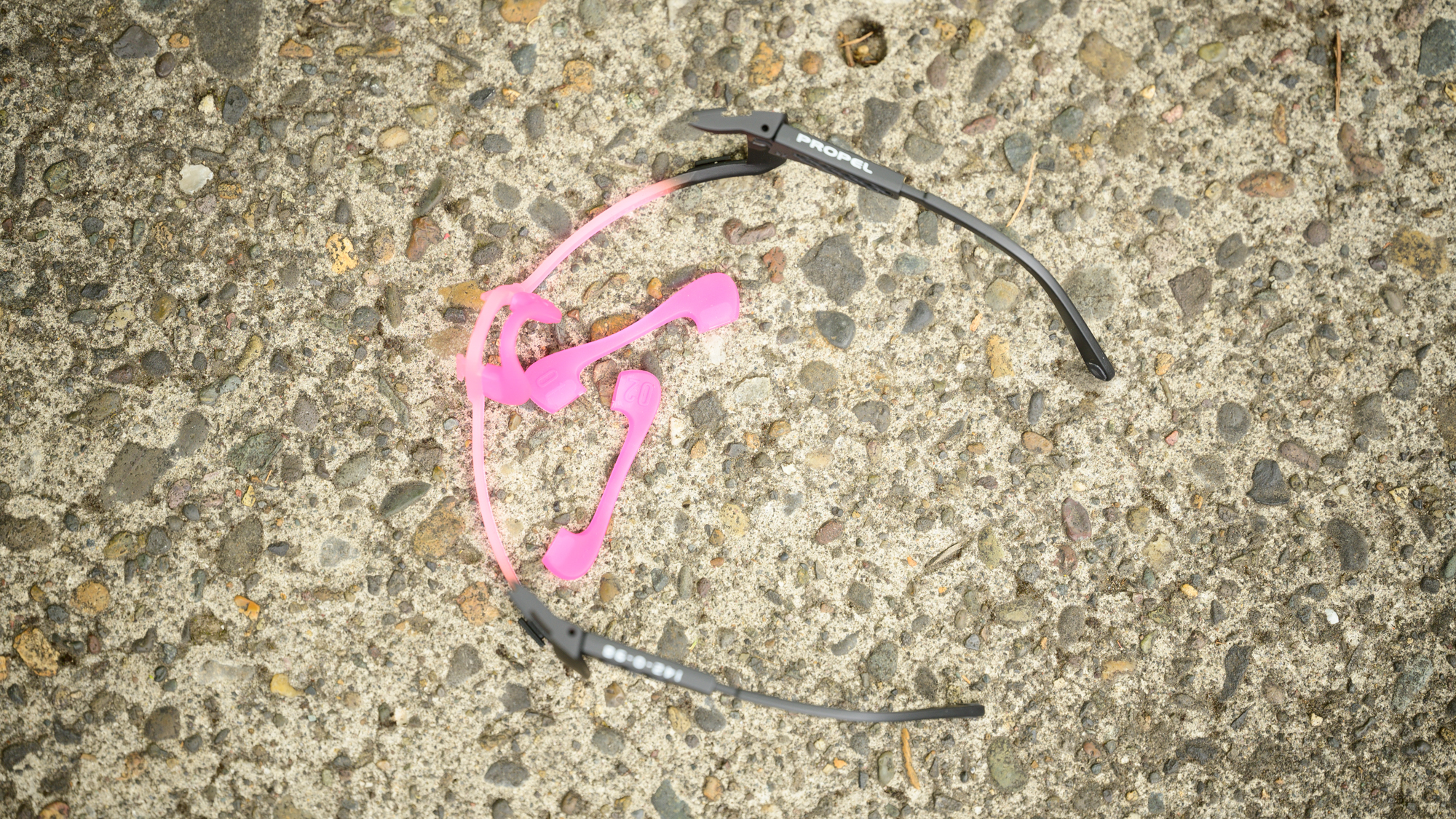
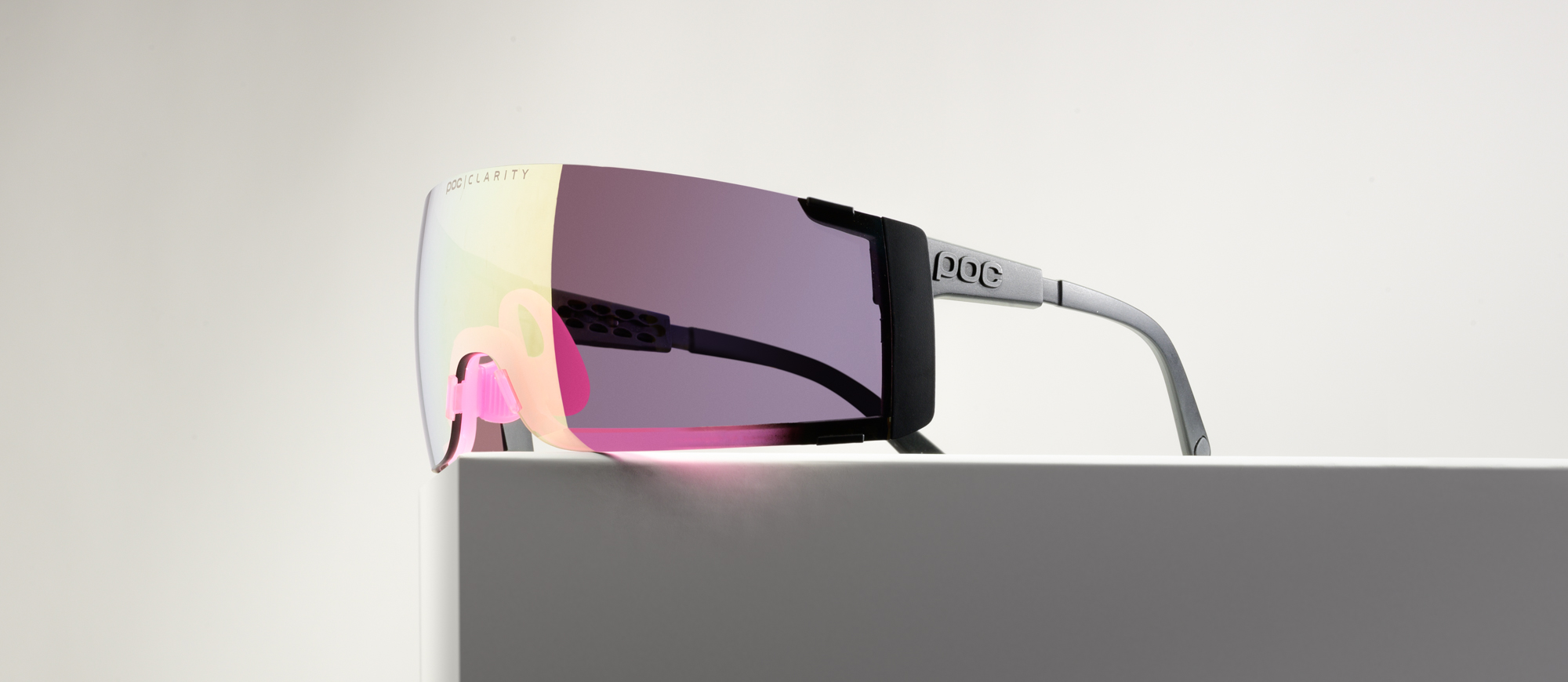
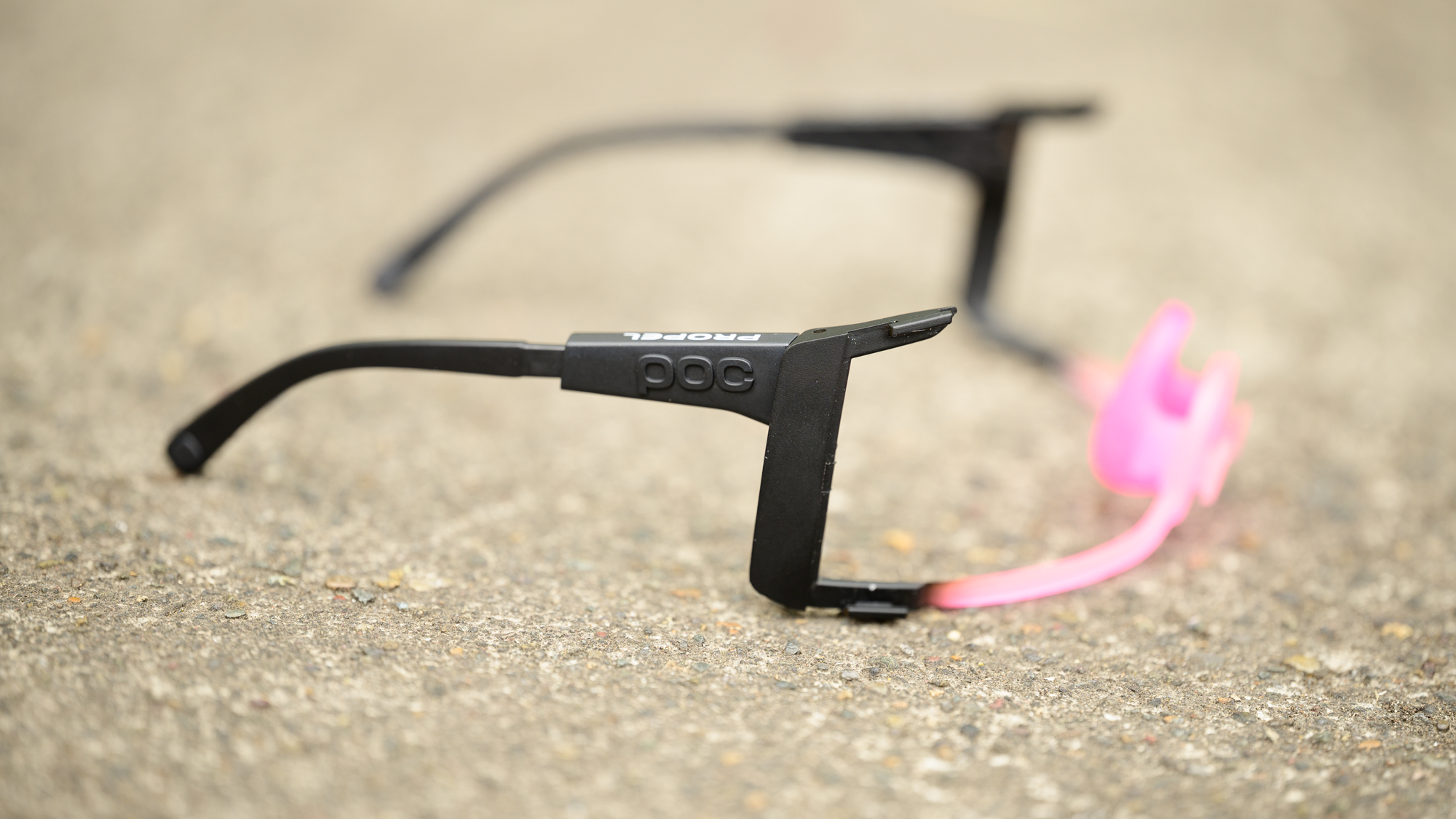
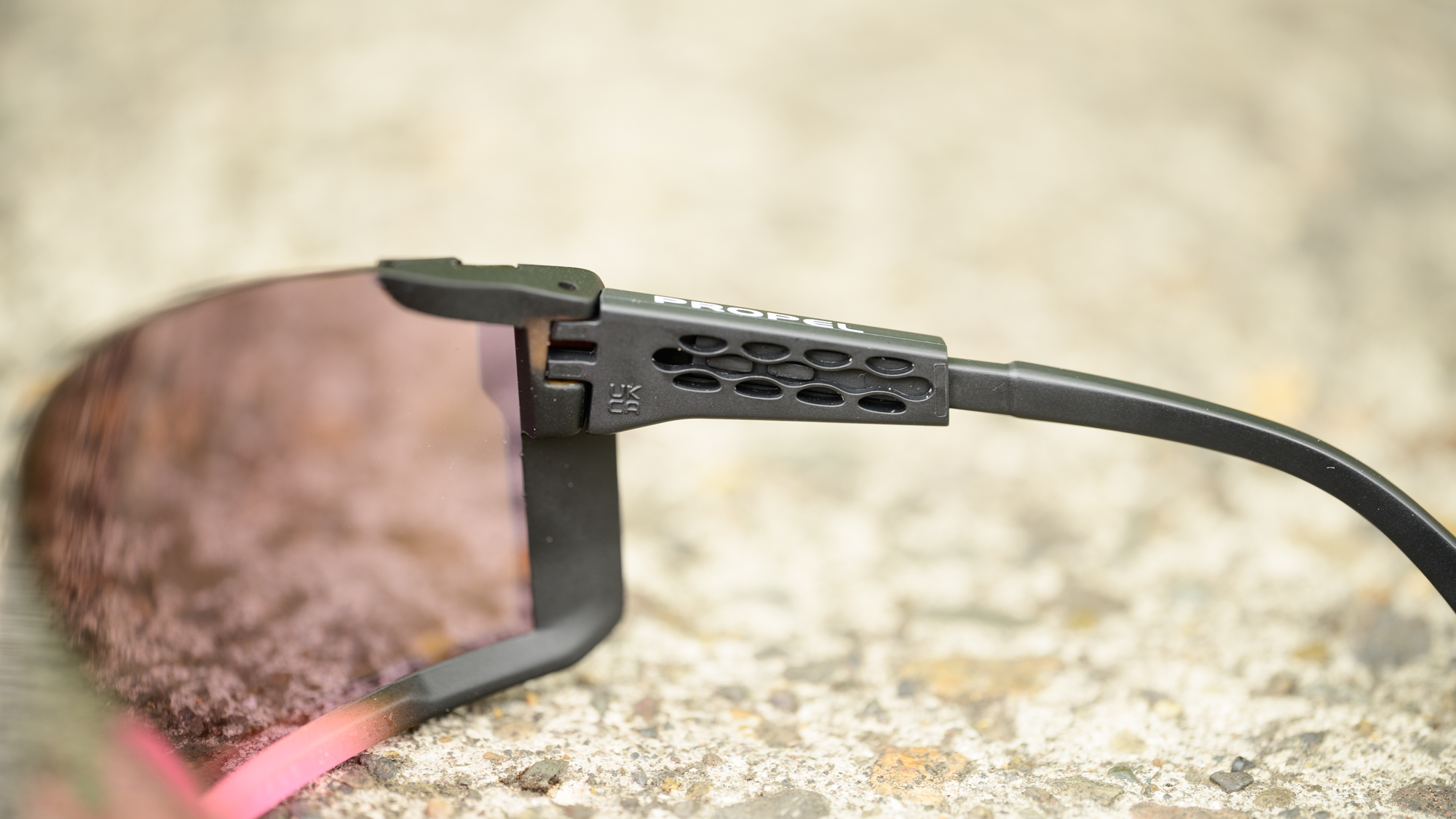
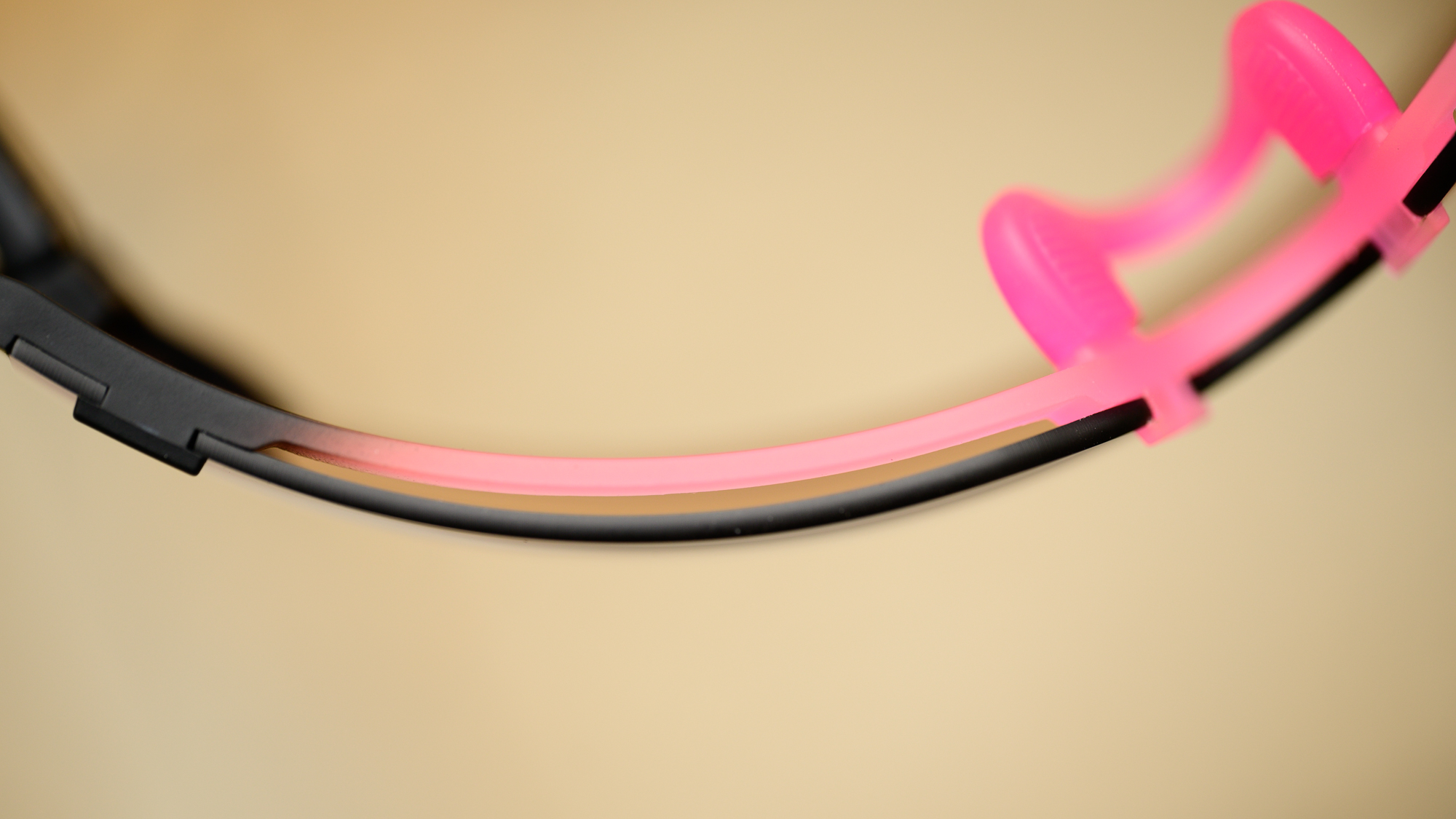
Specifications
Reasons to buy
Reasons to avoid
✅ You want glasses that have been designed with aerodynamics in mind: The Propel's feel like you're wearing a visor more than a set of cycling sunglasses, and they look it too.
✅ You want glasses that stay put: With a replaceable nose gripper, curved frame, and hooked arms, these offer the most secure fit of any POC glasses.
❌ You prefer a more casual look: Their heavily wrapped, aero-focused design might feel over-the-top for your style of riding or off the bike.
The third pair of glasses from POC is the Propel, the only pair of sunglasses I can think of that has been designed with aerodynamics in mind. Personally, I love them, and while there aren't many lens options, the silver Clarity options I have are brilliant.
They are the most heavily wrapped glasses I've ever used, offering peerless peripheral vision. Somehow, despite the heavy wrap, they don't ever encroach on your eyes or eyebrows. You can see the frame that only exists on the lower edge, but given these are aero-focused, when you're in an aero tuck, you will be looking much higher up and the field of view is perfect. They feel like you're wearing a visor more than a set of cycling sunglasses, and they look it too.
They're also the most secure of any of the POC offerings, with a brilliant replaceable nose gripper combined with a much better grip from the curved lens/frame. The arms are hooked rather than grippy, as per the Devour, but they hold much better in this case.
My colleague Josh Ross has written a POC Propel review and loves them about as much as I do.
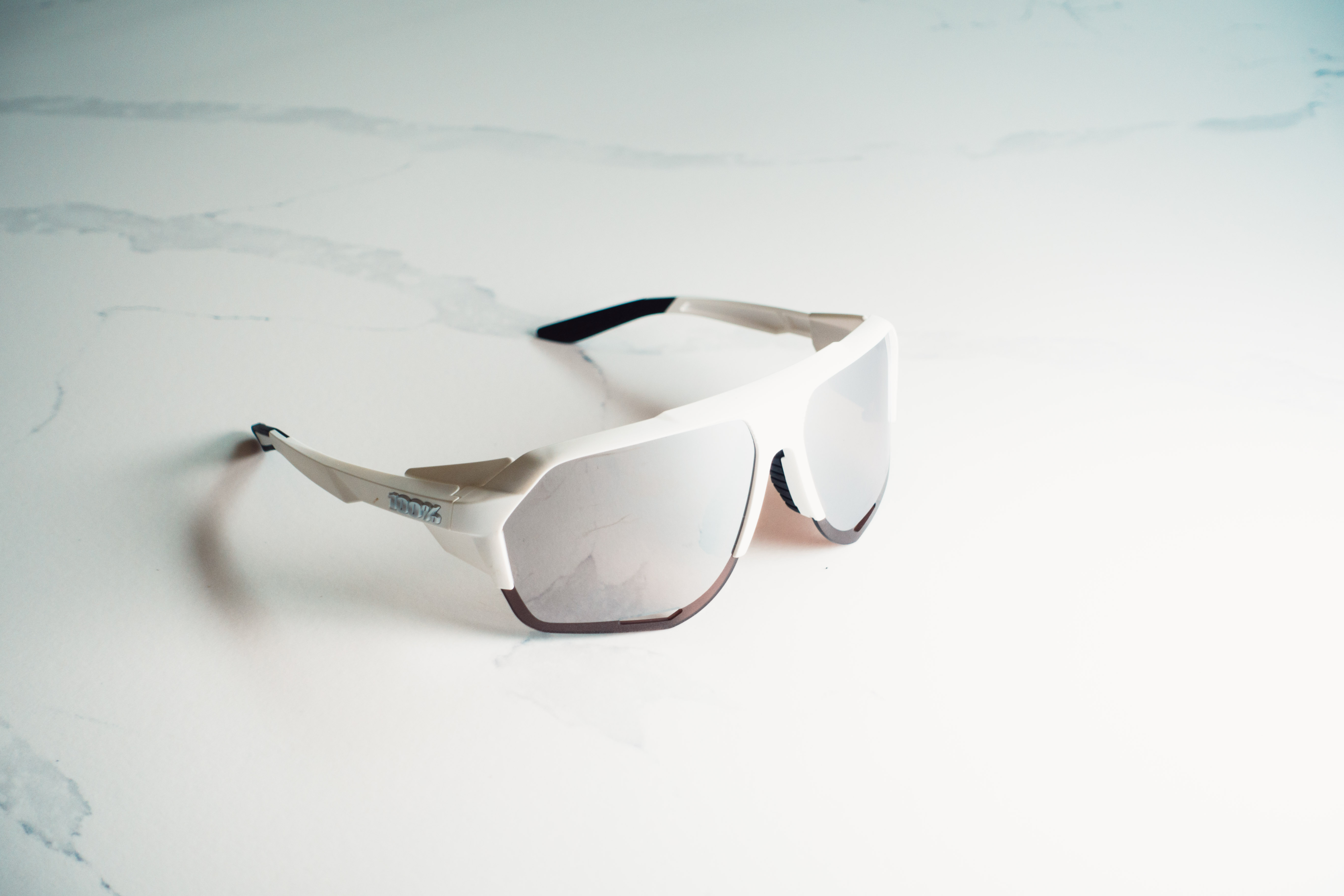
17. 100% Norvik
Specifications
Reasons to buy
Reasons to avoid
✅ You need extra coverage in bad weather: The side flaps help keep out wind and rain, particularly when riding upright on gravel or adventure bikes.
✅ You want glasses that look a bit different: Perfect if you’re not a fan of the giant single-lens look.
❌ You want the widest possible field of view: These glasses have smaller lenses, and the side shields sit in your peripherals somewhat, so they don't offer the same field of view as larger single-lens options.
❌ You want glasses that follow modern trends: The design is more old school compared with today's giant single-lens look.
If you want to channel Geraint Thomas and wear glasses with two separate lenses, don't get the SunGods, get these instead.
I had these in a box for ages and dismissed them; the future of cycling glasses is mono lens only. One grim day though I chucked them on and was extremely surprised. In the driving wind, the side flaps are excellent at keeping you feeling snug and protected, and having clear lenses in the box meant they became a winter staple in my rotation.
They may raise some eyebrows at the club run, but if you're a contrarian or simply don't like the giant single-lens look, then these are my suggestion as an alternative. The HiPER lens in the white pair I've got on test is the same as in the S3 that I also loved, and the finish is also the lovely soft tact that makes them feel super premium.
The field of view isn't as good as larger options, and the side shields do sit in your peripherals somewhat, but especially if you ride in a more upright position (I'm thinking gravel here), they'd work really well.
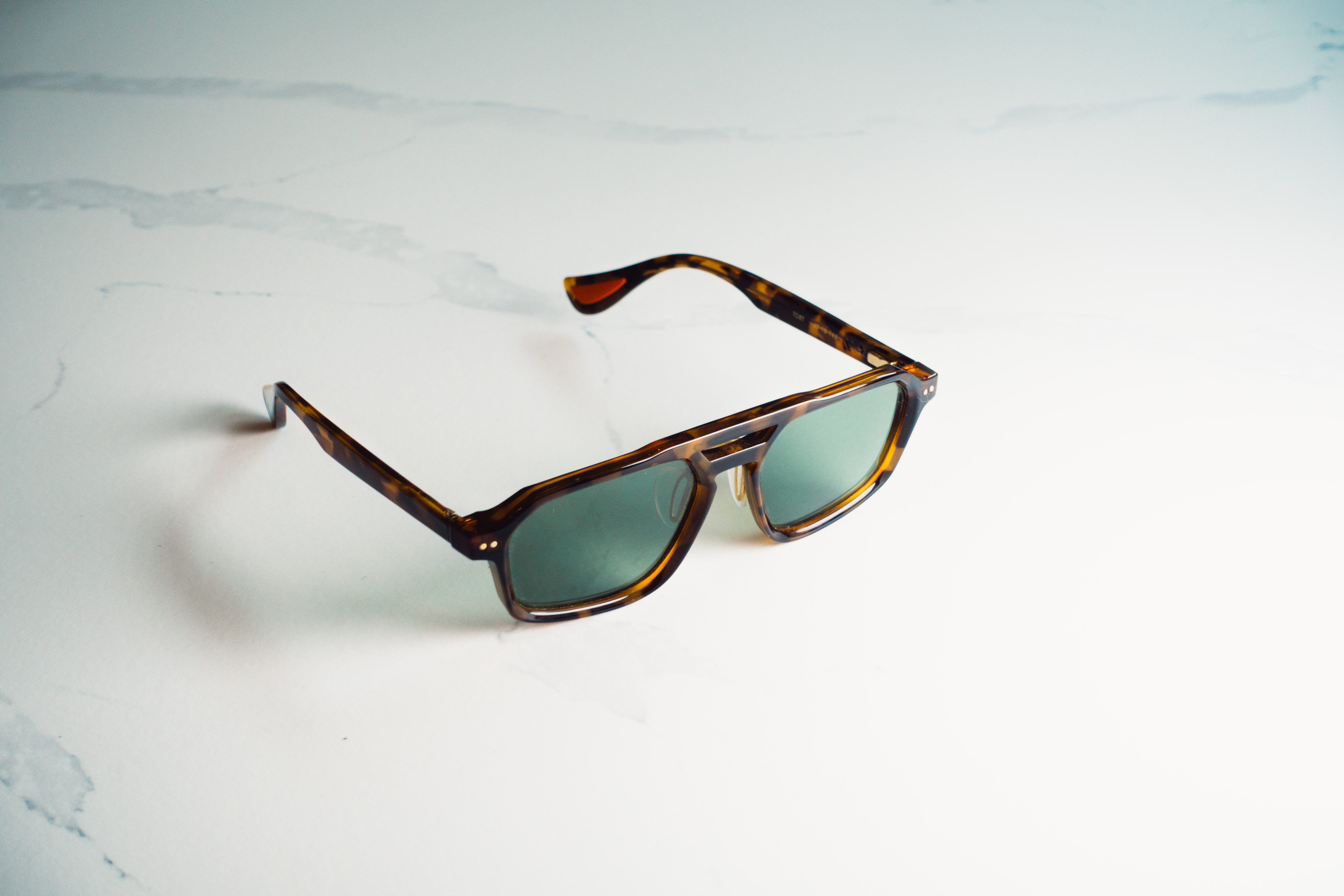
18. Article One x Mission Workshop Navigator
Specifications
Reasons to buy
Reasons to avoid
✅ You want glasses that look good off the bike: These have a casual style with a sprinkle of cycling performance, and they stay securely in place while you ride.
❌ You want maximum coverage: These offer less protection compared with wraparound cycling-specific designs.
Sometimes you want to ride your bike not in kit. Commuting, trips to the pub, just generally pootling about in the evening sun. What, then, do you wear instead of cycling sunglasses? Well, whatever you like.
If, however, you want a pair of casual glasses with a sprinkle of cycling performance then the collaboration pair between Article One and Mission Workshop would be my pick. They look on the face of it, and on my face, like a classic pair of tortoiseshell sunglasses, but they have a tuneable nosepiece like many others on this list and arm grippers.
I'm not going to lie to you and say they're as good on the bike as a pair of dedicated cycling glasses, but as someone with a small head they certainly stay put better than any casual pair of shades I've used, plus they look great. Article one has a few more styles with grippers too if these aren't to your tastes, and they're also as good (I've used four pairs so far).
How to choose the best cycling glasses for you
- What colour lenses are best for cycling? Choose tinted, photochromic, or clear lenses depending on the light conditions you ride in most.
- Do I want multi-sport versatility? Some glasses are strictly cycling-focused, while others can be used for multiple sports or casual wear.
- What size do I need for my head? Smaller glasses prevent interference with helmets on smaller faces, while larger glasses offer extra coverage for bigger heads.
- What fit do I want? Glasses should fit snugly and comfortably, with arms and nosepieces that stay in place on long rides.
- How much to spend? Spending more can offer better materials and lens technology, but many mid-range options perform very well.
Everything you need to know about the best cycling glasses
If you've scrolled through all the models and have ended up with more questions than answers, worry not, hopefully, we can answer them all. Cycling glasses have evolved greatly in the last couple of decades to the point now where there are competing proprietary lens technologies, baffling shapes, and a mix of frame styles too.
We'll go into what makes a good lens, what makes a good frame, some things to look out for in terms of fit and a few more things.
If you're torn between two pairs or even more, you don't necessarily need to break it down to stats though. All the cycling glasses in this list will provide the legally required UV protection or more as they are from reputable manufacturers, so if you've got a gut feeling that you just like a pair then go for it. None of the pairs included here will let you down, that's why they're on the list.
Why do cyclists wear big glasses?
In a word: Protection. And also in another few words: Field of vision. Bigger lenses protect your eyes from debris and high winds, and allow you to see more of what's going on around you without being obstructed by the frame or having to peer over or under the lenses.
If you're descending at 70km/h, that's a 70km/h wind that you need to block out, more if you have a headwind to contend with too. The best cycling glasses can basically nullify the effect of even the strongest gusts to keep your eyes tear-free and able to focus on the road ahead.
What colour lens is best for cycling?
In days gone by, cycling glasses came with a black, often mirrored lens for bright sunshine, a yellow or orange lens for low light, and a clear lens for nighttime. Now things have moved on, and a single lens can often cope with both bright sun and very low light too. Red and orange base tints, as can be found in the Prizm Road from Oakley and the HiPER Silver Mirror from 100% provide the contrast needed for low light, and a reflective outer coating improves their performance in bright sunshine.
If you had to choose one lens only, the Prizm Road is the cream of the crop, but most brands have a proprietary lens technology now, and they are all significantly better than a plain black lens.
For nighttime, a clear lens is really the only choice, so if you're going to be riding in the dark, then make sure your glasses ship with a clear lens, or at least come with the option of swapping to one.
Are polarised glasses better for cycling?
Polarised lenses are excellent for watersports, and as they're more expensive, it's easy to assume they're better, but I wouldn't recommend them for cycling.
The polarised nature of the lenses cuts down on surface reflections, which allows wearers to see below the water's surface. While it may indeed reduce road glare on sunny days, it will also reduce your ability to notice surface water, and could well lead to you hitting a puddle at speed without realising, which could get messy.
What sort of frame do I need?
Full, partial, or frameless?
Frameless cycling glasses offer the most unimpeded view, provided they have the same size lens as the equivalent full-frame option. A massive full-frame pair like the POC Devour will have a better field of view than a diminutive frameless set.
It mostly comes down to an aesthetic choice, and in our experience, the main difference comes not in terms of field of view but in terms of retention. Without a frame, frameless glasses are less rigid and so can't grip your temples so securely. This is more of an issue with small heads.
Half-frames offer a halfway house, adding rigidity to the upper portion of the lens without adding the bulk of a full frame, but in most cases, it makes very little difference.
Are cycling sunglasses worth it?
If you're on a budget, then cheap cycling sunglasses will provide many of the benefits of more expensive options at a far more reasonable price.
That being said, more premium options have advantages in terms of adjustability, field of view, build quality and optical clarity. Simply put, they'll just do the job better; comparing a cheap pair and an expensive pair back to back is eye-opening sometimes (pun intended), but if you just want something to block out the sun and no more, then don't feel you have to spend big bucks.
We get asked this a lot, so we put together a full piece on cheap vs expensive cycling glasses to answer it comprehensively once and for all.
Do I need UV protection?
Beyond fashion, field of view, and fit, the very purpose of any pair of sunglasses is to protect your eyes from harmful UV radiation. Sunglasses are regulated by law and must block UVA and UVB, and all the glasses here will meet the minimum required protection.
While the tint of each lens may allow varying levels of visible light through, darker lenses don't necessarily offer increased UV protection, so if you're concerned, then check the manufacturer's specifications for more details.
Are photochromic lenses worth it for cycling?
In general, I'm inclined to say no, but testing the Spatz Shield has changed my mind somewhat. They have a place for sure, but to my mind, they're best kept for spring and autumn riding where it's mostly overcast, rather than sunny days with tree cover and tunnels as they're often marketed; they can't react fast enough for dramatic changes in conditions.
The main benefit comes with more general changes in light conditions; think dark mornings and sunny midday in the same ride. Commutes and winter riding primarily.
Am I going to look cool?
Taste is a very personal thing. Your taste will vary from your friends', but rest assured that if you buy any of these and they don't feel quite right, either from a style or fit point of view, then you have a right to return them to the retailer.
How do we test for the best cycling glasses?
Testing is the backbone of the tech department at Cyclingnews and how we test is taken seriously, so read on to find out more.
I have in my cupboard a whole crate of cycling glasses. The ones that have made it into this list represent the best of the best, and there is a good number that I've tested that I don't think warrant inclusion. I've been working on this guide for 18 months or so now, using countless models in all weather conditions and for various different riding styles, and with different helmets too, so I can be confident in my recommendations. I stand by the fact that you won't be disappointed by any on this list.
The latest race content, interviews, features, reviews and expert buying guides, direct to your inbox!

Will joined the Cyclingnews team as a reviews writer in 2022, having previously written for Cyclist, BikeRadar and Advntr. He’s tried his hand at most cycling disciplines, from the standard mix of road, gravel, and mountain bike, to the more unusual like bike polo and tracklocross. He’s made his own bike frames, covered tech news from the biggest races on the planet, and published countless premium galleries thanks to his excellent photographic eye. Also, given he doesn’t ever ride indoors he’s become a real expert on foul-weather riding gear. His collection of bikes is a real smorgasbord, with everything from vintage-style steel tourers through to superlight flat bar hill climb machines.
